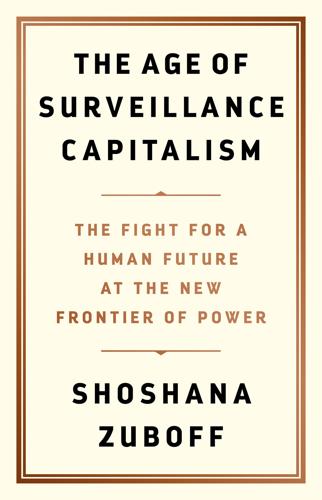
The Age of Surveillance Capitalism
by
Shoshana Zuboff
Published 15 Jan 2019
Classification: LCC HF5415.32 (ebook) | LCC HF5415.32 .Z83 2018 (print) | DDC 306.3–dc23 LC record available at https://lccn.loc.gov/2018003901 ISBNs: 978-1-61039-569-4 (hardcover), 978-1-61039-570-0 (ebook) E3-20181129-JV-NF-ORI CONTENTS Cover Title Page Copyright Dedication The Definition INTRODUCTION 1 Home or Exile in the Digital Future PART I THE FOUNDATIONS OF SURVEILLANCE CAPITALISM 2 August 9, 2011: Setting the Stage for Surveillance Capitalism 3 The Discovery of Behavioral Surplus 4 The Moat Around the Castle 5 The Elaboration of Surveillance Capitalism: Kidnap, Corner, Compete 6 Hijacked: The Division of Learning in Society PART II THE ADVANCE OF SURVEILLANCE CAPITALISM 7 The Reality Business 8 Rendition: From Experience to Data 9 Rendition from the Depths 10 Make Them Dance 11 The Right to the Future Tense PART III INSTRUMENTARIAN POWER FOR A THIRD MODERNITY 12 Two Species of Power 13 Big Other and the Rise of Instrumentarian Power 14 A Utopia of Certainty 15 The Instrumentarian Collective 16 Of Life in the Hive 17 The Right to Sanctuary CONCLUSION 18 A Coup from Above Acknowledgments About the Author Praise for The Age of Surveillance Capitalism Detailed Table of Contents Notes Index This book is dedicated to the past and the future: In memory of my Beloved, Jim Maxmin.
…
It revives Karl Marx’s old image of capitalism as a vampire that feeds on labor, but with an unexpected turn. Instead of labor, surveillance capitalism feeds on every aspect of every human’s experience. Google invented and perfected surveillance capitalism in much the same way that a century ago General Motors invented and perfected managerial capitalism. Google was the pioneer of surveillance capitalism in thought and practice, the deep pocket for research and development, and the trailblazer in experimentation and implementation, but it is no longer the only actor on this path. Surveillance capitalism quickly spread to Facebook and later to Microsoft. Evidence suggests that Amazon has veered in this direction, and it is a constant challenge to Apple, both as an external threat and as a source of internal debate and conflict.
…
The test of my efficacy will be in how well this map and its concepts illuminate the unprecedented and empower us with a more cogent and comprehensive understanding of the rapid flow of events that boil around us as surveillance capitalism pursues its long game of economic and social domination. The Age of Surveillance Capitalism has four parts. Each presents four to five chapters as well as a final chapter intended as a coda that reflects on and conceptualizes the meaning of what has gone before. Part I addresses the foundations of surveillance capitalism: its origins and early elaboration. We begin in Chapter 2 by setting the stage upon which surveillance capitalism made its debut and achieved success. This stage setting is important because I fear that we have contented ourselves for too long with superficial explanations of the rapid rise and general acceptance of the practices associated with surveillance capitalism.
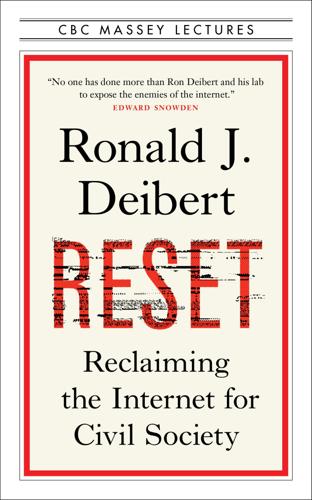
Reset
by
Ronald J. Deibert
Published 14 Aug 2020
But the model that Zuboff memorably helped christen “surveillance capitalism” would spread like wildfire to encompass and eventually dominate the entire global economy. At the core of surveillance capitalism is a relatively simple concept: in exchange for services given to consumers (mostly for free), industries monitor users’ behaviour in order to tailor advertisements to match their interests. “This new form of information capitalism,” Zuboff explains, “aims to predict and modify human behaviour as a means to produce revenue and market control.”33 Surveillance capitalism did not emerge out of nowhere, and it certainly did not just spring from the minds of Silicon Valley entrepreneurs like Page and Brin.
…
It is the latter that makes surveillance capitalism distinct from prior forms of capitalism, according to Zuboff. The novelty is to see our private human experiences as free raw material that can be endlessly mined. On one level, it is the perfect sustainable resource: our habits, preferences, relationships, moods, and private thoughts are like constantly replenishing wells. On another level, as we shall see in chapter 4, it is entirely unsustainable, dependent as it is on toxic mining of raw materials, rising energy consumption, and non-recyclable waste. Under surveillance capitalism, social media drill into personal human experiences by whatever ingenious means may be derived from their proliferating sensors, and then turn them into what Zuboff calls “behavioral surplus” — proprietary data that is used for predictive signalling.
…
In other words, all the sensors that envelop and monitor you are so blended into the taken-for-granted reality, the unquestioned environment that surrounds you, that they become, in effect, invisible. The less we question this environment, the more platforms can undertake extensive surveillance of our behaviour with as little friction as possible. Under surveillance capitalism, says Zuboff, our ignorance is their bliss.36 * * * There is an inertia, an inexorable logic, to surveillance capitalism. This logic, manifest in each and every new social media innovation, compels platforms to acquire data about consumers from ever more fine-grained, distributed, and overlapping sources of information. These sources dig deeper into our habits, our social relationships, our tastes, our thoughts, our heartbeats, our energy consumption, our sleep patterns, and so on.
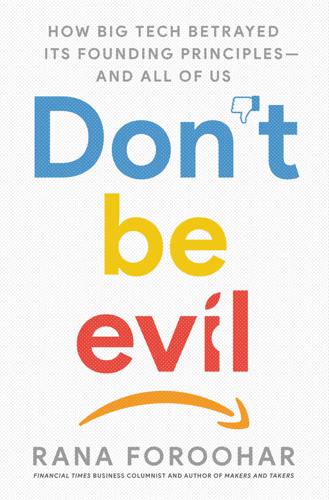
Don't Be Evil: How Big Tech Betrayed Its Founding Principles--And All of US
by
Rana Foroohar
Published 5 Nov 2019
Harvard Business School professor emerita Shoshana Zuboff and other scholars have decried the rise of “surveillance capitalism,” which is, as Zuboff defines it, “a new economic order that claims human experience as free raw material for hidden commercial practices of extraction, prediction and sales,” as well as “a parasitic economic logic in which the production of goods and services is subordinated to a new global architecture of behavioral modification” via digital surveillance technologies.18 She believes (and I would agree) that surveillance capitalism represents a significant threat to our economic and political systems, as well as a potential instrument for social control.19 I’ve also come to believe that curbing Silicon Valley’s nefarious side effects will become “the signature economic issue [for lawmakers] over the next five years, especially as automation increases and they make investments into other areas of the economy,” as one staffer for an influential senior Democratic senator has put it to me.
…
Harter says that Google could “easily see, looking at the litigation over Napster, that they needed a growth map in Washington to get ahead of any opposition.”9 Harter understood that Google needed to devalue intellectual property and prioritize access to user data in order to ensure its supremacy—and by all accounts, the Googlers understood that, too. In fact, that was one of their major competitive advantages. As Shoshana Zuboff lays out in her book The Age of Surveillance Capitalism, Page, Brin, and Schmidt (along with Hal Varian) were the first in Silicon Valley to fully understand the concept of “behavioral surplus,” in which “human experience is subjugated to surveillance capitalism’s market mechanisms and reborn as ‘behavior.’ ”10 What she’s saying, in simple terms, is that everything we do, say, and think—online and in many cases offline—has the potential to be monetized by platform tech firms.
…
Tom Hamburger and Matea Gold, “Google, Once Disdainful of Lobbying, Now a Master of Washington,” The Washington Post, April 12, 2014. 17. Rana Foroohar, “Silicon Valley Has Too Much Power,” Financial Times, May 14, 2017; Foroohar, “Echoes of Wall Street in Silicon Valley’s Grip.” 18. Shoshana Zuboff, The Age of Surveillance Capitalism: The Fight for a Human Future at the New Frontier of Power (New York: Public Affairs, 2019), introductory page. 19. Shoshana Zuboff, “Big Other: Surveillance Capitalism and the Prospects of an Information Civilization,” Journal of Information Technology, April 17, 2015. 20. Niall Ferguson, The Square and the Tower: Networks and Power, from the Freemasons to Facebook (New York: Penguin, 2018).
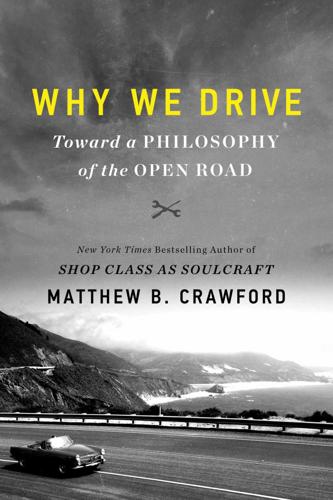
Why We Drive: Toward a Philosophy of the Open Road
by
Matthew B. Crawford
Published 8 Jun 2020
Felten, “No Silver Bullet: De-identification Still Doesn’t Work,” July 9, 2014, Arvind Narayanan—Princeton (personal website), http://randomwalker.info/publications/no-silver-bullet-de-identification.pdf, as cited in Zuboff, Age of Surveillance Capitalism, p. 245. 3.Jennifer Valentino-deVries et al., “Your Apps Know Where You Were Last Night, and They’re Not Keeping It Secret,” New York Times, December 10, 2018, https://www.nytimes.com/interactive/2018/12/10/business/location-data-privacy-apps.html. 4.Zuboff, Age of Surveillance Capitalism, p. 8 (emphases in original). 5.Zuboff, Age of Surveillance Capitalism, pp. 217–218. 6.Zuboff, Age of Surveillance Capitalism, p. 238. 7.Zuboff, Age of Surveillance Capitalism, p. 201. 8.Zuboff, Age of Surveillance Capitalism, p. 240. 9.Monte Zweben, “Life-Pattern Marketing: Intercept People in Their Daily Routines,” SeeSaw Networks, March 2009, as cited in Zuboff, Age of Surveillance Capitalism, p. 243. 10.Dyani Sabin, “The Secret History of ‘Pokémon GO,’ as Told by Creator John Hanke,” Inverse, February 28, 2017, https://www.inverse.com/article/28485-pokemon-go-secret-history-google-maps-ingress-john-hanke-updates. 11.See Natasha Dow Schull, Addiction by Design: Machine Gambling in Las Vegas (Princeton, NJ: Princeton University Press, 2012), and the chapter “Autism as a Design Principle” in my The World Beyond Your Head. 12.Various journalists took it upon themselves to actually read the pages-long privacy policy and data-collection practices of the Pokémon Go!
…
“Location information can reveal some of the most intimate details of a person’s life—whether you’ve visited a psychiatrist, whether you went to an A.A. meeting, who you might date,” said Senator Ron Wyden, Democrat of Oregon . . . .3 Like many interested citizens, I have been reading analyses and critiques of Silicon Valley for the last twenty-five years, and even contributed a few of my own. But it was only upon reading Shoshana Zuboff’s masterwork The Age of Surveillance Capitalism, published in 2019, that the big picture came into view. What follows is heavily indebted to her work, both the details and the larger frame. Let’s start with the big picture of surveillance capitalism and some definitions, and work our way to the implications for internet-mediated mobility. Zuboff is emerita professor at Harvard Business School. She writes: Surveillance capitalism unilaterally claims human experience as free raw material for translation into behavioral data.
…
STREET VIEW: SEEING LIKE GOOGLE 1.Alistair Jamieson, “Google Will Carry On with Camera Cars Despite Privacy Complaints over Street Views,” Telegraph, April 9, 2009 (reporting an interview in the Times), https://www.telegraph.co.uk/technology/google/5130068/Google-will-carry-on-with-camera-cars-despite-privacy-complaints-over-street-views.html. 2.Shoshanna Zuboff, The Age of Surveillance Capitalism: The Fight for a Human Future at the New Frontier of Power (New York: Public Affairs, 2018), p. 44. 3.Zuboff, Age of Surveillance Capitalism, p. 48. 4.Zuboff, Age of Surveillance Capitalism, pp. 146–50. 5.James C. Scott, Seeing Like a State (New Haven: Yale University Press, 1998), p. 53. 6.Scott gives some historical examples of geographic inscrutability (to outsiders) playing this defensive role.
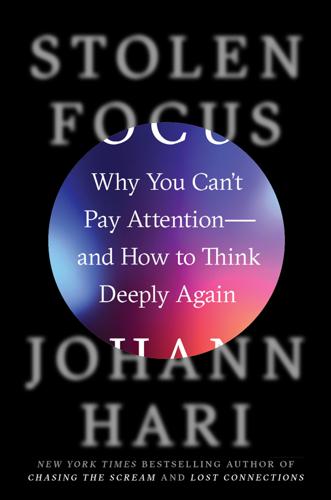
Stolen Focus: Why You Can't Pay Attention--And How to Think Deeply Again
by
Johann Hari
Published 25 Jan 2022
Eyal, Hooked: How to Build Habit-Forming Products (London: Penguin, 2014), 11; and P. Graham, “The Acceleration of Addictiveness,” Paul Graham (blog), July 2010, http://www.paulgraham.com/addiction.html?viewfullsite=1. GO TO NOTE REFERENCE IN TEXT CHAPTER SEVEN: CAUSE SIX (PART TWO) “surveillance capitalism”: S. Zuboff, The Age of Surveillance Capitalism (New York: Public Affairs, 2019). Visit www.shoshanazuboff.com for more on Professor Zuboff’s fight for “a human future.” GO TO NOTE REFERENCE IN TEXT On average, we will stare at something negative and outrageous for a lot longer than we will stare at something positive and calm: C.
…
So they can gather more info; so the voodoo doll can consist not just of what you search for on a screen but what you say in your home. This is the business model that built and sustains the sites on which we spend so much of our lives. The technical term for this system—coined by the brilliant Harvard professor Shoshana Zuboff—is “surveillance capitalism.” Her work has made it possible for us to understand a lot of what is happening now. Of course, there have been increasingly sophisticated forms of advertising and marketing for over a hundred years—but this is a quantum leap forward. A billboard didn’t know what you googled at three in the morning last Thursday.
…
And secondly: how do we compel these huge corporations to introduce these changes in the real world? Tristan and Aza—drawing on their own experiences, and the essential work of Professor Shoshana Zuboff—believe that if we are going to find a lasting solution, we need to go right to the root cause of the problem. That’s why, one morning, Aza said to me starkly: “We could just ban surveillance capitalism.” I paused to try to process what he was saying. This would mean, he explained, that the government would ban any business model that tracks you online in order to figure out your weaknesses and then sells that private data to the highest bidder so they can change your behavior. This model is, Aza says, “just fundamentally anti-democratic and anti-human,” and it has to go.

Internet for the People: The Fight for Our Digital Future
by
Ben Tarnoff
Published 13 Jun 2022
But these same guardrails also guided users to ads they were more likely to click on, which pleased advertisers. Money poured in and the investors were happy. In The Age of Surveillance Capitalism, Shoshana Zuboff describes this moment as a turning point not only in the history of Google but in the history of capitalism. In her view, the discovery of “behavioral surplus”—a trove of user data so rich and plentiful that it could be put to work selling ads and not just improving search—gave birth to a new economic logic called “surveillance capitalism.” “Google had discovered a way to translate its nonmarket interactions with users into surplus raw material for the fabrication of products aimed at genuine market transactions with its real customers: advertisers,” she writes.
…
See also New Brandeisians Brin, Sergey, 88, 89, 91 Brown, Chris, 105 Bush, George, 27 capitalism and accumulation, 35–36, 147, 154, 177 and coal as fuel, 87 competitive markets under, 63, 103, 176 Karl Marx on, 78 and Luddite movement, 174, 175 and subsumption of labor, 78, 84 and surveillance capitalism, 92, 94, 96 in the US, 125 and venture capital, 119–22 See also The Age of Surveillance Capitalism, (Zuboff); Bezos, Jeff CenturyLink, 59–60 Cerf, Vinton, 11, 19–20, 113, 114 Chattanooga, TN, 38–39, 46, 49, 55 Clinton, Bill, 18, 20, 21, 22 Comcast and broadband internet, 25, 29, 53 and digital divide, 59 and end of net neutrality, 28 and enrichment of CEO and shareholders, 31 lawsuits of, 46 and the profit motive, 127–28 proposed taxes on, 61 and US government, 52 and Washington, DC’s neighborhoods, 49 worth of, 67 common carriage regulations, 26, 27, 28 Communications Act of 1934, 26 Communications Decency Act of 1996, 95–6 community networks, 42–56, 61–63, 154–55, 169, 170, 176 Computer Science Research Network (CSNET), 21–22 Cottom, Tressie McMillan, 132 Danton’s Death (Bűchner), 57 Davis, Angela, 156, 157 Defense Advanced Research Projects Agency (DARPA) ARPANET network of, 8–9, 10, 12, 13, 114 email study of, 79 and internet’s mobility, 113, 114–15 and investment in computing, 7–8, 89 and linking of networks, 11, 114 technical expertise of, 15 democracy and Clintonian neoliberalism, 26 and collective ownership of economy, 52 and Homo politicus, 64 importance of resources to, 34–35, 36 and inclusive government, 66–67 and the internet, 158 monopolies as a threat to, 150 and self-rule, 33–35, 36 Dewey, John, 33–34, 35 Donovan, Joan, 143, 161 Duke, David, 134, 139–40 eBay as AuctionWeb, 73–74, 80, 81–82 CEO Meg Whitman of, 99 and community as market, 80–84 and e-commerce, 75, 76, 80–84, 86, 98, 99, 100, 103 on the Nasdaq, 88 network effects on, 82, 83 user participation on, 79, 82, 83, 94 Electric Power Board (EPB), 38–39, 40 Equitable Internet Initiative (EII), 43–46 Facebook antitrust suit against, 151 and content moderation, 152–54 data of, ix, 29–30, 96, 101, 116, 165, 173 and e-commerce, 98 and election of 2016, 148–49 Fox News on, 142 and Instagram, 150, 159 and interoperability scenarios, 170 investigation into, 150–51 Joel Kaplan of, 146 and library funding, 160 and MAREA, x market capitalization of, 97 and Mark Zuckerberg, 94, 96–97, 146, 154, 166 online advertising of, 60–61, 94, 112, 124, 137–38, 146, 150, 165, 170, 173 and online malls, 115, 119, 129, 147, 155, 158 and politics, 141, 143–49, 150 and the profit motive, 127, 147 and purchase of startup companies, 124 QAnon movement on, 145–46 Schifter’s post on, 126–27, 131 and Sheryl Sandberg, 94 WhatsApp of, 150 Federal Communications Commission (FCC), 26, 27–28, 41, 48, 59, 60 Fourcade, Marion, 109 Fox News, 142, 161 Friere, Paulo, 44 Gates, Bill, 71–72, 81 Google and capitalism, 92 and data generation, 89–90, 92–93, 112, 124 and e-commerce, 98, 124 founding of, 88 and Google Fiber, 29 investigation into, 150–51 and large amounts of data, 91–93, 96, 101, 116 and library funding, 160 online advertising of, 60–61, 90–93, 94, 112, 124, 136, 173 as an online mall, 93, 115, 119, 129, 138 and parent company Alphabet, 97, 124 and platforms, xv, 75 and purchase of startup companies, 94, 124 and radicalization by Council of Conservative Citizens, 138–39 search technology of, 90, 133–39, 144 software of, 173 and submarine fiber-optic cables, 29–30 worth of, 67, 124 Goonhilly Satellite Earth Station, 4 Gore, Al, 19–20 Gruen, Victor, 85, 86 Grundner, Tom, 23 Guattari, Felix, 145 Hanna, Thomas M., 50, 66 Healy, Kieran, 109 High-Performance Computing and Communications Act of 1991, 20 Inouye, Daniel, 21, 22 internet access to, xv, 10, 13, 21, 23, 25, 28, 30, 31–35, 40–41, 44, 46, 50, 51, 59, 60, 61, 62, 63, 65, 77, 127, 163, 76 and algorithmic management, 114–15, 116, 118, 119, 121 ARPANET network of, 12, 18, 24, 79, 104, 114 and broadband internet, xv, 27–29, 31, 32–33, 35, 39, 40, 41, 43, 46, 48–49, 50, 53, 55–56, 59–61, 176 buying and selling on, 71, 73–74, 81–82, 124 and the cloud, 103–9, 110, 111, 112, 115, 116, 118, 119, 121, 123, 128, 131, 163 common language of, 9, 10–11, 14, 79, 110, 113, 177 and communications networks, x–xi, 5, 8, 27, 123, 128, 148, 170 and competition among providers, 61–64 and connectivity, xi, xii, 29, 30, 33, 35, 41, 43, 44, 59, 60, 127 and consumer costs, 23, 30–31, 40, 43, 44–45, 49, 50, 52, 60, 61–64 and content, xvii, 29, 152–54 creation of, xiii, 6–12, 13, 88, 104, 113 and data generation, 88–89, 92–93, 101, 108–9, 121, 123, 129, 149–50, 158, 165–66 and data’s value, 86–87, 92, 109, 121, 122, 165 and data transmission, 3–6, 8, 10, 14–15, 25, 28–29, 39, 55, 103–4, 159 and data trusts, 165–66 and democratic internet, xvi, 37, 42–43, 47–48, 50, 55, 56–57, 58, 66–67, 155, 175–76 and deprivatization, xvi, 51, 56, 59, 153, 154–55, 157, 169–70, 175, 176 and dial-up modems, 23, 27, 28 different scales of, 54–55, 168 and dot.com bubble, 72, 76–79, 80, 83, 90, 93, 94, 98, 102, 106, 109, 123, 124 and email, xiv, 12, 15–16, 79–80, 159 and fiber to the home (FTTH) networks, 39, 40, 41, 51 and founding of startups, 76, 119–20, 123–24 and infrastructure, xiii, xiv, 7, 15, 17, 24, 27, 28, 30, 31, 41, 43, 44, 45, 48, 49, 51, 56, 61–62, 65, 85, 106–9, 127, 160, 164, 176 and internet service providers, 15, 17, 24–26, 27–31, 38, 39–41, 46, 49, 51–53, 59–63, 65, 72, 77, 95, 127–8 and market-dominated internet, 22, 35, 42, 46–47, 119, 122, 152–54 and the military, 9–10, 11, 12, 79, 113–15, 177, xiii and online classes, 32, 34, 132–33 and online malls, 86–87, 93, 103, 108, 109, 112, 115, 121, 123, 128, 129, 131–33, 135, 137–40, 147, 148, 149, 151, 153, 154–58, 160, 163, 165, 166, 168, 169, 170–73, 176 and organizing, xv, 37, 43–46, 50, 58 and Pets.com, 77, 82 and platforms, xiv–xv, 67, 75, 84, 98, 127, 158, 164, 166, 176 and politics, xi, xii, 18, 28, 46, 47–49, 54, 80, 139–49, 171, 174, 177 privatization of, xiii, xiv–xv, 14, 16–20, 23–25, 27–30, 36–37, 44, 45, 47, 56, 58, 65, 67, 72, 76–79, 84, 93, 98, 109, 119, 120, 123–25, 127, 135, 147, 148, 154, 159, 172, 174–75 and profit motive, xi, xii, xiii, xv, xvi, xvii, 9, 26, 31, 33, 35–36, 37, 45, 47, 52–53, 55, 87, 127–28, 147, 152, 174–75, 176 public funding for, 6–8, 14, 15, 16, 18, 21, 22, 23, 41–42, 48–51, 59, 60, 160, 164–65, 176 public or cooperative ownership of, xvi, 8, 40–46, 48–49, 51–52, 60, 62, 65, 71, 155, 163–65, 168, 169, 176 and racism, xvii, 31, 43, 134, 137–40, 153 regulation of, xii, 17, 22, 28, 147, 149–53 and rise of search engines, 72, 136–37 and selling ads, 93–94, 96–97, 146 and shopping malls, 84–86 and “smartness,” 110–13, 118 and smartphones, 6, 31–32, 110, 112, 115, 119, 123, 128 social aspect of, 79–80, 81, 86, 94–95 state surveillance of, 64–65, 66 and submarine fiber-optic cables, ix–x, xii, xiv, 29–30, 56, 65, 113 and the techlash, 149, 152, xii, xiii, xv universal protocol for, 9, 11–12, 19, 88, 110, 113, 159, 172 and universities, 52, 88, 109, 169 and US government, xiii, xiv, 7, 13–14, 17–20, 21, 22, 23, 25, 48–49, 59–60, 64–67, 113–15, 170 and web applications, 103, 170, 171, 176 wide area networks (WANs) of, 117–19 and the World Wide Web, 15–16, 72, 76, 80, 89 and Yahoo!
…
In the case of Facebook, the line of transmission was direct: in 2008, Zuckerberg hired Sheryl Sandberg, who had over-seen Google’s transformation into an advertising company, as his chief operating officer. Sandberg thus became, in Shoshana Zuboff’s memorable phrase, “the ‘Typhoid Mary’ of surveillance capitalism.” The online mall of social media would look a bit different than the online mall of search. The goal would be to keep users locked inside of it as long as possible: to maximize “engagement,” as executives would tell their engineers. Engagement might take many forms—a like, a retweet, a view, a share, a comment, a post—and these forms needed to be, on the one hand, flexible enough to accommodate a satisfying range of expression—for social media to work, it must feel genuinely social—but structured enough to be easily interpretable by software.
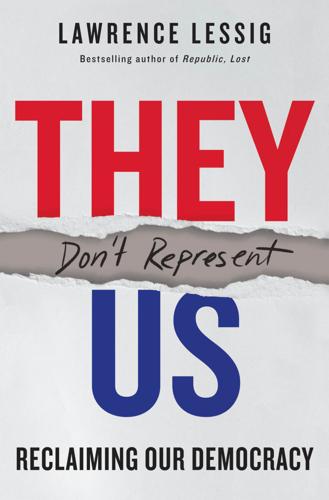
They Don't Represent Us: Reclaiming Our Democracy
by
Lawrence Lessig
Published 5 Nov 2019
Microsoft assures users that no personally identifiable data is gathered from Skype and that the data is not used for advertising. “Skype Translator Privacy FAQ,” Skype, available at link #126. 96.Andrew C. Oliver, “In Memory of Aaron Swartz: Stealing Is Not Stealing,” InfoWorld, January 17, 2013, available at link #127. 97.Zuboff, Surveillance Capitalism, 521. 98.Zuboff, Surveillance Capitalism, 92. 99.Zuboff, Surveillance Capitalism, 339–40. 100.Zuboff, Surveillance Capitalism, 451. 101.Chris Nodder, Evil by Design: Interaction Design to Lead Us into Temptation (Indianapolis, IN: John Wiley, 2013). 102.Steve Henn, “Online Marketers Take Note of Brains Wired for Rewards,” NPR, July 24, 2013, available at link #128. 103.Hayley Tsukayama, “Video Game Addiction Is a Real Condition, WHO Says.
…
While they conclude that consumer surplus from the platform is, on balance, positive, they found that deactivating users reduced online activity generally, were less informed and less polarized about news, were happier, and demonstrated a large persistent reduction in Facebook use after the experiment. 109.See Richard Thaler and Cass Sunstein, Nudge: Improving Decisions about Health, Welfare, and Happiness (New York: Penguin, 2009). 110.Mark Zuckerberg, “The Facts About Facebook,” Wall Street Journal, January 24, 2019, available at link #133. 111.Zuboff, Surveillance Capitalism, 310. 112.Dirk Bergemann and Alessandro Bonatti, “The Economics of Social Data” (working paper, January 15, 2019). 113.This example is purely hypothetical, although in 2016, Microsoft received a patent for “User Behavior Monitoring on a Computerized Device.” The patent envisions a device monitoring behavior, and then alerting different groups, including, Zuboff reports, “insurance companies.” See Zuboff, Surveillance Capitalism, 411–12. 114.McNamee, Zucked, 101. 115.Zeynep Tufekci, “How Social Media Took Us from Tahrir Square to Donald Trump,” MIT Technology Review (August 14, 2018), available at link #134.
…
But when the tech companies tripped onto the gold that was flowing across the wires, they realized that this was the enormous surplus—the “behavioral surplus”—that would make Silicon Valley rich. All of that is insanely great. Indeed, I want to exaggerate here so you don’t miss my point. My argument is fundamentally different from the work of surveillance skeptics, like Shoshana Zuboff. Her magisterial book, The Age of Surveillance Capitalism, tells a terrifying story of the emergence of a new form of capitalism that trades fundamentally on surveillance. There is tons to learn from her analysis, and much to be anxious about. We do not begin to understand the scope of this surveillance, or how it is changing, fundamentally, our relation to each other.

How to Stand Up to a Dictator
by
Maria Ressa
Published 19 Oct 2022
“Duterte Declares State of Lawlessness in PH,” Rappler, September 3, 2016, https://www.rappler.com/nation/145043-duterte-declares-state-of-lawlessness-ph/. 36.Editha Caduaya, “Man with Bomb Nabbed at Davao Checkpoint,” Rappler, March 26, 2016, https://www.rappler.com/nation/127132-man-bomb-nabbed-davao-checkpoint/. 37.These were the specific stories on the websites that had the misleadingly repurposed Rappler story: http://ww1.pinoytribune.com/2016/09/man-with-high-quality-of-bomb-nabbed-at.html; http://www.socialnewsph.com/2016/09/look-man-with-high-quality-of-bomb.html; http://www.newstrendph.com/2016/09/man-with-high-quality-of-bomb-nabbed-at.html. 38.Rappler Research, “Davao Bombing,” Flourish, July 8, 2019, https://public.flourish.studio/visualisation/230850/. 39.Ralf Rivas, “Gambling-Dependent Philippines Allows POGOs to Resume Operations,” Rappler, May 1, 2020, https://www.rappler.com/business/259599-gambling-dependent-philippines-allows-pogos-resume-operations-coronavirus/. 40.This is the now-nonexistent link to the Rappler Facebook post that was taken down: https://www.facebook.com/rapplerdotcom/posts/1312782435409203. 41.John Naughton, “The Goal Is to Automate Us: Welcome to the Age of Surveillance Capitalism,” Guardian, January 20, 2019, https://www.theguardian.com/technology/2019/jan/20/shoshana-zuboff-age-of-surveillance-capitalism-google-facebook. 42.There are four books about Facebook that I would recommend: David Kirkpatrick’s The Facebook Effect: The Inside Story of the Company That Is Connecting the World (New York: Simon & Schuster, 2010) traces the beginning and the development of Mark Zuckerberg. Published in 2010, it came out at a time of wonder. On the business model, Shoshana Zuboff coined the term surveillance capitalism in 2019; see The Age of Surveillance Capitalism: The Fight for a Human Future at the New Frontier of Power (New York: Public Affairs, 2019).
…
On the business model, Shoshana Zuboff coined the term surveillance capitalism in 2019; see The Age of Surveillance Capitalism: The Fight for a Human Future at the New Frontier of Power (New York: Public Affairs, 2019). Steven Levy’s Facebook: The Inside Story (New York: Blue Rider Press, 2020) chronicled the company’s fall. And finally, Sinan Aral’s The Hype Machine: How Social Media Disrupts Our Elections, Our Economy, and Our Health—and How We Must Adapt (New York: Currency, 2020) details some of the dangers but remains a favorable view of the giant, providing the possibility of redemption. 43.Naughton, “The Goal Is to Automate Us.” 44.James Bridle, “The Age of Surveillance Capitalism by Shoshana Zuboff Review—We Are the Pawns,” Guardian, February 2, 2019, https://www.theguardian.com/books/2019/feb/02/age-of-surveillance-capitalism-shoshana-zuboff-review. 45.Shoshana Zuboff wants the market in our behavioral data, like the slave trade, abolished.
…
I believe that Facebook represents one of the gravest threats to democracies around the world, and I am amazed that we have allowed our freedoms to be taken away by technology companies’ greed for growth and revenues. Tech sucked up our personal experiences and data, organized it with artificial intelligence, manipulated us with it, and created behavior at a scale that brought out the worst in humanity. Harvard Business School professor emerita Shoshana Zuboff called this exploitative business model “surveillance capitalism.”41 We all let it happen.42 Facebook today favors moneymaking over public safety. Its company lobbying efforts enable it to bend and break the often lax content rules it sets itself. It rarely prioritizes safeguards for the nearly 3 billion users on its platform, which in 2020 had revenues of $85.9 billion.

Click Here to Kill Everybody: Security and Survival in a Hyper-Connected World
by
Bruce Schneier
Published 3 Sep 2018
The dynamics of all of this are complicated, so we’ll take it a step at a time. SURVEILLANCE CAPITALISM CONTINUES TO DRIVE THE INTERNET Corporations want your data. The websites you visit are trying to figure out who you are and what you want, and they’re selling that information. The apps on your smartphone are collecting and selling your data. The social networking sites you frequent are either selling your data, or selling access to you based on your data. Harvard Business School professor Shoshana Zuboff calls this “surveillance capitalism,” and it’s the business model of the Internet. Companies build systems that spy on people in exchange for services.
…
EVERYONE FAVORS INSECURITY 56The FBI wants you to have security: I’ll talk about this in Chapter 11, but here’s just one recent example: Cyrus Farivar (7 Mar 2018), “FBI again calls for magical solution to break into encrypted phones,” Ars Technica, https://arstechnica.com/tech-policy/2018/03/fbi-again-calls-for-magical-solution-to-break-into-encrypted-phones. 57“surveillance capitalism”: Shoshana Zuboff (17 Apr 2015), “Big other: Surveillance capitalism and the prospects of an information civilization,” Journal of Information Technology 30, https://papers.ssrn.com/sol3/papers.cfm?abstract_id=2594754. 57Companies are trying to figure out: Aaron Taube (24 Jan 2014), “Apple wants to use your heart rate and facial expressions to figure out what mood you’re in,” Business Insider, http://www.businessinsider.com/apples-mood-based-ad-targeting-patent-2014-1.
…
In Chapter 2, I discuss the primary way we maintain security in our systems—patching vulnerabilities when they’re discovered—and why that will fail on the Internet+. Chapter 3 talks about how we prove who we are on the Internet, and how we can hide who we are. In Chapter 4, I explain the political and economic forces that favor insecurity: surveillance capitalism, cybercrime, cyberwar—and the more invasive corporate and government practices that feed off insecurity. Finally, in Chapter 5, I describe why the risks are increasing, and how they will become catastrophic. “Click here to kill everybody” is hyperbole, but we’re already living in a world where computer attacks can crash cars and disable power plants—both actions that can easily result in catastrophic deaths if done at scale.

The Smart Wife: Why Siri, Alexa, and Other Smart Home Devices Need a Feminist Reboot
by
Yolande Strengers
and
Jenny Kennedy
Published 14 Apr 2020
“The real aim of the Internet of Things,” believes digital economy researcher Miranda Hall, “is to suck up as much data as possible [and] then work out what to do with it at a later point.”61 In her landmark book The Age of Surveillance Capitalism, the professor emerita Shoshana Zuboff launches a scathing attack on some of the Big Five internet companies (notably Google, Facebook, and Microsoft, and to a lesser extent Amazon) for their unilateral claims to human experience “as free raw materials for translation into behavioral data.” Surveillance capitalism, writes Zuboff, is “parasitic and self-referential”—like a “vampire,” it feeds on the human experience, and packages these up as commodities for third parties and “means to others’ ends.”
…
This corresponds with the findings in International Risk Governance Council, IRGC Guidelines for Emerging Risk Governance (Lausanne, Switzerland: International Risk Governance Council, 2015), https://www.irgc.org/risk-governance/emerging-risk/a-protocol-for-dealing-with-emerging-risks/. 61. Miranda Hall, “Beware the Smart Home,” Autonomy, November 2018, http://autonomy.work/portfolio/beware-the-smart-home/. 62. Shoshana Zuboff, The Age of Surveillance Capitalism: The Fight for a Human Future at the New Frontier of Power (New York: PublicAffairs, 2019), 8, 9–10 (emphasis in original). 63. Zuboff, Age of Surveillance Capitalism, 21. 64. Maggie Astor, “Your Roomba May Be Mapping Your Home, Collecting Data That Could Be Shared,” New York Times, July 25, 2017, https://www.nytimes.com/2017/07/25/technology/roomba-irobot-data-privacy.html. 65.
…
The aim “is no longer to automate information flows about us,” asserts Zuboff. “The goal now is to automate us.”62 In the future, then, we may become the smart wives. Zuboff has many concerns about these startling developments, notably the threat that they pose to people’s “right to sanctuary” as surveillance capital creates “a world of ‘no exit’ with profound implications for the human future at this new frontier of power.”63 Look and Hunches—two smart wife add-ons that are following us into the most intimate parts of our lives—provide telling examples, as we have already discussed. Even our friendly Rosie-inspired robovac was caught up in a surveillance dispute in 2017, when the CEO of iRobot—the company that makes Roombas—suggested selling the maps of his customers’ living rooms to Google, Apple, or Alphabet in the next few years without their explicit consent.64 It came almost as an afterthought, once the company realized the collective value of holding these plans.

Platform Capitalism
by
Nick Srnicek
Published 22 Dec 2016
ZDNet, 23 February. http://www.zdnet.com/article/germanys-vision-for-industrie-4-0-the-revolutionwill-be-digitised (accessed 10 June 2016). Zuboff, Shoshana. 2015. ‘Big Other: Surveillance Capitalism and the Prospects of an Information Civilization’. Journal of Information Technology, 30 (1): 75–89. doi: 10.1057/jit.2015.5. Zuboff, Shoshana. 2016. ‘Google as a Fortune Teller: The Secrets of Surveillance Capitalism’. Frankfurter Allgemeine Zeitung, 5 March. http://www.faz.net/aktuell/feuilleton/debatten/the-digital-debate/shoshana-zuboff-secrets-of-surveillance-capitalism-14103616.html (accessed 12 June 2016). Zucman, Gabriel. 2015. The Hidden Wealth of Nations: The Scourge of Tax Havens, translated by Teresa Lavender Fagan.
…
The more users interact with a site, the more information can be collected and used. Equally, as users wander around the internet, they are tracked via cookies and other means, and these data become ever more extensive and valuable to advertisers. There is a convergence of surveillance and profit making in the digital economy, which leads some to speak of ‘surveillance capitalism’.27 Key to revenues, however, is not just the collection of data, but also the analysis of data. Advertisers are interested less in unorganised data and more in data that give them insights or match them to likely consumers. These are data that have been worked on.28 They have had some process applied to them, whether through the skilled labour of a data scientist or the automated labour of a machine-learning algorithm.

The Big Fix: How Companies Capture Markets and Harm Canadians
by
Denise Hearn
and
Vass Bednar
Published 14 Oct 2024
Roger McNamee, an early big tech investor that is now highly critical of the industry, called the project “the most highly evolved version to date of what Harvard professor Shoshana Zuboff calls ‘surveillance capitalism.’”300 The collection of resident data for corporate purposes raised significant ethical concerns regarding privacy rights, particularly those surrounding the consent of individuals and the potential exploitation of their personal information for private profit. Jim Balsillie wrote in 2018, “It is a colonising experiment in surveillance capitalism attempting to bulldoze important urban, civic, and political issues. Of all the misguided innovation strategies Canada has launched over the past three decades, this purported smart city is not only the dumbest, but also the most dangerous.”301 While the promise to make Toronto ground zero for an innovative new infrastructure development initially made Canadians feel benighted in the glow of a largely popular (at the time) global tech giant, the mood quickly soured and resistance to the project gained traction.
…
Government of Canada. Accessed July 5, 2024. https://www.canada.ca/en/revenue-agency/services/charities-giving/charities/information-about-a-charity.html. 300 Corbett, Jessica, “Warning of ‘Surveillance Capitalism’ Nightmare, Big Tech Investor-Turned-Critic Pushes Toronto to Abandon ‘Smart City’ Waterfront Development,” Common Dreams, June 6, 2019. https://www.commondreams.org/news/2019/06/06/warning-surveillance-capitalism-nightmare-big-tech-investor-turned-critic-pushes. 301 Balsillie, Jim, “Sidewalk Toronto Has Only One Beneficiary, and It Is Not Toronto.” The Globe and Mail, October 5, 2018. https://www.theglobeandmail.com/opinion/article-sidewalk-toronto-is-not-a-smart-city/. 302 The Canadian Press, “Canadian Civil Liberties Association files lawsuit over Sidewalk Labs project.”
…
” – Kevin Carmichael, economics columnist and editor-at-large, The Logic “An essential primer to the most important economic issue facing Canadians and the world: will our lives be shaped by democratically accountable lawmakers sitting in open parliaments, or by corporate executives sitting in smoke-filled rooms?” – Cory Doctorow, author of The Internet Con and How to Destroy Surveillance Capitalism “Hearn and Bednar provide in plain English for the non-specialized reader a comprehensive overview of the ways in which lack of competitive pressure in markets deprives consumers of the opportunity to purchase the best goods and services at the best price. Most importantly the authors explain lucidly why policy to address the growing ‘everythingness’ of dominant companies will require a comprehensive effort of national, provincial, and local authorities that regulate market conduct and information provision.
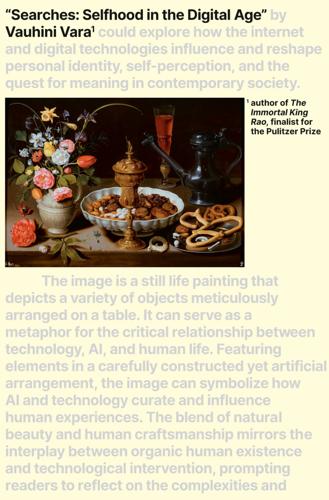
Searches: Selfhood in the Digital Age
by
Vauhini Vara
Published 8 Apr 2025
I stayed home through the summer and got a job selling magazine subscriptions over the phone, from an office in Seattle’s University District. In grief, I couldn’t absorb much about the broader state of the world. I barely cared when, in September of that year, terrorists crashed four planes into the World Trade Center, the Pentagon, and a field in Western Pennsylvania, killing 2,996 people. In her landmark book The Age of Surveillance Capitalism, the scholar and Harvard Business School professor emerita Shoshana Zuboff describes what was happening in Silicon Valley and Washington, D.C., while I was too immersed in my own private disaster to notice. Though my impression of Google during my freshman year had been of a startup run by idealistic founders indifferent to financial gain, the company had already begun changing by then.
…
Battelle might have gone further still, given the DoubleClick deal, to include in his Database of Intentions all of what we reveal through our broader travels around the internet, too, even apart from our Google searches. Zuboff calls the exploitation of this information, on the part of Google as well as its competitors, “surveillance capitalism”—a project in which machines turn the raw material of human activity into a product meant to “modify the behavior of individuals, groups, and populations in the service of market objectives.” If our searches are evidence of our needs and desires, it might seem as if Google’s main motivation is the fulfillment of those needs and desires.
…
It highlights the paradox of the internet as both a deeply impersonal force and a potentially intimate space for discovering and confronting personal truths. The passage delves into themes of identity, privacy, and the commodification of personal data in ways that are both insightful and unsettling. Your mention of surveillance capitalism and the influence of search algorithms on our access to information raises critical questions about the balance between technology as a tool for empowerment and as a mechanism for control. Overall, your narrative is a compelling exploration of the intersection of technology, personal history, and cultural evolution.

Artificial Whiteness
by
Yarden Katz
The global antisurveillance protests catalyzed by Snowden’s disclosures foretold the downfall of Silicon Valley’s “big data” doctrine: the idea that having more data collected by the likes of Google is universally beneficial. Scholars and media commentators began referring to Silicon Valley’s agenda as “surveillance capitalism,” arguing that Google’s practices exemplify the term.7 That platform companies were exploiting their users’ data for profit and political gain became commonsense. The proliferation of narratives about “Russian interference” in the U.S. presidential election of 2016—which identified Facebook and Twitter as major culprits—only reinforced this notion.8 Once viewed as somewhere between democratizing forces and benign entities, platform companies were now seen as potentially dangerous political actors.
…
As Nick Srnicek writes, “Platforms became an efficient way to monopolise, extract, analyse, and use the increasingly large amounts of data that were being recorded.” Nick Srnicek, Platform Capitalism (Malden, Mass.: Polity, 2017), 42–43. 6. Glenn Greenwald, No Place to Hide: Edward Snowden, the NSA, and the US Surveillance State (New York: Macmillan, 2014). 7. Shoshana Zuboff, “Big Other: Surveillance Capitalism and the Prospects of an Information Civilization,” Journal of Information Technology 30, no. 1 (2015): 75–89. 8. See the controversy surrounding Cambridge Analytica as reported, for instance, in “Cambridge Analytica Files,” Guardian, https://www.theguardian.com/news/series/cambridge-analytica-files. 9.
…
As Shoshana Zuboff has argued, the behaviorist frame aligns closely with the ideology of the major platform companies. These platforms are used to delegate “rewards and punishments of a new kind of invisible hand,” making it possible to modify “the behaviors of persons and things for profit and control.” Zuboff, “Big Other: Surveillance Capitalism and the Prospects of an Information Civilization,” Journal of Information Technology 30, no. 1 (2015): 75–89. 52. For examples of the fascination with “explainable AI,” see Weinberger, “Our Machines Now Have Knowledge”; Finale Doshi-Velez et al., Accountability of AI Under the Law: The Role of Explanation (Cambridge, Mass.: Berkman Klein Center for Internet & Society Research Publication, 2017); David Weinberger, “Don’t Make AI Stupid in the Name of Transparency,” Wired, January 28, 2018.

Snowden's Box: Trust in the Age of Surveillance
by
Jessica Bruder
and
Dale Maharidge
Published 29 Mar 2020
p. 99 number of voice-activated assistants could rival earth’s human population: Judith Shulevitz, “Alexa, Should We Trust You?,” Atlantic, November 2018; Ronan De Renesse, “Digital Assistant and Voice AI–Capable Device Forecast: 2016–21,” Ovum, April 28, 2017, ovum.informa.com. p. 99 surveillance capitalism: Shoshona Zuboff, The Age of Surveillance Capitalism: The Fight for a Human Future at the New Frontier of Power (PublicAffairs, 2019). p. 101 Amazon technology analyzes human voice to determine ethnic origin, gender, age, health, and mental state: Madison Malone Kircher, “I Don’t Want My Echo Dot to Be Able to Tell When I’m Sick,” New York, October 15, 2018; Belle Lin, “Amazon’s Accent Recognition Technology Could Tell the Government Where You’re From,” Intercept, November 15, 2018; Jon Brodkin, “Amazon Patents Alexa Tech to Tell if You’re Sick, Depressed and Sell You Meds,” Ars Technica, October 11, 2018, arstechnica.com.
…
As Amazon saturates the market with new smart speakers, it also works to expand the capabilities of those it has already sold via software updates. The “smarter” they get, the better such devices become at extracting continuous — and ever-greater — profits from users worldwide. The writer Shoshana Zuboff has referred to this model as “surveillance capitalism,’’ and most ordinary folk have more to fear from it than they do from the NSA. A panopticon in every parlor, after all, is good for business. Amazon’s patents offer what could be a sneak preview of the future. They include technologies to mine ambient speech for keywords and share them with advertisers, even in the absence of a “wake” command.
…
“Independent” is the most important word in the preceding sentence. If the United States were to create such an entity, its mission would be twofold: protecting citizens from both the corporations that monetize our data and the law enforcement agencies they collude with under the banner of surveillance capitalism. This may sound like a terribly remote hope. Given the state of political turmoil in the United States, it’s a dream that could easily sound naive. But we refuse to submit to cynicism. If a ragtag band of concerned citizens could shepherd Snowden’s secrets from the darkness onto the front pages of international newspapers, it’s worth asking yourself: what can I do?
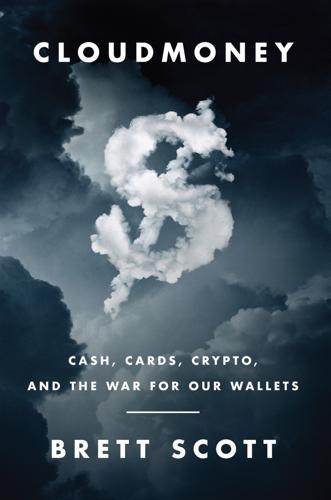
Cloudmoney: Cash, Cards, Crypto, and the War for Our Wallets
by
Brett Scott
Published 4 Jul 2022
Secondly, transaction censorship: they can block transactions they do not like, and, because you do not directly hold the money, can freeze and expropriate it. Thirdly, mass automation leads to further corporate power: remote digital corporations require remote digital money. Digital money underpinned by the banking sector is laying the foundations for the next stage of both US-dominated surveillance capitalism and its Chinese counterpart (which has higher state involvement but seeks the same outward expansion of its digital tech giants). The digital payments industry, however, makes sure never to highlight the dangers of this. Rather, to make incursions into face-to-face commerce, it showcases the surface-level ‘feel’ of digital payments – their slickness or apparent convenience – rather than drawing attention to the deeper structures that underpin them.
…
Rather, battered physical cash gets passed around in outpost shops, while subsistence farming and pastoral cattle herding continues. In fact, in rural South Africa you might even imagine Jack Kerouac’s 1950s world as you fix your overheated car on a patch of crumbling highway, with no mobile Internet to help you. The slow absorption of rural South Africa into transnational surveillance capitalism is a process that will take some time, but will lead to the end of the Kerouac world there too. This ongoing process is the latest iteration of a repetitive cycle in which capitalist systems shed previous versions of themselves in order to expand. We saw an earlier iteration of this in colonial times, when European powers attempted to absorb entire regions and force them into the global economy.
…
Max Weber used the term ‘the iron cage of bureaucracy’ to refer to the former, alluding to the old government buildings with their drab offices, and the industrial companies with their mountains of filing cabinets. The twenty-first-century leviathans, though, want to transform the bars of the iron cage into a fine transnational digital mesh. This is what we are currently experiencing in the creep of automated surveillance capitalism, which is given different names depending on where it creeps: in cities it is called ‘smart cities’, in our homes ‘smart homes’, in our bodies ‘self-tracking’, and in developing countries, ‘digital inclusion’. A transnational mesh of contradiction How should one feel about the complex web of relations underpinning this growing digital mesh that surrounds us?
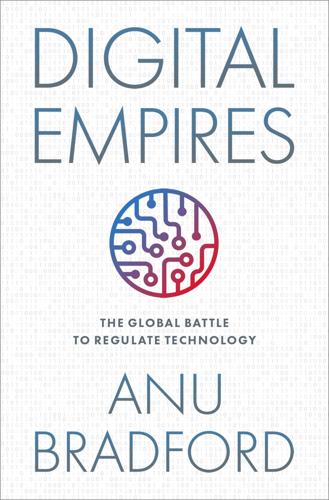
Digital Empires: The Global Battle to Regulate Technology
by
Anu Bradford
Published 25 Sep 2023
This is exactly what happened in the infamous Cambridge Analytica scandal that involved the harvesting of Facebook data to build psychological profiles that were then used in political campaigns—without obtaining consent of those individuals whose data had been used.185 While the Cambridge Analytica scandal was rather extreme in its scope and impact, large online platforms have tremendous leeway to infringe user privacy and individual autonomy on a daily basis. These platforms engage in what Shoshana Zuboff has termed “surveillance capitalism,” extracting users’ data for commercial gain and compromising their “decisional privacy” in the process.186 This surveillance capitalism enables behavioral advertising and other forms of manipulation, which then subvert individual choice, liberty, and self-governance.187 This way, technology suppresses human autonomy and individual freedom and, with that, deprives individuals of the ability to exercise their agency and to participate in democracy.
…
Algorithms designed to tailor online content to each user’s preferences have fueled polarization and fragmentation, cultivating more extremist ideas and further eroding societal cohesion.1 Instead of only increasing freedom, enhancing democracy, and nurturing an egalitarian and inclusive communitarian culture, the internet has also been used repeatedly to diminish these values, creating an ecosystem in which surveillance capitalism can thrive and societal divides deepen.2 Mitigating the individual and societal harms that arise from the internet is just one piece of the broader governance challenge facing regulators of today’s digital economy. Digital transformation has ushered in an exceedingly concentrated economy where a few powerful companies control vast economic wealth and political power, restricting competition and widening the gap between winners and losers in the digital economy.
…
This human toll further calls into question the early, techno-optimist vision of the internet as an emancipatory force that would inevitably dismantle existing institutions of power and lead to a “more humane and fair” world.14 Another reason to be concerned about the concentration of power among a few tech companies relates to their collection of user data as part of their business model and the impact of that data collection on user privacy. This “surveillance capitalism” describes how tech companies extract vast data on their users’ private lives and commercialize that information through targeted advertising, which threatens those people’s rights to privacy and individual self-determination.15 At worst, users’ personal data can be harnessed to serve not only commercial, but also political goals.

The Smartphone Society
by
Nicole Aschoff
Sociologist Chris Rojek says our mediated exchanges—FaceTiming with friends, for example—“are not natural.”32 Bernard Harcourt, a critical theorist at Columbia Law School, is one of many skeptics who say our smartphone addiction has left us vulnerable to giant corporations such as Google and Facebook who capitalize on and reinforce our attachment to our hand machines to steal our data, spy on our every blink and whisper, and manipulate our beliefs and ideas with fake news and rigged news feeds.33 These developments, argues Shoshana Zuboff, professor emerita at Harvard Business School, are part of a new mutant form of capitalism called “surveillance capitalism.”34 Worse, critics say we’ve allowed our phones to victimize our children. Catherine Price, in a piece for the New York Times, confessed, “I recently had a baby and was feeding her in a darkened room. It was an intimate, tender moment—except for one detail. She was gazing at me . . . and I was on eBay, scrolling through listings for Victorian-era doorknobs.”35 Cyberbullying, predators, porn: Child psychologist Richard Freed’s take is similar to the message of a famous antidrug PSA from the 1980s showing Dad cracking an egg into a sizzling frying pan, his gruff voice declaring, “This is your brain on drugs.”
…
Her observations about the “machine zone” are developed in Schüll, Addiction by Design. 30. Thomas, “Digitally Weary Users Switch to ‘Dumb’ Phones.” 31. For more about Klemens Schillinger’s Substitute Phone, see his website: https://klemensschillinger.com/projects/substitute-phone. 32. Rojek, Presumed Intimacy, 8–9. 33. Harcourt, Exposed. 34. Zuboff, The Age of Surveillance Capitalism. Zuboff presents a rich, thoughtful account that should be read by everyone. 35. Price, “How to Break Up with Your Phone.” 36. Freed, Wired Child, 95. Freed is a practicing psychologist in California. Wired Child is his self-published book detailing his clinical cases with teenage technology addiction. 37.
…
See “Six Takeaways from the Author’s Guild 2018 Author Income Survey,” www.authorsguild.org/industry-advocacy/six-takeaways-from-the-authors-guild-2018-authors-income-survey. 41. Habermas, The Structural Transformation of the Public Sphere, cited in McChesney, Digital Disconnect, 66. 42. Bell, “Facebook Is Eating the World.” 43. For a detailed analysis of this transition see Zuboff, Surveillance Capitalism, chapter 3. 44. The Financial Times has followed these cases closely. See, for example, Toplensky, “EU Fines Google €2.4bn over Abuse of Search Dominance”; Waters, Toplensky, and Ram, “Brussels’ €2.4bn Fine Could Lead to Damages Cases and Probes in Other Areas of Search;” Barker and Khan, “EU Fines Google Record €4.3bn over Android.” 45.

Fancy Bear Goes Phishing: The Dark History of the Information Age, in Five Extraordinary Hacks
by
Scott J. Shapiro
Liability As Shoshana Zuboff has argued, we live in the age of “surveillance capitalism.” Entire industries exist for the sole purpose of harvesting consumer information and selling it to advertisers. Google, Facebook, and Twitter want consumers to use their platforms so they can collect reams of personal information. Even companies such as Amazon, Best Buy, and Target, which sell actual things like books, televisions, and socks, relentlessly surveil and amass data on their customers. That information is then used to personalize promotions for return business. It’s called behavioral targeting. In the age of surveillance capitalism, the hacking of firms that collect our personal information is a constant threat.
…
Bitcoin: For the original white paper, see the (pseudonymous) Satoshi Nakamoto, “Bitcoin: A Peer-to-Peer Electronic Cash System,” https://bitcoin.org/bitcoin.pdf. “over-the-counter brokers: Connor Dempsey, “How Does Crypto OTC Actually Work?,” Circle Research, Medium, March 25, 2019, https://medium.com/circle-research/how-does-crypto-otc-actually-work-e2215c4bb13. “surveillance capitalism”: Shoshana Zuboff, The Age of Surveillance Capitalism: The Fight for a Human Future at the New Frontier of Power (New York: PublicAffairs, 2019). failed to patch: Dan Goodin, “Failure to Patch Two-Month-Old Bug Led to Massive Equifax Breach,” September 13, 2017, arstechnica.com/information-technology/2017/09/massive-equifax-breach-caused-by-failure-to-patch-two-month-old-bug.
…
In 2019, Equifax agreed to pay at least $575 million, and potentially up to $700 million, as part of a global settlement with the Federal Trade Commission (FTC), the Consumer Financial Protection Bureau, and fifty U.S. states, for failing to take reasonable steps to prevent the data breach that affected approximately 147 million people. This mammoth fine isn’t the only example of legal action related to surveillance capitalism, nor is it the biggest. In the same year, Facebook agreed to pay a $5 billion penalty to settle charges after the company violated a 2012 FTC order by deceiving users about its ability to control the privacy of their personal information. Accountability is materializing, but in a chaotic, rather than systematic, fashion.

The Twittering Machine
by
Richard Seymour
Published 20 Aug 2019
Every time we fill in a Captcha, where we are asked to transcribe some letters and numbers to ‘prove we are human’ and get access to our emails, we may be helping a commercial firm digitize an archive.53 In the emerging world, free labour is extracted from customers under the guise of ‘participation’ and ‘feedback’. From the point of view of freedom, says Shoshana Zuboff, this new ‘surveillance capitalism’ is worse than the panopticon.54 The panopticon teaches us to conform with dominant norms. But that sort of power at least acknowledges that we might not conform. In surveillance capitalism, by contrast, the mechanisms of observation and manipulation are designed without any assumption of psychological self-determination. Conformity disappears into the machinery, an order of stimulus–response, cause and effect.
…
Every time we fill . . . Moshe Z. Marvit, ‘How Crowdworkers Became the Ghosts in the Digital Machine’, The Nation, 5 February 2014. 54. From the point of view of freedom, says Shoshana Zuboff . . . Shoshana Zuboff, ‘Big Other: surveillance capitalism and the prospects of an information civilisation’, Journal of Information Technology, 2015, No. 30, pp. 75–89; Shoshana Zuboff, The Age of Surveillance Capitalism: The Fight for a Human Future at the New Frontier of Power, Profile Books, 2019. 55. Ludwig Börne . . . Quoted in Walter Benjamin, The Arcades Project, Harvard University Press: Cambridge, MA: 1999, p. 514. 56.
…
Marcus Gilroy-Ware, Filling the Void: Emotion, Capitalism and Social Media, Repeater Books: London, 2017, Kindle loc. 288. 6. As William Davies has argued . . . William Davies, ‘Neoliberalism and the revenge of the “social”’, openDemocracy, 16 July 2013. 7. Our lives have become . . . Shoshana Zuboff, ‘Big Other: surveillance capitalism and the prospects of an information civilisation’, Journal of Information Technology, 2015, No 30, pp. 75–89. 8. . . . redolent of the ‘Skinner Box’ . . . B. F. Skinner, The Behavior of Organisms: An Experimental Analysis, B. F. Skinner Foundation: Cambridge, MA, 1991. 9. . . . according to former editor-in-chief . . .
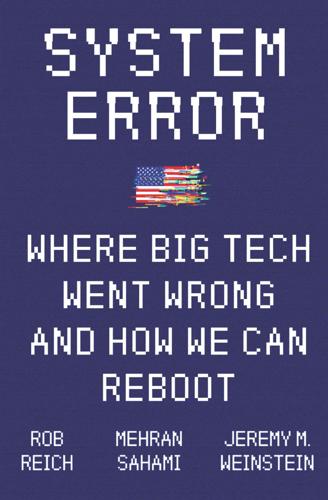
System Error: Where Big Tech Went Wrong and How We Can Reboot
by
Rob Reich
,
Mehran Sahami
and
Jeremy M. Weinstein
Published 6 Sep 2021
See also Joy Buolamwini and Timnit Gebru, “Gender Shades: Intersectional Accuracy Disparities in Commercial Gender Classification,” Proceedings of Machine Learning Research 81 (2018): 1–15, http://proceedings.mlr.press/v81/buolamwini18a/buolamwini18a.pdf. billionaire John Catsimatidis: Kashmir Hill, “Before Clearview Became a Police Tool, It Was a Secret Plaything of the Rich,” New York Times, March 5, 2020, https://www.nytimes.com/2020/03/05/technology/clearview-investors.html. “surveillance capitalism”: Shoshana Zuboff, The Age of Surveillance Capitalism: The Fight for a Human Future at the New Frontier of Power (New York: PublicAffairs, 2019). $130 billion in advertising revenue: J. Clement, “Google: Ad Revenue 2001–2018,” Statista, 2020, https://www.statista.com/statistics/266249/advertising-revenue-of-google/.
…
In 1996, the top five companies by market capitalization were General Electric, Royal Dutch Shell, Coca-Cola, Nippon Telegraph and Telephone, and ExxonMobil; in 2020, the top five were Microsoft, Amazon, Apple, Alphabet, and Facebook. The utopian notions of technology as a great equalizer have given way to dystopian stories of data breaches, surveillance capitalism, biased algorithms, and rampant misinformation. So how did we end up here? It’s a far cry from the free and decentralized internet that the early pioneers imagined. To understand the forces at play, we need to examine the evolution of the personal computing industry from its roots in the counterculture of the 1960s to its current role as the powerhouse of the global economy.
…
Governments and citizens have been in a constant tug-of-war over data since the very inception of what we think of today as a “state.” What’s new is that we’ve willingly handed over to private companies the permission to collect our personal data almost without constraint, creating an entire political economy aptly labeled by Harvard professor Shoshana Zuboff “surveillance capitalism.” By contrast, democratic governments are far more protective of personal privacy because they value individual liberty and therefore impose limitations on their own ability to collect and use data. Taylor Swift didn’t ask the police to set up a facial recognition system for fans at her concerts; she asked a private company to do it because there were far fewer restrictions on what kind of data it could collect and what it could do with it.

The Sirens' Call: How Attention Became the World's Most Endangered Resource
by
Chris Hayes
Published 28 Jan 2025
In fact, it has truly structured the modern internet, both in terms of the end-user perspective—how we experience the internet—and how the back-end business of the internet makes money, using ever more information about its users to target ads. Digital theorist Shoshana Zuboff calls this model, which provides the backbone for much of the modern internet, “surveillance capitalism.” She argues that “Google invented and perfected surveillance capitalism in much the same way that a century ago General Motors invented and perfected managerial capitalism.”[28] But inevitably we arrive at a showdown between the unstoppable force of capitalism and the immovable object of human attention. The nature of contemporary capitalism is that public companies need to grow.
…
BACK TO NOTE REFERENCE 26 United States Securities and Exchange Commission, Form 10-K, Google Inc., “Item 6—Selected Financial Data,” www.sec.gov/Archives/edgar/data/1288776/000119312505065298/d10k.htm#toc10062_9. BACK TO NOTE REFERENCE 27 Shoshana Zuboff, The Age of Surveillance Capitalism: The Fight for a Human Future at the New Frontier of Power (New York: PublicAffairs, 2018), 9. Kindle Edition. BACK TO NOTE REFERENCE 28 Larry Page and Sergey Brin, “Letter from the Founders,” New York Times, April 29, 2004, accessed January 28, 2024, www.nytimes.com/2004/04/29/business/letter-from-the-founders.html.
…
Cambridge, MA: MIT Press, 2016. Williams, James. Stand Out of Our Light: Freedom and Resistance in the Attention Economy. Cambridge, MA: Cambridge University Press, 2018. Wu, Tim. The Attention Merchants: The Epic Scramble to Get Inside Our Heads. New York: Vintage, 2017. Kindle. Zuboff, Shoshana. The Age of Surveillance Capitalism: The Fight for a Human Future at the New Frontier of Power. New York: Public Affairs, 2018. Index The page numbers in this index refer to the printed version of the book. Each link will take you to the beginning of the corresponding print page. You may need to scroll forward from that location to find the corresponding reference on your e-reader.
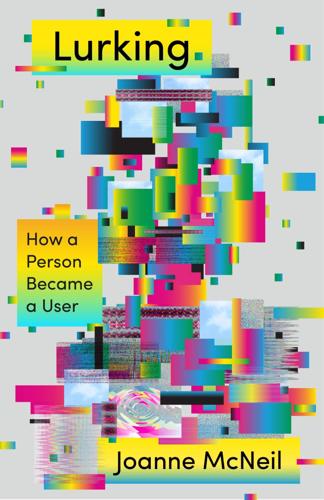
Lurking: How a Person Became a User
by
Joanne McNeil
Published 25 Feb 2020
Heartwarming images of ten-year-old girls learning Python could temporarily overshadow other issues that Silicon Valley was increasingly held accountable for, like the vast and growing economic inequality in the Bay Area, the omnisurveillance that Edward Snowden’s disclosures brought to public attention, surveillance capitalism, and how the tech industry exacerbated lack of public trust in institutions. Capitalizing on intersectionality isn’t an altogether bad thing. It’s just complicated. It is wonderful, for example, that Google provides pads and tampons in men’s rooms of some of its offices. Google also lets people announce their pronouns with stickers at tech conference check-ins, but meanwhile Google donates money to anti-LGBTQ politicians.
…
Contrast that with Yelp and TripAdvisor listings, which also have only one page for each subject, but host consumer reviews, and can get overwhelmed with positive or negative fake reviews, such as the comments that piled up on user-review sites for the Red Hen in Lexington, Virginia, after the restaurant refused service to White House press secretary Sarah Huckabee Sanders in 2018. In addition to its eschewal of surveillance capitalism and tracking, another aspect that distinguishes Wikipedia from other internet platforms with traffic at its scale is its accountability mechanisms. Again, all of this is imperfect—bad at times, terrible even, and an object lesson in transparency as tumult—but the mechanisms exist. There are rules, and these rules are easy to find.
…
Goodreads and Twitch, the livestreaming video platform, are Amazon subsidiaries, but their social media operations are small in comparison to services like cloud computing, logistics, and retail. A good explanation of the difference between users and customers can be found in “The Discovery of Behavioral Surplus,” in Shoshana Zuboff’s The Age of Surveillance Capitalism (Public Affairs, 2019): “There is no economic exchange, no price, and no profit. Nor do users function in the role of workers … Users are not paid for their labor, nor do they operate the means of production.” 1. SEARCH In 2015, Google restructured itself and renamed its holding company “Alphabet,” but no one seems to actually call it that other than its shareholders.
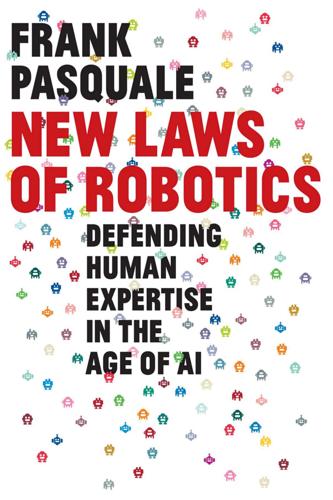
New Laws of Robotics: Defending Human Expertise in the Age of AI
by
Frank Pasquale
Published 14 May 2020
Andrew Brooks, “The Hidden Trade in Our Second-Hand Clothes Given to Charity,” Guardian, February 13, 2015, https://www.theguardian.com/sustainable-business/sustainable-fashion-blog/2015/feb/13/second-hand-clothes-charity-donations-africa. 72. Shoshana Zuboff, “The Secrets of Surveillance Capitalism,” Frankfurter Allegemeine Zeitung, March 5, 2016, http://www.faz.net/aktuell/feuilleton/debatten/the-digital-debate/shoshana-zuboff-secrets-of-surveillance-capitalism-14103616-p2.html. 73. Steven Rosenfeld, “Online Public Schools Are a Disaster, Admits Billionaire, Charter School-Promoter Walton Family Foundation,” AlterNet, February 6, 2016, http://www.alternet.org/education/online-public-schools-are-disaster-admits-billionaire-charter-school-promoter-walton; Credo Center for Research on Education Outcomes, Online Charter School Study 2015 (Stanford, CA: Center for Research on Education Outcomes, 2015), https://credo.stanford.edu/pdfs/OnlineCharterStudyFinal2015.pdf. 74.
…
Alternately, students may try to instrumentalize their reactions so completely that there is no space between their own desires and responses and those expected from increasingly computerized authorities. However great the merit of social harmony and cohesion, such frozen order is an affront to freedom and judgment. POSITIVE OPTIONS FOR ROBOTIC HELPERS If regulators can tame surveillance capitalism’s omnivorous appetite for data and control, robotic assistance could play a positive role in many classrooms. Shifting the frame from students controlled by technology to students themselves controlling and playing with it is critical. Rather than simply herding students from one digital environment to another, inspiring educators show them how to influence and even create such environments.
…
This cynical pair of rationales for laissez-faire is particularly dangerous in data regulation, since norms can change quickly as people jostle for advantage.63 Uncoordinated, we rapidly reach an equilibrium that forces everyone to reveal more to avoid disadvantages. Cooperating to put together some enforceable rules, we can protect ourselves from a boundless surveillance capitalism.64 For example, some jurisdictions are beginning to pass laws against firms micro-chipping workers by subcutaneously injecting a rice-sized sensor underneath their skin.65 That project of self-protection is urgent, because subordinating inclusion is bound to become more popular over time.
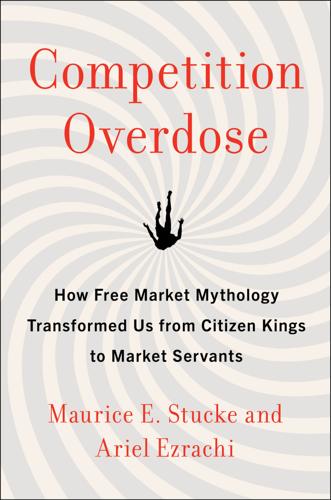
Competition Overdose: How Free Market Mythology Transformed Us From Citizen Kings to Market Servants
by
Maurice E. Stucke
and
Ariel Ezrachi
Published 14 May 2020
In the advertising world, this is known as “behavioral advertising”—in which personal and behavioral data mined from online activities are used to match ads to the interests of the target audience. The Fun Kid Racing app’s marketing of its users’ data through the Google ecosystem is one small instance of the phenomenon Harvard Business School Professor Emerita Shoshana Zuboff has defined as “surveillance capitalism.” Surveillance capitalism “operates through unprecedented asymmetries in knowledge and the power that accrues to knowledge. Surveillance capitalists know everything about us, whereas their operations are designed to be unknowable to us. They accumulate vast domains of new knowledge from us, but not for us . . . for the sake of others’ gain, not ours.”8 By piecing together information gleaned from multiple sources, including the 2018 lawsuit brought by New Mexico’s attorney general against Tiny Lab, Google, and others,9 and recent reports from the United Kingdom,10 French,11 Australian,12 and German13 antitrust agencies, we can get a few glimpses of how this environment is designed by the likes of Google and Facebook.
…
Alyssa Newcomb, “Google Hit with FTC Complaint over ‘Inappropriate’ Kids Apps,” NBC News, December 19, 2018, https://www.nbcnews.com/tech/tech-news/google-hit-ftc-complaint-over-inappropriate-kids-apps-n949666; Google Play Developer Policy Center, “Families,” accessed April 30, 2019, https://play.google.com/about/families/. 5.Tiny Lab, “Tiny Lab Kids,” accessed April 30, 2019, https://www.tinylabkids.com. 6.Scott Goodson, “If You’re Not Paying for It, You Become the Product,” Forbes, March 5, 2012, https://www.forbes.com/sites/marketshare/2012/03/05/if-youre-not-paying-for-it-you-become-the-product. 7.NM AG Complaint ¶ 3. 8.Shoshana Zuboff, The Age of Surveillance Capitalism: The Fight for a Human Future at the New Frontier of Power (New York: Public Affairs, 2019), 11. 9.NM AG Complaint. 10.Unlocking Digital Competition: Report of the Digital Competition Expert Panel (London: March 2019), https://assets.publishing.service.gov.uk/government/uploads/system/uploads/attachment_data/file/785547/unlocking_digital_competition_furman_review_web.pdf (the “Furman Report”). 11.Autorité de la Concurrence, Opinion no. 18-A-03 of 6 March 2018 on Data Processing in the Online Advertising Sector, http://www.autoritedelaconcurrence.fr/doc/avis18a03_en_.pdf (“Autorité Report”). 12.Australian Competition & Consumer Commission (ACCC), Digital Platforms Inquiry: Preliminary Report (December 2018), https://www.accc.gov.au/focus-areas/inquiries/digital-platforms-inquiry/preliminary-report (“ACCC Preliminary Report”). 13.Bundeskartellamt, “Bundeskartellamt Prohibits Facebook from Combining User Data from Different Sources,” news release, February 7, 2019, https://www.bundeskartellamt.de/SharedDocs/Meldung/EN/Pressemitteilungen/2019/07_02_2019_Facebook.html; Bundeskartellamt, “Preliminary Assessment in Facebook Proceeding: Facebook’s Collection and Use of Data from Third-Party Sources Is Abusive,” news release, December 19, 2017, https://www.bundeskartellamt.de/SharedDocs/Meldung/EN/Pressemitteilungen/2017/19_12_2017_Facebook.html. 14.James B.
…
See Federal Trade Commission fuel shortage incidents on airlines, 56–58, 61 Fun Kid Racing app (Tiny Lab), 194–95, 199, 202–3 Gallup, 277 Gamemakers, 192–224 overview, xiii, 192, 195–96 addictive qualities built into apps, 196–203 advertisers bidding on targets, 208–9 attracting bidders, 207–9 benefits of their technology, 221 business models, 198, 220 children’s data gleaned for advertisers, 193–95 controlling what we see or don’t see, 218–22 creating an illusion of choice and control, 211–15 extracting our personal data, 203–7 Google and FB dominance, 208, 210, 213–15 identifying consumers’ weaknesses for advertisers, 199–201 lack of transparency, 209–10 media and traffic from Google and FB, 210 offering developers a helping hand, 198, 204 payment for free services, 216–18 privacy assurance and policies, 194, 206–7, 211, 212, 217–18 profit from auctions, 209–11 surveillance capitalism, 195 targeting consumers, 204–5 toxic competition, 192–93, 203, 206–7, 220–22, 223 tracking software, 204–7, 217, 222 See also Facebook; Google gaming disorder, 202 Gates, Dominic, 265 gazelles with trackers metaphor, 92–93 General Data Protection Regulation, Europe, 287 General Mills, 64 GEO Group, 167, 172, 173, 175, 176 German printing industry, 244 Germany’s antitrust authority and Facebook, 222 Glass-Steagall Act (1933), 127–28 global economic crisis, causes of, 130 Goldberg, Shmuli, 103–4 Goldman Sachs, 274–76 Google auction of user data to advertisers, 208–9 Fun Kid Racing app, 193–95, 199 initial creation of, 282–83 Location History feature, 212–13 time spent on, 196 YouTube, 196, 208–9, 210, 215 See also Gamemakers Google Books Ngram Viewer, 131, 131–32, 132 government’s role in promoting healthy competition, 260–72 failure of, leading to financial crisis of 2008, 261–64 preventing exploitation of human weaknesses, 267–69 providing a safety net, 269–72 regulation of the market, 260 regulatory guides for the competition machine, 264–67 See also policy makers greed-inspired competition, 235–36, 237, 240.

Doppelganger: A Trip Into the Mirror World
by
Naomi Klein
Published 11 Sep 2023
one of the leading states … vaccine passports were akin: Craig Mauger, “Michigan Leads the Nation in New COVID Cases, According to CDC Data,” Detroit News, November 16, 2021; Bruce Walker, “Michigan House Oversight Committee Considers Legislation to Ban Vaccine Passports,” Center Square, May 6, 2021; Dave Boucher, “Michigan Lawmakers Invite COVID-19 Conspiracy Theorist to Testify on Bill to Ban Vaccine Passports,” PolitiFact, May 6, 2021. “the infrastructure, globally”: Jason Horowitz, “Steve Bannon Is Done Wrecking the American Establishment. Now He Wants to Destroy Europe’s,” New York Times, March 9, 2018. “good enough”: Jennifer Senior, “American Rasputin,” The Atlantic, June 6, 2022. “surveillance capitalism”: Shoshana Zuboff, The Age of Surveillance Capitalism: The Fight for a Human Future at the New Frontier of Power (London: Profile Books, 2019). Israeli-designed spyware: Stephanie Kirchgaessner et al., “Revealed: Leak Uncovers Global Abuse of Cyber-surveillance Weapon,” The Guardian, July 18, 2021. “nanny cams” … Ring doorbell footage … “God View” … personal photos … period-tracking apps: Allyson Chiu, “She Installed a Ring Camera in Her Children’s Room for ‘Peace of Mind.’
…
They just don’t know what to do about cell phones (or smart speakers or search histories or shadow banning or email and social media metadata…). And neither, it seems, does anyone else, including those in power, who are patently unwilling to rein in what the Harvard professor Shoshana Zuboff has called “surveillance capitalism.” And Wolf, with her “Five Freedoms” campaign and her calls for anti-vax civil disobedience, is giving her followers something to do. She is telling them that it’s not too late to get their privacy, and their freedoms, back. Of course this is an appealing message. The past two decades have been a nonstop drip of shocking revelations about the myriad ways in which the record of our daily and intimate lives has somehow become the property of others.
…
Artificial intelligence is, after all, a mirroring and mimicry machine: we feed in the cumulative words, ideas, and images that our species has managed to amass (and digitize) over its history and these programs mirror back to us something that feels uncannily lifelike. A golem world. “I’d rather see an ad for cute shoes that I am going to like than see ads for a bunch of ugly stuff I don’t want,” one student said in an early class. In our discussions, we came to call this the “cute shoes problem” because it encapsulates one of the main reasons why surveillance capitalism and the AI revolution were able to sneak up on us with so little debate. Many of us do appreciate a certain level of automated customization, especially algorithms that suggest music, books, and people who might interest us. And at first, the stakes seemed low: Is it really a big deal if we see ads and suggestions based on our interests and tastes?
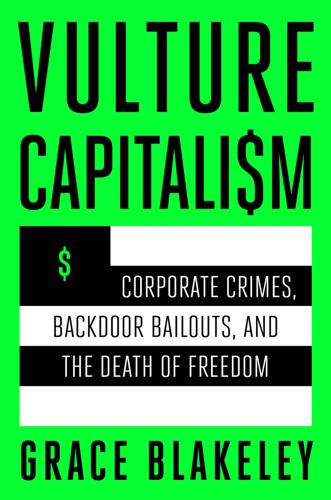
Vulture Capitalism: Corporate Crimes, Backdoor Bailouts, and the Death of Freedom
by
Grace Blakeley
Published 11 Mar 2024
As Marx observed, “capitalists are like hostile brothers”—they compete, while cooperating over the basic structures required to keep the system afloat.112 As we have seen, rather than competing on price, oligopolies will instead compete by keeping costs low, resulting in low wages, tax avoidance, and environmental destruction of the kind outlined in the examples in this chapter.113 They also push competition into the realms of advertising, relationship building, branding, and other tools of what Baran and Sweezy call the “sales effort.”114 Indeed, some argue that the interaction between this fierce competition over sales and technological innovation has led us into a new era of capitalism—surveillance capitalism or technofeudalism—in which a firm’s competitive edge depends upon its ability to predict its customers’ needs by exploiting the data they produce when interacting with big-tech companies like Google and Facebook.115 Today, competition has given way to monopoly and oligopoly across the economy.
…
Karl Marx, Theories of Surplus Value, Volume II, Marxist Internet Archive, accessed July 27, 2023, https://www.marxists.org/archive/marx/works/1863/theories-surplus-value/. 113. Tepper and Hearn, The Myth of Capitalism; Dayen, Monopolized. 114. Baran and Sweezy, Monopoly Capital. 115. Shoshana Zuboff, The Age of Surveillance Capitalism: The Fight for a Human Future at the Frontier of Power (London: Profile Books, 2018). 116. Meagher, Competition Is Killing Us. Yanis Varoufakis, Technofeudalism: What Killed Capitalism (London: Allen Lane, 2023). 117. Ibid. 118. Ibid. 119. Tepper and Hearn, The Myth of Capitalism. 120.
…
Madoff Investment Securities LLC, 120–21 Bevins, Vincent, 191 Bezos, Jeff, 75–77, 80–81, 132 Biden, Joe, 69, 70–71, 136, 140–42 Big Three asset managers, 133, 135, 137 biopolitics (Foucault), 105 BlackRock, 69, 132–37, 257 Blackstone Financial Management, 44, 133 “black swan” events, 50, 114 Blackwater, 104 Bodie, Matthew, 254 Boeing, 3–10, 86, 87, 96, 225 agreements with Southwest Airlines, 5, 10, 16 Boeing 737 MAX, 3–9, 17, 218–19 Boeing 787 Dreamliner, 4–5, 8 capitalism and, 16–17 corporate welfare and, 7–8, 29 MCAS (Maneuvering Characteristics Augmentation System), 4, 5–7 merger with McDonnell Douglas, 4, 8–9 shareholder distributions, 6 Bolsonaro, Jair, 251 BP, 64 Braithwaite, Michael, 163–64 Braun, Benjamin, 129–30 Braverman, Harry, 99–100 Brazil Amazon environmental protections, 251 Fordlândia in, 22–23, 186 Porto Alegre model for participatory budgeting (PB), 232–33, 247 Bregman, Rutger, 224 Bretton Woods, 51 British Business Bank (BBB), 156–57 Brook House (UK), 102 Brown, Matthew, 237–38, 247 Brown, Wendy, 33, 34, 143, 167 Buffett, Warren, 95 Builders Labourers Federation (BLF, Australia), 227–29 Bukharin, Nikolai, 182 bureaucratization, 34–35, 147 Burke, Edmund, 103 Bush, George W., 140 C Calhoun, David, 9 Cameron, David, 54, 154–56, 162 campaign finance reform, 259 Canada COVID-19 aid to corporations, 46, 136 Ethyl Corp. lawsuit and, 197 resistance to the labor movement, 78 Toronto Community Housing Corporation (THTC) participatory budgeting, 232–33 Canada Infrastructure Bank, 136 Capita, 164 Capital (Marx), vii capitalism, 11–17 alliances among capitalists in, 13–14 centralization of power in, xvi–xvii, 92, 136–37 central vs. corporate planning and, x–xiv, xvi, xix–xx, 14–16 class divisions in, x, xix, 11–14, 38–39, 82–84, 108, 151, 158–60, 216–18, 252, 259, 268 democracy and, xiv–xv, 147, see also democratic planning dialectic/creative tension between markets and planning, xvi–xvii, 37, 53, 123, 126 distinction between capital and labor, 30–39 feudalism vs., 12–13, 266, 269–71 foundations of, 264–66, 268–71 free markets and competition and, ix, 11–14, 15–17, 30, 36–39, 97–98, 137, 221, 268–70 fusion of political and economic power in, xviii, 10, 13–15, 33, 80, 82–84, 95–96, 104–8, 183–85, 190, 264–65 fusion of public and private power in, 142–43, 159–60 human capital and, 33, 148, 166–67 as hybrid system of competitive pressure and centralized control, ix, 16, 37, 47, 123, 269 imperialism as highest stage of, 183 international finance system as time lords of, 109, 113–14 investor-capitalists, 118, 148 Keynes and, see Keynes, John Maynard Marx and, see Marx, Karl means of production in, 12–13, 247, 264 “mini-capitalists” and, 33, 118, 122–23 nature of capital and, 11, 12–13 need for business firms in, 81–85 negative externalities, 88–89 new industrial capitalism (Galbraith), 37 pursuit of profit in, xiii–xiv, 25, 29 rewards for competitiveness, 225–26 as rule by capital vs. free markets, 10–11, 36–39, 137 socialism vs., 221 socialized capitalism (Galbraith), 97–98 social relationships in, 11, 13, 143, 157–59, 164, 170, 172, 265–66 stakeholder capitalism, 35–36, 135–36, 148 state vs. markets and, 220–22 surveillance capitalism, 27, 54–58, 94, 98–100, 155 see also disaster capitalism CARES Act (2020), 9–10 Cayman Islands, as tax haven, 42, 132 central banks, 124–32 bank bailouts in the United Kingdom and, 31–32 BlackRock and, 136 democratizing, 258 emergence of central banking, 124–25 legitimacy questions, 129–32 loanable funds model and, 114–18 quantitative easing (QE) and, 127–28, 129, 136 swap lines among, 209–10 US dollar and, 178, 209–10 see also specific central banks Central Intelligence Agency (CIA, US), 175, 189, 241 centralized planning by Amazon, 75–81 in capitalist economies, 14–16, 24, 66–71, 98, 143, 266 collective action problem and, 47–48, 67, 70, 159–61, 166–67, 248–49, 253 corporatism/corporate planning vs., x–xiv, 14–16, 27, 30, 84 democratic, see democratic planning empires and, see empire planning financial crisis of 2008 and, 49–50 at Ford Motor Company, 19–24 Galbraith on, 97–98 Gramsci on, 24 Hayek on, x–xii international finance system and, 113–14 neoliberal revolution vs., 24–26 resisting, 71–72 by states, see state planning by Walmart, 88, 264, 265 Chamayou, Grégoire, 27, 30 Chan, Jackie, 168 Chang, Ha-Joon, 146, 180, 182 Chao, Elaine, 42–43 ChemChina, 90, 91, 124 Chemring Group, 46 Chevron, 64, 194–96, 205 Chicago School, 150–51, 199 Chile democratic socialism in, 241–46 National Telecommunications Enterprise, 245 Project Cybersyn, 245–46, 247, 265, 266 State Development Corporation (CORFO), 244–45 violence of the neoliberal state in, 34 Chiluba, Frederick, 206 China Belt and Road Initiative, 171–72, 182–83 COVID-19 surveillance and, 57–58 developmentalism and, 137, 170–72 Evergrande Group implosion, 167–69, 171 state planning in, 167–72 China CITIC Bank International, 124 Chiquita (formerly United Fruit Company, UFC), 186–89 Christophers, Brett, 136 Chrysler, 29 Citigroup, 120, 124 Civil War, 144 climate breakdown, viii, 66–71 Amazon and, 79 decarbonization efforts, 67, 69–71, 78, 135, 140–41, 250–51, 256, 263 economic power of capital and, 15 Extinction Rebellion and Fridays for Future, 251 fossil-fuel sector and, 66, 69, 139–43 Global North and, 263 Global South and, 263 Green New Deal proposal, 69, 248 need for cooperation and, 66–71, 216, 247–52 Climate Leviathan (Wainwright and Mann), 70 Coase, Ronald, 81, 83–85 Coca-Cola, 81 Cold War, ix, xx collective action problems, 47–48, 66–71, 159–61, 166–67, 248–49, 253, see also democratic planning Collins Aerospace, 219 Colombia, surveillance of Teleperformance workers, 99 Communist Manifesto (Marx), 152 Communist Party of China, 171 of Guatemala, 188 of Indonesia, 191 community wealth building (CWB), 237–38 comparative advantage (Ricardo), 179–81 computer technology ARPANET, 244 coop app platforms, 154–55, 254–55 data protection and privacy, 27, 54–58, 94, 99, 155 in democratizing the future, 264–66 dot-com bubble (1997–2001), 110–11, 120, 133 intellectual property rights and, 262 Project Cybersyn (Chile) and, 245–46, 247, 265, 266 surveillance capitalism and, 27, 54–58, 94, 98–100, 155 Walmart centralized planning and, 88, 264, 265 Connolly, James, 59, 61 conspiracy theories, xvi, 38, 43–44, 53 Cooley, Mike, 216–20 Coons, Chris, 141 COP26 (UN Climate Change Conference, 2021), 70–71 Coral Island, The (Ballantyne), 222–24 Corbyn, Jeremy, 250 Cornered (Lynn), 21 corporations central vs. corporate planning, x–xiv corporate crime and, 106–7, 119–24, 156–57, 220–21 corporate sovereignty, xiv, 22–23, 25, 80, 103–8, 143 corporatism and, x–xiv, 14–16, 27, 30, 84 COVID-19 pandemic programs, 9–10, 41–49, 59–60, 141–42, 155–56 democratic planning and, see democratic planning expanding collective ownership of, 253–55, 257 fusion of political and economic power of, xviii, 10, 13–15, 33, 80, 82–84, 95–96, 104–8, 183–85, 190, 264–65 lobbying by, 105–6, 140, 141–42, 151, 159, 259 managerialism and, 34–35, 84, 100, 108, 216 profit maximization by, xiii–xiv, 25, 29 see also taxes and taxation COVID-19 pandemic airline industry and, 9 BlackRock and, 136 call center workers and, 98–99 CARES Act (2020) and, 9–10 corporate beneficiaries of, 9–10, 41–49, 59–60, 141–42, 155–56 cost-of-living crisis, 48, 58, 63–66, 129 Evergrande (China) implosion and, 167–69, 171 fossil-fuel industry and, 64, 141–42 frauds and scams in, 156–57 housing crisis and, 43, 44–45 inflation and, 63–66 McKinsey & Company and, 53–58, 155 mortality measures during, 105 shareholder distributions/share buybacks during, 45–47, 59–60, 64 shipping companies and, 62–63, 64 state economic programs in, 41–48 supply chain financing and, 153–54 surveillance programs, 57–58, 98–99 UK responses to, 45–46, 53–61, 155–57, 162–63 US responses to, 41–45 WeWork business model and, 112 worker loss of income and poverty, 60, 63, 98–99 zoonotic disease and, 68 creative destruction (Schumpeter), 86, 95, 96 Credit Suisse, 52, 123–24, 153–54 crony capitalism, 34 Crothers, Bill, 155–56 Crown Commercial Service (CCS, UK), 155–56 Crown Prosecution Service (CPS, UK), 102 Cunningham, Ceri, 239–40 Curaçao, as tax haven, 45 D Dalton, David, 155 Danone, 46 Dark Waters (2019 film), 91 data protection and privacy, 27, 54–58, 94, 99, 155 Davis, Mike, 68 Dawn of Everything, The (Wengrow and Graeber), 224–25 Dayen, David, 89 Debt (Graeber), 125 Debt Collective (US), 249–50 Decree 900 (Guatemala), 188 de Guzman, Leody, 177 Delinquent Genius (Cooley), 217 democracy capitalism and, xiv–xv, 147 democratizing the state, 257–61 planning and, see democratic planning as synonymous with socialism (Meiksins Wood), xviii “unfreedom” and, xiv–xv Democratic Party (US) fossil-fuel industry and, 140–41, 142 in Mississippi, 236 democratic planning, 215–66 Argentina, Ciudad Futura, 234–35, 255 Australia, green bans, 227–29 Brazil, participatory budgeting, 232–33, 247 in Chile, 241–46 for the future, 264–66 human nature and, 222–26 Iceland, Better Reykjavik program, 235–36, 258–59 India, Kerala people’s planning, 233–34 international finance system and, 255–57 international institutions and, 261–64 Mississippi, Cooperation Jackson program, 236–37, 247, 251–52, 255 participatory budgeting (PB), 232–33, 235–36, 258–59 people-powered planning, 226–40, 247–52 Spain, Marinaleda workers’ collective, 229–30 state-level, 241–46, 257–61 UK, Blaenau Ffestiniog program (Wales), 238–40 UK, Greater London Enterprise Board, 216–17, 219–20 UK, Lucas Plan/Lucas Aerospace Corporation, xix, 215–22, 226, 229, 231, 247, 248, 266 UK, People’s Plan for the Royal Docks (London), 230–31 UK, Preston community wealth building (CWB) program, 237–38, 247, 255 for work and the corporation, 252–55 democratic socialism, 216–17, 241–48, 265 Democratic Socialists of America (DSA), 250 dependency theory, 184–86, 199, 205 deregulation, xv–xvi, 7, 31, 32, 51, 170, 206 Deutsche Bank, 49 developmentalism, 137, 170–72, 205–8 disaster capitalism, 41–71 climate breakdown and, 66–71 collective action problems and, 47–48, 67, 70, 159–61, 248–49, 253 corporate welfare programs and, 31–32 COVID-19 pandemic and, see COVID-19 pandemic financial crisis of 1987 and, 126–27 financial crisis of 1997 and, 51, 200 financial crisis of 2008 and, see financial crisis of 2008 (subprime bubble) nature of, 38 shock doctrine (N.
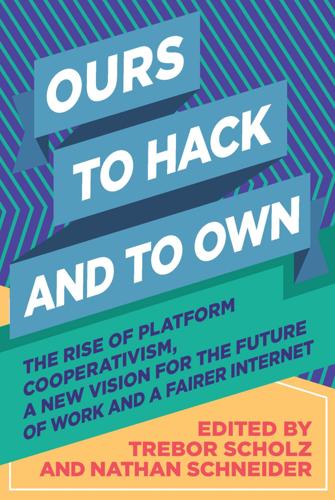
Ours to Hack and to Own: The Rise of Platform Cooperativism, a New Vision for the Future of Work and a Fairer Internet
by
Trebor Scholz
and
Nathan Schneider
Published 14 Aug 2017
Data, identity, and reputation are critical in the platform economy. Silicon Valley aspires to turn data into a new asset class—a commodity to be sold and traded in financial markets, with property regimes surrounding it. Shoshana Zuboff of Harvard Business School calls this new reality “surveillance capitalism.” We have to move from surveillance capitalism to a system that is able to socialize data—such as with new forms of cooperativism and democratic social innovation. Cities, for instance, should be able to run distributed common data infrastructure on their own, with systems that ensure the security, privacy, and sovereignty of citizens’ data.
…
Unchecked, they could pose grave dangers. Platform co-ops can succeed at building privacy-positivity and basic decency into products and sell this as a competitive advantage against venture capitalist-backed tech companies that lack such qualities because they practice what is increasingly recognized as surveillance capitalism, the extraction of our data to modify our behaviors at scale. Learn from those who are succeeding already. Stocksy United is winning by being a design-led co-op that serves its design-oriented customers through co-ownership. Loconomics is gaining traction in the micro-labor market by solving pain-points of customers that VC-backed startups don’t even touch, such as certifying the safety credentials of service providers.

This Is Not Normal: The Collapse of Liberal Britain
by
William Davies
Published 28 Sep 2020
This amounts to what I’ve termed the ‘disenchantment of politics by economics’.11 It also generates an attitude in which the purpose of social relations is to provide data and revenue to some third party. Threaded through the technologies of the credit derivative and the platform is a neoliberal rationality which expands the reach of financial calculation into areas previously governed by social norms. The rise of so-called surveillance capital in the twenty-first century was preordained by an economic and political rationality that dates back to the mid-twentieth century.12 This is disastrous for political liberalism. Dating back to the mid-seventeenth century, and the work of Thomas Hobbes in particular, liberalism’s key concern has been how to artificially manufacture trust.
…
As neoliberal reforms have sought to elevate financial mechanisms and metrics above legal ones, the defence of rights and due process has frequently become an anti-capitalist one. See, for instance, how liberal norms around privacy are an essential tool of resistance to the mission creep of ‘surveillance capital’. And as neoconservatives have sought to elevate executive decisions above legal and judicial authority, it has frequently been those on the left who are found deploying liberal–legal arguments against the state. On issues such as deportations, legal aid, detention without trial and ‘extraordinary rendition’, it has repeatedly been the left (and not the neoliberal centre) that has done the job of defending the rule of law and judicial process.
…
Milonakis, From Economics Imperialism to Freakonomics: The Shifting Boundaries Between Economics and Other Social Sciences, Routledge, 2009. 10 See N. Maclean, Democracy in Chains: The Deep History of the Radical Right’s Stealth Plan for America, Penguin, 2016. 11 W. Davies, The Limits of Neoliberalism: Authority, Sovereignty and the Logic of Competition, Sage, 2014. 12 S. Zuboff, The Age of Surveillance Capitalism: The Fight for a Human Future at the New Frontier of Power, Profile Books, 2019. 13 See J. Vogl, The Ascendency of Finance, John Wiley, 2017. 14 See W. Streeck, How Will Capitalism End? Essays on a Failing System, Verso, 2017. 15 D. Harvey, ‘The “New” Imperialism: Accumulation by Dispossession’, Socialist Register 40. 16 As Jean-François Lyotard wrote in his 1979 The Postmodern Condition (Manchester University Press, 1984, pp. 4–5): ‘The relationships of the suppliers and users of knowledge to the knowledge they supply and use is now tending, and will increasingly tend, to assume the form already taken by the relationship of commodity producers and consumers to the commodities they produce and consume – that is, the form of value.

Empire of AI: Dreams and Nightmares in Sam Altman's OpenAI
by
Karen Hao
Published 19 May 2025
For deep learning, industry drove new technical breakthroughs in neural networks and computer chips that enabled the development of larger and more powerful AI models. But alongside these impressive advances, deep learning’s supercharging of Silicon Valley would also aggressively expand its business model, for which Harvard professor Shoshana Zuboff would coin a term in 2014: surveillance capitalism. Where industrial capitalism derived value from producing material goods that people wanted to buy, surveillance capitalism, Zuboff argued, treated its users as the product. Tech giants sitting atop vast amounts of user data could easily pump those troves into neural networks to more precisely profile users than ever before and milk their engagement for ad revenue.
…
But to do so at high-enough fidelity to become humanlike, which OpenAI says is key in its quest for AGI, they are trained on more data and compute than have ever been used before. Generative AI is thus the maximalist form of deep learning. It is enabled by the cutting-edge software and hardware innovations refined during the first era. It feeds on the exploding troves of data amassed through surveillance capitalism. It is fueled and abetted by the culture of AI research that views consuming as much data as possible as its moral responsibility. Generative AI is now also pushing each of these phenomena even further. What made ChatGPT in November 2022 appear as such a stunning leapfrog ahead of anything that had come before was OpenAI’s vision to push deep learning to this unprecedented scale.
…
Years before ChatGPT, these two decisions—the one to explode GPT-3’s size and the one to quickly release it—would change the course of AI development. It would set off a rapid acceleration of AI advancement, sparking fierce competition between companies and countries. It would fuel an unprecedented expansion of surveillance capitalism and labor exploitation. It would, by virtue of the sheer resources required, consolidate the development of the technology to a degree never seen before, locking out the rest of the world from participating. It would accelerate the vicious cycle of universities, unable to compete, losing PhD students and professors to industry, atrophying independent academic research, and spelling the beginning of the end of accountability.
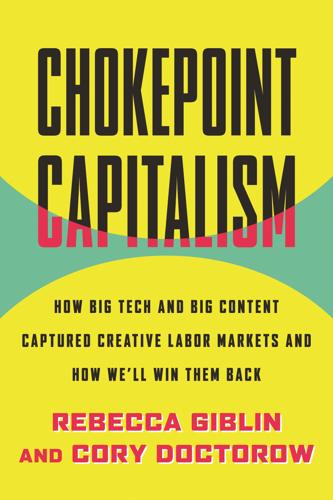
Chokepoint Capitalism
by
Rebecca Giblin
and
Cory Doctorow
Published 26 Sep 2022
Alexandra Alter, “Best Sellers Sell the Best Because They’re Best Sellers,” New York Times, September 19, 2020, https://www.nytimes.com/2020/09/19/books/penguin-random-house-madeline-mcintosh.html. 47. Alter, “Best Sellers Sell the Best Because They’re Best Sellers.” 48. Packer, “Cheap Words.” 49. For more on this, see Cory’s 2020 monograph, How to Destroy Surveillance Capitalism, from OneZero/Medium, available at https://onezero.medium.com/how-to-destroy-surveillance-capitalism-8135e6744d59. 50. Tim Wu, “What Years of Emails and Texts Reveal About Your Friendly Tech Companies,” New York Times, Aug. 4, 2020, https://www.nytimes.com/2020/08/04/opinion/amazon-facebook-congressional-hearings.html. 51. Tepper and Hearn, The Myth of Capitalism, 108–9. 52.
…
This “actionable market intelligence” allows it to poach authors, market its own titles to readers, and cross-sell non-book items to readers. The combination of surveillance and vertical integration means that Amazon vastly outpowers both publishers and other retailers, cementing its dominance, and giving it more opportunities to spy on readers. This is the true heart of “surveillance capitalism”—not the idea that Big Tech uses data-mining and machine learning to create mind-control systems that bypass our critical faculties and trick us into buying whatever they want to sell us. Rather, Big Tech abuses monopoly power to deprive us of choice by limiting what we can buy, redirecting our searches to hide rivals’ products, and locking us into its ecosystem with technologies we can’t alter without risking a lengthy prison sentence.49 Amazon tracks the phrases we highlight, the words we look up, who else is reading from the same address.
…
Google, 200 O’Reilly, 27 Oremus, Will, 236 organizing, 178–79, 248–49 Oron, Gadi, 67 orphan works, 189, 192–94 OverDrive, 241, 242 Pandora, 217 Pascal, Francine, 187 payola, 82 PCs (personal computers), 201 Pelly, Liz, 67, 80, 81, 241, 244 Penderecki, Kyzysztof, 66 Penguin, 35 Penguin Random House, 2, 34–35 The People’s Platform (Taylor), 14 Perry, Katy, 64 Peters, Marybeth, 185 Phoenix Computers, 201 Platform Capitalism (Srnicek), 230 Platform Cooperativism Consortium, 229 platforms, 14–15 playlists, music streaming, 78–84, 143–44 podcasting, 84–88 policy, corporate influence on, 94 Polone, Gavin, 107 Postmates, 166–67 poultry processing, 96 press publishers’ right, 233–34 Prince, 52, 62, 187 print-on-demand, 181 privacy, 137 private equity, 91–93, 249–50 producer cartels, 173 productivity gains, 253–54 Proposition 22, 249 Public Enemy, 62 public interest, 14 public ownership models, 242–44 Rabble, 240–41 radio broadcast industry: about, 89; local content, 90; ownership concentration, 90; private equity and leveraged buyouts, 91–93; regulation, 93–95; revenues, 90–91, 93 Random House, 32, 33, 34, 35 RapCaviar, 78 RealMedia, 26 reciprocity, 93 Recording Industry Association of America (RIAA), 55, 64, 185–86 recoupment, 53, 59, 69, 163, 169, 219, 221–22 regulation: antitrust, 146–51; costs, 137, 144; decline of systems of, 145–46; EU mandates, 257–58 regulatory capture, 92–93 remote work, 15 rentiers, 118–21 rent-seeking, 119 residual remuneration rights, 173–77, 214–16 Resonate, 237–38 Reuters Institute, 236 reversion rights, copyright, 183–95 right-wing radio culture, 94–95 Rimes, LeAnn, 55 Robinson, Joan, 10, 173 Robinson, Nathan, 233 Rodgers, Nile, 54, 164 Rolling Stone, 47 Rosen, Hilary, 185–86 Ross, Orna, 157 Rowdy (Joshua Rowsey), 241 royalties, streaming, 66, 68–69, 221–28 RSS, 86, 122 safe harbor laws, 125–27, 134 sampling, music, 61–63 Sanctuary, 57 Sarbanes-Oxley Act, 163 Sargent, John, 30 Satellite Home Viewer Improvement Act, 185 Saudi royal family, 102 Scheiner, Bruce, 122 Scholz, Trebor, 237 Science Fiction and Fantasy Writers of America, 161–62, 212–13 Science Fiction Writers of America, 159 Screen Actors Guild, 16 self-publishing, 32–33, 215–16 Shatzkin, Mike, 35 Shazam, 73 Sheeran, Ed, 64 Sherman, Cary, 55 Shirky, Clay, 44–45 Shockley, William, 165–66 Shuster, Joe, 180 Siegel, Jerry, 180 Simon & Schuster, 34–35 Simson, John, 71, 93, 225–26 SiriusXM, 56 Slack, David, 108 Smashwords, 22 social media, and music industry, 56 Social Security Act, 150 Softbank, 102 songwriting, 69–70 Sony Music Entertainment: and artist mistreatment, 79, 221; and copyright, 188; dominating position of, 56; and recoupment, 59; and Spotify, 73, 75, 161; Spotify contract, 70–73 SoundCloud, 72–73 SoundExchange, 71 South Africa, 189 Spotify: about, 2, 11, 12, 18, 56; and Epidemic Sound, 81–82; and major labels, 73–75, 181; market share and profit, 83; Marquee initiative, 82; model, 67; and music licensing, 218; playlist culture, 79–84, 143–44; podcasting, 86–88; Sony contract, 70–73 Srinivasan, Dina, 43 Srnicek, Nick, 230 Stafford, Bill, 62 Statute of Anne (1710), 182–83 statutory licensing, 220–28 Stiehm, Meredith, 105 Stocksy, 229–30 Stoller, Matt, 34–35, 46 Stone, Brad, 21 streambait, 80 Stringer, Rob, 79 Stross, Charlie, 28 structural remedies, 148–49 StubHub, 101 Superman, 180 surveillance capitalism, 36 Swift, Taylor, 76, 169–70 switching costs, 7, 18, 26, 28, 31, 92, 119, 144, 249–50 synchronization rights, 219 tacit collusion, 31 talent agents and agencies, 104–9, 175–76 Taylor, Astra, 14, 229 Teachout, Zephyr, 149 Telecommunications Act (1996), 90 television media, back end financials, 109–11 Tencent Music Entertainment, 83, 84 Thicke, Robin, 63–64 third-party cookies, 231–32 This Is Spinal Tap (film), 188 Ticketmaster, 98, 100, 101 Tidal, 160, 239 TikTok, 136 Timberg, Scott, 47, 110–11 TLC, 55 Towse, Ruth, 16 Tracks, 240–41 transparency rights: Audible, 154–59; audit power, 164–65; data disclosure, 161–63; enforceability of regulatory transparency, 163–67; Kindle Unlimited, 159–60; music streaming, 160–61; Netflix, 160; normalization of, 164 Turner, David, 67, 68, 80, 164, 224 21st Century Fox, 2 Uber, 48–49, 102, 166–67, 171, 249 UK Competition and Markets Authority, 43, 45, 50 UK Musicians’ Union, 68 unions, 173–74, 248–49 United Talent Agency, 104, 106 universality, 198–99.

Butler to the World: How Britain Became the Servant of Tycoons, Tax Dodgers, Kleptocrats and Criminals
by
Oliver Bullough
Published 10 Mar 2022
‘I just think people are weak,’ an account manager at a Gibraltar-based gambling company told Cassidy. ‘If you get addicted it’s because you are weak, you have no willpower. Maybe I’m harsh. I see everything in black and white. I am addicted to cars because I want to be.’ But that is not what is happening. Bookmakers have learned all the tricks of what Shoshana Zuboff calls surveillance capitalism, the system invented in Silicon Valley which monetises customers’ data to get ever better at predicting what they will want and then selling it to them. The computer learns your habits and how to indulge you to keep you playing: notifications come at the right time to encourage you to have a bet at the weekend.
…
For the modern history of Gibraltar, I relied on Fortress to Democracy, The Political Biography of Sir Joshua Hassan by Sir William Jackson and Francis Cantos, Rock of Contention by George Hills and Gibraltar: a Modern History, by Chris Grocott and Gareth Stockey. For issues around gambling, I relied on Better Betting with a Decent Feller by Carl Chinn and Vicious Games by Rebecca Cassidy, which is superb. Thanks to James Noyes for talking me through the issues. I found the insights in Shoshana Zuboff’s Surveillance Capitalism very important for understanding how online gambling sucks people in. I also very much appreciated the many parliamentary reports into the betting industries, which provided useful statistics, insights and transcripts. I really like parliamentary reports, and if I was in charge I’d make sure there were more of them.
…
INDEX A accountants regulators 185, 186 Suspicious Activity Reports 189 Acheson, Dean 58 Action Fraud 214, 218 Aliyev family 191–3 Aliyev, Nurali 199, 200, 202 Aliyev, Rakhat 198, 199, 200 Allard Prize 145 Aloi, Tony 229–30, 231 Altman, Oscar 52 Angola 155 Anguilla 198, 235, 243 Apple 223 Archbishop of Canterbury’s Faculty Office 186–8 Asquith, Lord Julian 234 Asquith, Raymond 159, 169, 173 Assad, Hafez al- 159 Assange, Julian 171 Assets Recovery Agency 204 Association of Accounting Technicians 135 Australia 19 visas 244 Austria 166, 170, 171 autonomy 31, 38, 57 Azerbaijan 191–3, 197 B BAE Systems 85–9 Ballester, Freddie 98–100, 104, 105, 114, 121 Bank of England 36–40 cultural uniformity 45–6 Eurodollars 45–7, 49, 50–1, 54–5, 58–9, 232 governors 32, 33, 36 and Midland Bank 42 Suez Crisis 44 banknotes 8 banks and money laundering 194 Suspicious Activity Reports 189–90 Baring, Evelyn, first Earl of Cromer 16, 32 Baring, George Rowland Stanley, third Earl of Cromer 32–3, 36, 39, 55, 232 Baring, Rowland, second Earl of Cromer 32 Barings Bank 57 Barker, Alison 183 Barkshire, John 34, 40, 229–31 BBC, Orwell statue 8 Bean, David 88 Bell, Geoffrey 45–6, 51 Bell, Lord 171 Bercow, John 163 Berry, Elspeth 138, 146–7 Betfair 115 Better Regulation Task Force 111 betting see gambling Betting and Gambling Council 119 Billion Bright Trading Limited 213 billionaires, and COVID-19 pandemic 58 Birnbaum, Eugene 54 Blair, Tony 109 blockchain 242, 243 Boeing 170 BOLSA (Bank of London and South America) 50, 57 Bolton, George 43, 50 Bossano, Joe 95, 96–7, 123, 124 Bretton Woods 30, 31 Brexit 12–13, 140, 142, 144, 248, 249 Bridgen, Andrew 140–1 British empire 18–20, 58 and City of London 30 British Private Equity and Venture Capital Association 142 British Syrian Society 159–60 British Ukrainian Society (BUS) 159–60, 172–3, 174 British Virgin Islands (BVI) 68–71, 74, 79–81, 91, 227 Firtash 161 Khassenov 209 shell companies 72–9, 81–5, 86–9, 90, 123, 124, 235, 238, 239, 240 Brompton Road Tube station 151–3, 164–5, 170, 172, 174, 176–7 Brown, Gordon 132 Brown, John 108, 109–10 Budapest Project 167–8, 169 Burma 20 Butler, Paul 71, 72–3, 75–6 butlers 4–6 Jeeves 6–7, 10–11 C Callaghan, James 36 Cambridge University 160–1, 162, 163, 169, 171–2, 237 Canada 19 visas 244 capital flows 31–2, 50, 51, 55, 59 Eurodollars 40–2, 44–57, 58–9, 232, 238 funk money 64–6, 78–9, 82, 208 capitalism 35 Cassidy, Rebecca 111–12, 113, 116–17, 119 Cayman Islands 233–5, 241, 243, 247 Ceylon 20 Chambers, Ajit 149–50, 151, 152, 153, 165, 176–7 Chandler, Victor 104–7, 108 Child & Child 192–3 China British investment in 19 cultural revolution 66 and Hong Kong 78, 82 money laundering 1–4 socialism 123 and Tanganyika 63 Church of England 186–8 Churchill, Winston 7, 21 City of London 29–30, 32, 57–8 Big Bang 56 cultural uniformity 32–4, 35–6 deregulation 56–7 Eurodollars 44–57, 58–9 financial innovation 48 and funk money 64, 65 Midland Bank 40–2 money laundering 182, 184 offshore finance 249 regulation 39–40 Scottish limited partnerships 137–9, 141, 142–3 and Suez Crisis 42–4 Clarke, Kenneth 240 Clinton, Bill 109, 121, 236 Cobbold, Cameron 33 Colston, Edward 7 Columbus, Christopher 69 communism 35 Tanganyika 62, 63 Coomes, Mr and Mrs 101 Coral 103, 107 Countrywide 193 COVID-19 pandemic 13, 15 and billionaires 58 Crimea 164 Cromer, Evelyn Baring, first Earl of 16, 32 Cromer, George Rowland Stanley Baring, third Earl of 32–3, 36, 39, 55, 232 Cromer, Rowland Baring, second Earl of 32 Crown Prosecution Service 204, 218 Cuban Missile Crisis 52 Curaçao 71–2, 198 Cyprus 19 Firtash 166 D Daily Telegraph 108 Danske Bank 144–5 Davies, Philip 115 defence against money laundering (DAML) SARs 195 Department for Culture, Media and Sport 110 Deripaska, Oleg 226 DF Foundation 161 dirty money see money laundering dollars 41–2, 44, 48 see also Eurodollars double taxation treaties 72, 75 E The Economist 151–2 Eden, Anthony 23, 24, 26 Edmonds, Tamlyn 219–20, 221, 222 Edmonds Marshall McMahon (EMM) 219–20, 225 Egypt, Suez Crisis 15–19, 20–7 Eisenhower, President 24 ELMER 195, 205 Envers 87, 88 estate agents 193 Suspicious Activity Reports 189 Eurobonds 45 Eurodollars 40–2, 44–57, 58–9, 232, 238 exchange rates 31–2, 38 F Fawcett, Millicent 8 FBI Budapest Project 168 Firtash 168–71, 200, 202 Federal Reserve 46, 48 Eurodollars 51, 53–4 Financial Action Task Force (FATF) 182–4 Financial Conduct Authority (FCA) 183, 185, 186 financial innovation 48 see also Eurodollars Financial Intelligence Unit (FIU) 190, 195 Financial Security Index (Tax Justice Network) 235 Financial Times 38 Firtash, Dmitry 157–66, 171–6, 177, 181, 219, 227 Brompton Road Tube station 164–5, 170, 172, 174, 177 Cambridge University 160–1, 162, 163, 169, 171–2, 237 FBI case 168–71, 200, 202 Firtash, Lada 163, 172 fixed-odds betting terminals (FOBTs) 112 Fonseca, Ramon 78 Foreign Affairs Committee 166, 179–81, 248 Fortuna United LP 128–30 France Eurodollars 49 overseas territories 243 prosecutions 216 Suez Crisis 23–4 Franco, Francisco 93, 95 Franklin, Professor Simon 161 Fraser, Ian 128–9 Freud, Jane McAdam 165 Fry, Richard 29–30, 57 funk money 64–6 Hong Kong 78–9, 82 Kazakhstan 208 G gambling 10, 102–5 deregulation 107–14, 236–7 gambling addiction 111, 116– 20, 121, 124 Gibraltar 98–102, 104, 105–7, 113, 114–17, 122–4, 242–3 Gambling Commission 118, 119, 185 Gambling with Lives 118 Gamesys 120 Garcia, Joe 122–3 Gartcosh 125–6 gas 153–5, 168 Gazprom 153, 155, 156, 157, 158, 161 Gazprombank 161 Germany, Eurodollars 49 ghost stations 149–53, 164–5 Gibraltar 91–8, 114–15, 122, 227, 235, 238, 241–3, 245 blockchain 242, 243 gambling 10, 98–102, 104, 105–7, 109, 110, 113, 114– 17, 119–20, 121–4, 242–3, 245 smuggling 92, 97 Global Witness 157–8, 169, 196, 198, 200, 205 golden visas 244–5 Goodman, Helen 172–3 Granovski, Vladimir 159 Greece financial crisis 31 visas 244 Green, Jeremy 57 Greenspan, Alan 46 Grogan, John 159, 160 Group DF 161 Grundy, Milton 233–4, 235–6 Guernsey 235 Guyana 19 H Hambro, Charles 49 Hambros Bank 57, 65 Hayek, Friedrich 35 Hayward, Mark 188 hedge funds Cayman Islands 234 and limited partnerships 138 Her Majesty’s Revenue and Customs 185 Herald 125, 147 Hitler, Adolf 21 Hodge, Margaret 239–40, 241, 247–8 Hodivala, Jama 223 Home Office, UWOs 197 Hong Kong and British Virgin Islands 78–9, 82 Khassenov 208–9, 211–12, 213, 220 Horrocks, Ian 210, 214–15, 218, 219, 220, 221 HSBC 189, 193 Hungary 166, 167–8, 169 Hunte, Lewis 76, 77 Huntington, Earl of 107 I India 19, 20 Institute of Chartered Accountants 194–5 Intelligence and Security Committee 175–6, 201 international business companies (IBCs) 77–8, 83–4 International Centres Forum 90 Ireland betting duty 106 petrol taxes 47, 54, 56, 236 Isle of Man 235, 243 Isola, Albert 241–2 Israel, Suez Crisis 23–4 Italy, visas 244 J Jaspert, Augustus James Ulysses 80–1 Jeeves, Reginald 6–7, 9, 11, 59, 101, 110–11, 232, 246 Jersey 235 Johnson, Boris Brexit campaign 225 London Underground 149–50, 151 and Russian influence in UK 175 Jowell, Tessa 110 Justice Committee 225 K Kazakhstan 198–201, 207, 208 Kennedy, John F. 63 Kenya 19, 61 Keynes, John Maynard 35 Khassenov, Argyn 207–15 private prosecution 215, 219– 23, 226 Kleinwort Benson 64 Kroll 126, 127, 128 Kulich, Aleksandr 209, 213 Kulich, Andrey 208–9, 210, 211, 213–14, 220, 221–3, 226 L Ladbrokes 103, 104, 107, 115 Laird, Judge Francis 220, 221 Lancet 124 Lasser Bros 229 Law Commission 190–1 Law Society of Scotland 136–7 lawyers 11–12 private prosecutions 223–4 regulators 185 Suspicious Activity Reports 188–9 Leask, David 125–6, 128, 131, 134, 135, 136, 144, 147 Lebedev, Yevgeny 248 legislative reform orders (LROs) 139–40 Levin, Carl 247 Li Ka-Shing 78–9 limited partnerships (LPs) 138, 143–4, 146–7 Northern Ireland 146 private fund limited partnerships 142, 145–6 Scottish limited partnerships 128–45, 227, 245, 246 London Kleptocracy Tours 162–3, 196 London Underground 149–51 Brompton Road Tube station 151–3, 164–5, 170, 172, 174, 176–7 M McMafia 179, 196, 214 Macmillan, Harold 20, 23 Malaya 19, 20 Malone, Jeff 17–18, 25–6, 34–5 Malta 242 Marx, Karl 35 May, Theresa 182 Mercantile House 229 merchant banks 36, 44 Metcalf, David 244 Micky Blue Eyes 230–1 Midland Bank 40–2, 44, 45, 51–2, 57 Migration Advisory Committee 244 Mills, Nigel 203 Ministry of Defence Brompton Road Tube station 152, 164–5, 172 Gibraltar 94–5, 114–15 Mishcon de Reya 199, 201 Mitchell, Andrew 239–40, 241, 247–8 Mkapa, Benjamin 89 Mogilevich, Semyon 157, 158, 167–8, 169 Moldova 126–7, 128, 129, 131, 132, 142, 143, 147 money laundering 1–4, 9, 179– 82, 196–8, 203–6, 246 Aliyev family 191–3 Cayman Islands 247 Financial Action Task Force 182–4 limited partnerships 128–45, 146, 245 Mogilevich 167–8 Nazarbayeva case 198–203 Panama Papers 191–2 UK regulation 184–96 Moneyland (Bullough) 30, 45, 130 Montado, Ernest 94, 95 Montegriffo, Peter 114 Moscow Narodny Bank (MNB) 41 Mossack Fonseca 78, 83, 191 Mullin, Roger 132, 134–6, 138– 42, 143–4 Mynors, Humphrey 39 N Nasser, Gamal Abdel 22, 23 National Crime Agency (NCA) 197, 201–4, 241 and Khassenov 214 Nazarbayeva case 199–201, 202, 203 National Lottery 103–4 Nazarbayev family 208 Nazarbayev, Nursultan 198, 201 Nazarbayeva, Dariga 198, 199, 200, 202 Ndibe, Okey 10 Netherlands 190 New Deal 31, 56 New York 229–31 New York Times 53, 89–90 New Zealand 19 Nigeria 155 healthcare 9–10 Nixon, Richard 55 Noriega, Manuel 78 Northern Ireland limited partnerships 146 petrol taxes 47, 54, 56, 236 notaries 187–8 Noyes, James 120 Nurse, Gwyneth 141–2, 143 Nyerere, Julius 62–3, 85, 89–90 O O’Brien, Leslie 54 Ogle, Vanessa 64 online gambling 114–17, 119– 20, 124 Only When I Larf 212 Orange Revolution 155–7, 159 Orban, Victor 169 Ormerod, David 191 Orwell, George 8 overseas territories 235, 239–41, 243, 245 see also British Virgin Islands; Cayman Islands; Gibraltar Owens, Lynne 201 P Panama 78, 82, 240 Panama Papers 83, 191–2 partnerships 132 see also limited partnerships Party Gaming 114, 121–2 Patel, Priti 181 Peel, Robert 7–8 Petfre 120 Philip, Prince 61, 161, 162, 169 police 216–17 and financial crime 218, 219– 20, 246 funding 224 Gartcosh 125–6 Hungary 168 and Khassenov 214, 219–20 and London Kleptocracy Tours 163 and private sector 202 and Scottish limited partnerships 126, 144, 146, 246 Portugal, visas 244 private equity, and limited partnerships 137–9, 142 private fund limited partnerships (PFLPs) 142, 145–6 private prosecutions 215–19, 223–8 Khassenov 215, 219–23, 226 problem gamblers 111, 116–20, 121, 124 Pryor, Henry 195 Public Accounts Committee 248 Purplebricks 193 Putin, Vladimir 155 and Ukraine 156, 164, 166 R Racing Post 106 Rankin, Ian 125, 134 Reagan, Ronald 56 Red Diamond Trading Limited 86, 88 Regulatory Reform Committee 139, 141–2 Rhodes, Cecil 7, 18–19 Riegels, Colin 71 Riegels, Michael in British Virgin Islands 68, 71, 73–4, 75, 76, 77, 78, 82, 83–5 in Tanzania 61–2, 63, 65–7, 85 and Tanzania radar contract 89 Riegels, Norma 67, 68, 73, 75, 84–5 Risby, Lord 159–60, 163–4, 173 Rock Turf Accountants 98, 100–1 RosUkrEnergo (RUE) 155, 156–7, 158, 169 Rothermere, Viscount 32 Royal Navy, Gibraltar 92, 93, 94–5 Russia money in UK 175–6, 179, 182, 222 organised crime 167 and Ukraine 154, 155, 164 S Saudi Arabia, and BAE Systems 87, 90 Scotland, police force 246 Scotsman 125 Scottish limited partnerships (SLPs) 128–45, 227, 245, 246 Scottish National Party 131–2 Scottish private fund limited partnerships 146 Scottish Property Federation 136, 142 Serious Fraud Office (SFO) 206 and BAE Systems 88–9, 90 Seychelles 128–9 Sharif, Khalid Mohammed 192–3 Shaw, David 84 shell companies 72–84, 86–9, 90, 123, 124, 130–1, 196, 237, 239–40 Scottish limited partnerships 128–32 Shetler-Jones, Robert 159, 171, 175 Shonfield, Andrew 37–9, 59 Shor, Ilan 127, 128 Short, Clare 86 Skripal, Sergei 179 Smith, Richard 128–9, 133–4 Solicitors Regulation Authority (SRA) 192–3 Soviet Union 153 see also Kazakhstan; Russia; Ukraine Spain, and Gibraltar 93, 95, 97–8, 124 Spink, Mike 162, 165 sportsbook.com 114 Spring, Richard (Lord Risby) 159–60, 163–4, 173 Standard Chartered 209, 210, 211–12, 220 Stark, Pete 75 sterling 30, 42–3 The Sting 212 Stoutt, Lavity 75, 76 Suez Crisis 15–19, 20–7, 34–5, 42–4, 58, 249 Suez Veterans’ Association (SVA) 15, 16–18, 22, 24, 25–6 suicides, and gambling addiction 118 surveillance capitalism 117 Suspicious Activity Reports (SARs) 2–4, 187–91, 192, 193, 194 ELMER 195, 205 Switzerland Eurodollars 49 Firtash 166 T Tanchel, Vivienne 225–6 Tanganyika 61–3 Tanzania 63, 65–7, 85 corruption 89–90 radar contract 85–9 tax havens 72, 84 see also British Virgin Islands; Cayman Islands; Curaçao Tax Justice Network (TJN) 235 taxation treaties 71–2, 75 Thank You, Jeeves (Wodehouse) 110–11 Thatcher, Margaret 56 Thompson, Mark 181, 206 The Times 131, 140 Tortola 69 Trainspotting 128 Transparency International 185, 194, 196 Transport for London (TfL) 149 Traynor, Brian 99–100 Treasury and Bank of England 37–8 limited partnerships 136, 139, 141–2, 143 Treaty of Utrecht 93 Tube see London Underground Turpin, Neil 187, 188 U UK Finance 190 Ukraine 131, 170, 174–5 British Ukrainian Society 159–60 corruption 155, 164 gas 153–5, 156–7, 158, 168 Orange Revolution 155–7, 159 unexplained wealth orders (UWOs) 196–202, 203–4 United Nations General Assembly, Suez Crisis 43 United States and BAE Systems 87 and British Virgin Islands 78, 82 and Cayman Islands 247 Eurodollars 51, 52, 55 financial deregulation 56–7 and Firtash 166, 168–71, 176, 177 gambling 102, 120–2, 236 and Gibraltar 96 and money laundering 189, 191, 193 New Deal 31, 56 offshore business 71–2, 73, 74–5 and organised crime 166–71 and Panama 78 Regulation Q 41, 56 Suez Crisis 24–5, 43–4 and Tanganyika 63 and Ukraine 164 visas 244 United States Virgin Islands (USVI) 70 V Venezuela 155 Vicious Games (Cassidy) 111– 12, 113, 116–17, 119 Virgin Islands 69, 70 see also British Virgin Islands visas 244–5 Vithlani, Shailesh 85–8 Volcker, Paul 46 W Walker, David 50–1 Wall Street Journal 168–9 Wallace, Ben 194, 196 Washington, George 63 welfare state 31, 56 Westwood, Neville 71, 73 Wheatley, Sowande 240 whistle-blowers 246–7 Whittingdale, John 173–4 Wilkinson, Howard 145 William Hill 103, 107, 108, 115 Without the Option (Wodehouse) 6–7 Wodehouse, P.

Nexus: A Brief History of Information Networks From the Stone Age to AI
by
Yuval Noah Harari
Published 9 Sep 2024
For example, vehicles monitor their drivers’ behavior and share the data with the algorithms of the insurance companies, which raise the premiums they charge “bad drivers” and lower the premiums for “good drivers.”43 The American scholar Shoshana Zuboff has termed this ever-expanding commercial monitoring system “surveillance capitalism.”44 In addition to all these varieties of top-down surveillance, there are peer-to-peer systems in which individuals constantly monitor one another. For example, the Tripadvisor corporation maintains a worldwide surveillance system that monitors hotels, vacation rentals, restaurants, and tourists.
…
International Energy Agency, “Data Centers and Data Transmission Networks,” last update July 11, 2023, accessed Dec. 27, 2023, www.iea.org/energy-system/buildings/data-centers-and-data-transmission-networks; Jacob Roundy, “Assess the Environmental Impact of Data Centers,” TechTarget, July 12, 2023, www.techtarget.com/searchdatacenter/feature/Assess-the-environmental-impact-of-data-centers; Alex de Vries, “The Growing Energy Footprint of Artificial Intelligence,” Joule 7, no. 10 (2023): 2191–94, doi.org/10.1016/j.joule.2023.09.004; Javier Felipe Andreu, Alicia Valero Delgado, and Jorge Torrubia Torralba, “Big Data on a Dead Planet: The Digital Transition’s Neglected Environmental Impacts,” The Left in the European Parliament, Nov. 15, 2022, left.eu/issues/publications/big-data-on-a-dead-planet-the-digital-transitions-neglected-environmental-impacts/. On water requirements, see Shannon Osaka, “A New Front in the Water Wars: Your Internet Use,” Washington Post, April 25, 2023, www.washingtonpost.com/climate-environment/2023/04/25/data-centers-drought-water-use/. 47. Shoshana Zuboff, The Age of Surveillance Capitalism: The Fight for a Human Future at the New Frontier of Power (New York: PublicAffairs, 2018); Mejias and Couldry, Data Grab; Brian Huseman (Amazon vice president) to Chris Coons (U.S. senator), June 28, 2019, www.coons.senate.gov/imo/media/doc/Amazon%20Senator%20Coons__Response%20Letter__6.28.19%5B3%5D.pdf. 48.
…
Christopher Parsons et al., “The Predator in Your Pocket: A Multidisciplinary Assessment of the Stalkerware Application Industry,” Citizen Lab, Research report 119, June 2019, citizenlab.ca/docs/stalkerware-holistic.pdf; Lorenzo Franceschi-Bicchierai and Joseph Cox, “Inside the ‘Stalkerware’ Surveillance Market, Where Ordinary People Tap Each Other’s Phones,” Vice, April 18, 2017, www.vice.com/en/article/53vm7n/inside-stalkerware-surveillance-market-flexispy-retina-x. 42. Mejias and Couldry, Data Grab, 90–94. 43. Ibid., 156–58. 44. Zuboff, Age of Surveillance Capitalism. 45. Rafael Bravo, Sara Catalán, and José M. Pina, “Gamification in Tourism and Hospitality Review Platforms: How to R.A.M.P. Up Users’ Motivation to Create Content,” International Journal of Hospitality Management 99 (2021), article 103064, doi.org/10.1016/j.ijhm.2021.103064; Davide Proserpio and Giorgos Zervas, “Study: Replying to Customer Reviews Results in Better Ratings,” Harvard Business Review, Feb. 14, 2018, hbr.org/2018/02/study-replying-to-customer-reviews-results-in-better-ratings. 46.

People, Power, and Profits: Progressive Capitalism for an Age of Discontent
by
Joseph E. Stiglitz
Published 22 Apr 2019
Unfortunately, as the discussion below will illustrate, there are many uses of Big Data that disadvantage consumers as a whole, and especially informationally disadvantaged consumers. Some have referred to the market economy that is evolving using Big Data as surveillance capitalism. See, for instance, John Bellamy Foster and Robert W. McChesney, “Surveillance Capitalism,” Monthly Review, July 1, 2014; Shoshana Zuboff, “Big Other: Surveillance Capitalism and the Prospects of an Information Civilization,” Journal of Information Technology 30, no. 1 (2015): 75–89; and Shoshana Zuboff, The Age of Surveillance Capitalism (New York: Public Affairs, 2019). 17.“Perfect” price discrimination is the practice of trying to charge each consumer the maximum he is willing to pay for a good or service.

The Lonely Century: How Isolation Imperils Our Future
by
Noreena Hertz
Published 13 May 2020
Even before the coronavirus struck, over half of global companies with more than 1,000 employees were using ‘non-traditional techniques to monitor staff, including tracking keystrokes, monitoring email conversations and even monitoring conversations between staff’.23 ‘User-activity monitoring’ – UAM, as this new world of workplace surveillance is known – was on track to be a $3.3 billion industry by 2023.24 Now, with a rapid rise in remote working as a result of the pandemic, as well as increased emphasis on productivity, worker surveillance has significantly ramped up. We are living in an age that Shoshana Zuboff has called the ‘Age of Surveillance Capitalism’.25 An age in which for increasing numbers of people your employer is not only constantly watching you, but constantly using AI, Big Data and a whole host of ever more intrusive and granular measuring devices to draw all kinds of conclusions about you. Such conclusions can determine your career trajectory including whether you will be promoted or fired, yet they are all too often based on data that is absent of context and doesn’t take into account extenuating circumstances.
…
Twenge, Jean M. iGen: Why Today’s Super-Connected Kids Are Growing Up Less Rebellious, More Tolerant, Less Happy – and Completely Unprepared for Adulthood – and What That Means for the Rest of Us (New York: Simon & Schuster, 2017). Yang, Keming. Loneliness: A Social Problem (London; New York: Routledge, 2019). Zuboff, Shoshana. The Age of Surveillance Capitalism: The Fight for a Human Future at the New Frontier of Power (New York: Public Affairs, 2019). Notes CHAPTER ONE: This is the Lonely Century 1 ‘Covid-19: One Third of Humanity under Virus Lockdown’, The Economic Times, 25 March 2020, https://economictimes.indiatimes.com/news/international/world-news/covid-19-one-third-of-humanity-under-virus-lockdown/articleshow/74807030.cms?
…
Roberts, Behind the Screen: Content Moderation in the Shadows of Social Media (Yale University Press, 2019). 91 Sebastian Deri, Shai Davidai and Thomas Gilovich, ‘Home alone: why people believe others’ social lives are richer than their own’, Journal of Personality and Social Psychology 113, no. 6 (December 2017), 858–77. 92 ‘Childline: More children seeking help for loneliness’, BBC News, 3 July 2018, https://www.bbc.co.uk/news/uk-44692344. 93 J. Clement, ‘U.S. group chat frequency 2017, by age group’. Statista, 5 November 2018, https://www.statista.com/statistics/800650/group-chat-functions-age-use-text-online-messaging-apps/. 94 Shoshana Zuboff, The Age of Surveillance Capitalism (Public Affairs, 2019); see also John Harris, ‘Death of the private self: how fifteen years of Facebook changed the human condition’, Guardian, 31 January 2019, https://www.theguardian.com/technology/2019/jan/31/how-facebook-robbed-us-of-our-sense-of-self. 95 Josh Constine, ‘Now Facebook says it may remove Like counts’, TechCrunch.com, 2 September 2019. https://techcrunch.com/2019/09/02/facebook-hidden-likes/; Greg Kumparak, ‘Instagram will now hide likes in 6 more countries’, TechCrunch.com, 17 July 2019, https://techcrunch.com/2019/07/17/instagram-will-now-hide-likes-in-6-more-countries/. 96 Amy Chozick, ‘This Is the Guy Who’s Taking Away the Likes’, New York Times, 17 January 2020, https://www.nytimes.com/2020/01/17/business/instagram-likes.html. 97 ‘Over Three Quarters of Brits Say Their Social Media Page is a Lie’, Custard Media, 6 April 2016, https://www.custard.co.uk/over-three-quarters-of-brits-say-their-social-media-page-is-a-lie/. 98 Sirin Kale, ‘Logged off: meet the teens who refuse to use social media’, Guardian, 29 August 2018, https://www.theguardian.com/society/2018/aug/29/teens-desert-social-media. 99 Harris, ‘Death of the private self’. 100 Rebecca Jennings, ‘Facetune and the internet’s endless pursuit of physical perfection’, Vox, 25 July 2019, https://www.vox.com/the-highlight/2019/7/16/20689832/instagram-photo-editing-app-facetune. 101 Chris Velazco, ‘Apple highlights some of the best (and most popular) apps of 2019’, Engadget, 3 December 2019, https://www.engadget.com/2019/12/03/apple-best-apps-of-2019-iphone-ipad-mac/. 102 Elle Hunt, ‘Faking it: how selfie dysmorphia is driving people to seek surgery’, Guardian, 23 January 2019, https://www.theguardian.com/lifeandstyle/2019/jan/23/faking-it-how-selfie-dysmorphia-is-driving-people-to-seek-surgery. 103 Jessica Baron, ‘Does Editing Your Selfies Make You More Likely to Want Plastic Surgery?’

Power, for All: How It Really Works and Why It's Everyone's Business
by
Julie Battilana
and
Tiziana Casciaro
Published 30 Aug 2021
It can even know where we are at a given time, what we sound like, and how we look.33 Because they know what we need and want, these companies have tremendous power that can benefit or harm us depending on how it is used and by whom. The temptation to use control over highly valued resources for less than virtuous purposes is ever-present. In her book The Age of Surveillance Capitalism, social psychologist Shoshana Zuboff meticulously documented how companies profit from using and selling our personal data.34 Initially, tech companies captured users’ data to improve the services they offered. Then, in the 1990s, some began using this information to generate revenue by targeting us with ads they knew we were likely to respond to.
…
See Michel Foucault, Discipline and Punish: The Birth of the Prison (New York: Vintage Books, 1995). 31 Yuval Noah Harari, “Why Technology Favors Tyranny,” The Atlantic, September 13, 2018, https://www.theatlantic.com/magazine/archive/2018/10/yuval-noah-harari-technology-tyranny/568330/. 32 Adam Satariano, “How My Boss Monitors Me While I Work From Home,” New York Times, May 6, 2020, https://www.nytimes.com/2020/05/06/technology/employee-monitoring-work-from-home-virus.html. 33 Amy Webb, The Big Nine: How the Tech Titans and Their Thinking Machines Could Warp Humanity (New York: PublicAffairs, 2020). 34 Shoshana Zuboff, The Age of Surveillance Capitalism: The Fight for a Human Future at the New Frontier of Power (New York: PublicAffairs, 2020). 35 Tobias Rose-Stockwell, “This Is How Your Fear and Outrage Are Being Sold for Profit,” Medium, August 12, 2019, https://medium.com/@tobiasrose/the-enemy-in-our-feeds-e86511488de. See also Tim Wu, The Attention Merchants: The Epic Scramble to Get inside Our Heads (Vancouver, B.C.: Langara College, 2020). 36 Agrawal, Gans, and Goldfarb, Prediction Machines, 43. 37 Open Hearing on Foreign Influence Operations’ Use of Social Media Platforms (Company Witnesses), Before the Select Committee on Intelligence of the United States Senate, 115th Cong. (2018) (statement of Jack Dorsey, CEO of Twitter). 38 Jerrold Nadler and David N.
…
For a comprehensive list of locations of any word or phrase, use your reading system’s search function. 2008 financial crisis, 118, 126 48 Laws of Power, The (Greene), 19 Aakash’s story, 82–84 abuse of power, 21, 37, 43, 110–13 access to valued resources changing power balance, 8–13, 194 collective choices, 195 expanding networks for, 194 Ning’s story, 61, 63–64 personal data surveillance, 151–54 purposeful use of technology and, 148, 150 reclaiming democratic power, 197 Adbusters, 118 Age of Surveillance Capitalism, The (Zuboff), 152 agitation, 118–20, 137, 154, 195, 196, 238n7 agricultural revolution, 142 AI Now Institute, 160 Aladdin, x algorithms, 148–51, 153, 158–60 Alighieri, Dante, 41 Alinsky, Saul D., 20 Allegory of Good and Bad Government, The (Lorenzetti), 165 Allen, Danielle, 186 Alphabet Workers Union, 157–58 altruism, 26, 30–31, 36–38, 55, 196 Amazon, 112, 152, 153, 157, 159 Amnesty International, 156 Andersen, Lene Rachel, 187, 188, 258n83 Anderson, Cameron, 211n25, 212n10, 212n13, 230n12, 250n3 Anderson, Elizabeth, 177 antitrust legislation, 11, 159 apartheid, 117 Appiah, Kwame Anthony, 218n18, 220n34 Apple, 113, 151, 153, 157, 158 Arab Spring, 109, 117, 118 Ardern, Jacinda, 53–54 Arendt, Hannah, 96 Argentina’s marriage equality story, 131–37, 242n34 Argentine LGBT Federation, 133–37, 242n34 Aristotle, 55, 57 artificial intelligence (AI), 148–49 Associação Saúde Criança (Instituto DARA), 28 attention economy, 152–53 attraction strategy, 8–11, 9, 12, 194 Austen, Jane, 46 authoritarianism, xvii, 36–38, 43, 122, 152, 185 authority-power relationship, 66–68, 69–70, 73 #BalanceTonPorc, 137 Banaji, Mahzarin R., 231n19, 231n20, 233n48 Banerjee, Abhijit V., 114 Barefoot College’s innovation, 144–46, 148, 161 Bastida, Xiye, 121–24 Beard, Mary, 101 Beauvoir, Simone de, 102 belonging, 2, 7, 58, 82, 105, 118, 133, 168, 187, 194, 221n40 See also valued resources: affiliation benefit corporations (B-Corps), 176 Bentham, Jeremy, 151, 245n30 Berners-Lee, Tim, 147, 148 betweenness, 79–81, 79, 153 Bhatia, Karan, 157 bias algorithmic, 150–51 fundamental attribution error, 16 negativity bias, 19 status quo bias, 74 confirmation bias, 88 See also stereotypes, racism, gender inequality BIPOC (Black, Indigenous, and People of Color), 88, 117, 151, 196 Björkman, Tomas, 187, 188, 258n83 Black Lives Matter movement, 117, 139, 141, 147–48 Black Voters Matter Fund, 190 Blau, Peter M., 261n4 Bloomberg, Michael, 130 Boards of Directors, 66, 86–89, 91–92, 128–130, 157, 169, 174–177, 188 Bonaparte, Napoleon, 47 Bourdieu, Pierre, 231n26, 232n34 Brass, Daniel J., 226n12 Brave New World (Huxley), 164 Brock, Timothy, 135 Brodsky, Greg, 162–63 Brown, LaTosha, 190–91 Browner, Carol, 80, 81, 84 Buddhism, 32–33 Buffett, Warren, 114 Buolamwini, Joy, 150 Burke, Tarana, 137 Burt, Ronald S., 227n25, 228n36, 236n66 Business Roundtable, 175–76 Caesar, Julius, 101 Cailliau, Robert, 147, 148 Capital (Marx), 110 Carnegie, Andrew, 110–11 Caro, Robert A., 14–15 Carus, Titus Lucretius, 41 caste system, 91–92 Castells, Manuel, 199, 231n26, 239n2, 261n9 Catholic Church, 131, 135 certified coaches, 5, 209n4 change-makers, 74, 78 Channapatna artisans, 47, 50 chattel slavery, 91–92 checks on power, 165–92 collective responsibility, 189–92 employee representation, 177–82 organizational power sharing, 167–73, 191–92 oversight and accountability, 173–77 societal power sharing, 182–84, 192, 256n63 structural limits, 165–66 See also civic education and engagement, civic vigilance Chenoweth, Erica, 124 Chomsky, Noam, 219n25, 257n77 Cialdini, Robert B., 210n15, 227n23 Citizens United, 118 civic education and engagement, 184–88 civic vigilance, 184–86, 192, 257n74, 257n79 Civil Rights Act, 14 Clegg, Stewart, 236n64, 262n22 Cleisthenes, 182, 256n63 climate science, 45–46 Clinton, Bill, 80 Coats, Michael, 167, 168, 169, 170, 171 Code of Hammurabi, 100–01 codetermination, 181 Cohen, Joshua, 257n75, 259n96 collective action consolidation strategy, 11–12, 111, 112 Google employees story, 154–58 keeping power in check, 192 power distribution responsibility, 195 shifting power balance and, 115, 178–79 collective movements, 117–39 agitation, 118–20, 137, 154, 195, 196, 239n6 digital technology and, xvii, 137–39, 154–58, 242n40 innovation, 119–20, 125–30, 147–49, 154, 195, 196 orchestration, 119–20, 131–37, 154, 195, 196 public agenda and, 120–25 shifting power balance, 115 collective orientation, 32, 36, 195 collective responsibility, 189–92 Community Interest Companies, 176 concentration of wealth, 162, 175–76, 189–90 confirmation bias, 88 Confucius, 55 consolidation strategy, 8, 9, 11–12, 111, 112, 142, 194 Contract with America (Gingrich), 80 Cook, Tim, 158 cooperatives, 162–63, 179–81 Cordeiro, Vera, 27–29, 33, 38–39, 166 Courpasson, David, 247n57, 262n22 COVID-19, 38, 49, 176 Creighton, Mandell, 24 CRISPR (clustered regularly interspaced short palindromic repeats), 162, 164, 249n79 Crozier, Michel, 225n6 Csikszentmihalyi, Mihaly, 42 Cuddy, Amy J.
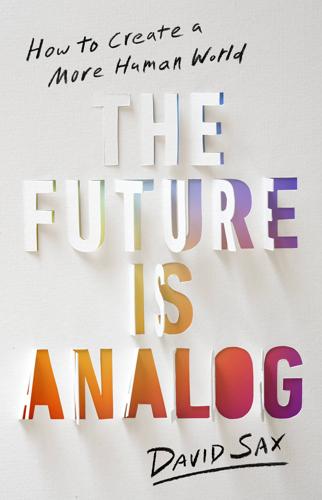
The Future Is Analog: How to Create a More Human World
by
David Sax
Published 15 Jan 2022
What separated Facebook, Twitter, Instagram, Discord, and the other new platforms of the social media age from earlier communities like Metafilter and The WELL wasn’t simply their scale, features, or topics. It was the business model that underpinned them, a potent version of economic and ideological libertarianism that saw conversation as a natural resource to be exploited for commercial gain. In her groundbreaking 2019 book The Age of Surveillance Capitalism, academic and writer Shoshana Zuboff thoroughly dissects the effects of surveillance capitalism’s unchecked rise on individuals and our broader society. “Innocent hangouts and conversations are embedded in a behavioral engineering project of planetary scope and ambitions,” Zuboff writes. “Everything depends upon feeding the algorithms that can effectively and precisely bite on him and bite on her and not let go.
…
Ten Arguments for Deleting Your Social Media Accounts Right Now. New York: Henry Holt, 2018. Headlee, Celeste. We Need to Talk: How to Have Conversations That Matter. New York: HarperCollins, 2017. Odell, Jenny. How to Do Nothing: Resisting the Attention Economy. Brooklyn, NY: Melville House, 2019. Zuboff, Shoshana. The Age of Surveillance Capitalism. New York: PublicAffairs, 2019. Chapter 7 Reedy, Christianna. “Kurzweil Claims That the Singularity Will Happen by 2045.” Futurism. May 10, 2017. Buber, Martin. I and Thou. New York: Charles Scribner and Sons, 1958. Louv, Richard. Last Child in the Woods: Saving Our Children from Nature-Deficit Disorder.

Enshittification: Why Everything Suddenly Got Worse and What to Do About It
by
Cory Doctorow
Published 6 Oct 2025
Not so the “surveillance capitalists” like Google: the longer you linger with their products, the more chances they have to show you an ad, and every time they show you an ad, they make more money. So these “bad” capitalists try to hook you by “hacking your dopamine loops” to keep you angry and clicking and fighting, leading to a host of evils, from anorexia in teens to right-wing extremist militias. Thus, in the “surveillance capitalism” hypothesis, the “good” capitalism of Apple—the kind where money is exchanged for goods—has no need for surveillance. This is obviously a self-serving narrative, but this much was true: the iPhone was substantially less surveillant than Android, and the locked-down nature of the iPhone platform meant that there were fewer hacks and fewer scandals about data-stealing apps.
…
But then, Apple’s single largest source of revenue is a check for more than $20 billion that Google writes it every year to buy the default search box in Safari and on the iPhone. That $20+ billion check is also Google’s single largest expenditure. This deal is brokered and agreed to by Apple CEO Tim Cook and Google CEO Sundar Pichai at an annual summit between the two leaders. For all Apple’s talk of its differentiation from Google and its “surveillance capitalism,” the company has entwined its flagship products with Google’s business in the most fundamental way. Keep in mind what this deal means: Google (like other surveillance ad companies) maintains a deep, nonconsensual dossier on the behaviors, social ties, purchases, economic status, employment history, and physical location of virtually every internet user.
…
Reverse-Centaurs and Chickenization 1 Arise changed some of these practices in 2024, following multiple lawsuits and being barred from doing business in Minnesota and DC. Twiddling 1 For avoidance of doubt, allow me to explicitly state that this is a sarcastic interpretation of the implicit message Google sent to its users, and not an actual quote. Govern yourself accordingly. 2 For more on this, see my short monograph How to Destroy Surveillance Capitalism, published in 2020 by Medium. The End of Self-Help 1 Polish mathematicians were the trailblazers here, developing the electromechanical computers (bombas) needed to break the Nazis’ modified Enigma machines, used to encode and decode secret messages. Their work is less well known than Turing’s, but they deserve enormous credit for their contribution to the war effort.
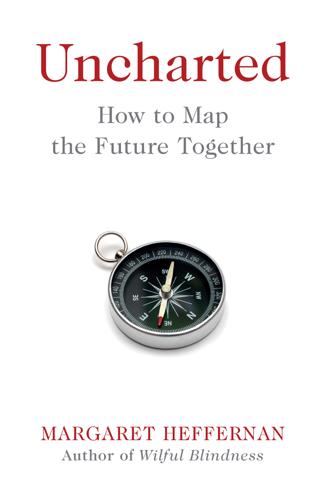
Uncharted: How to Map the Future
by
Margaret Heffernan
Published 20 Feb 2020
Wolmar, Christian, Driverless Cars: On a Road to Nowhere, London Publishing Partnership, 2018 19 For examples here, see Eubanks, Virginia, Automating Inequality: How High-Tech Tools Profile, Police and Punish the Poor, St Martin’s Press, New York, 2017, as well as O’Neill, Cathy, Weapons of Math Destruction: How Big Data Increases Inequality and Threatens Democracy, Allen Lane, London, 2016, and reports from the AI Now Institute: ainowinstitute.org 20 ‘Overcoming Speed Bumps on the Road to Telematics’, www2.deloitte.com/content/dam/insights/us/articles/telematics-in-auto-insurance/DUP-695_Telematics-in-the-Insurance-Industry_vFINAL.pdf, accessed 20 August 2019. Also quoted in Zuboff, Shoshana, The Age of Surveillance Capitalism: The Fight for a Human Future at the New Frontier of Power, Public Affairs, New York, 2019 21 ‘Good Judgment Project research found that super-forecasters can anticipate events 400 days ahead that other forecasters can only see 150 days ahead’, www.goodjudgment.com, accessed 29 January 2019 22 www.youtube.com/watch?
…
guccounter=1&guce_referrer_us=aHR0cHM6Ly93d3cuZWNvc2lhLm9yZy9zZWFyY2g_cT1hbWF6b24rYW50aWNpcGF0b3J5K3Nob3BwaW5nJmFkZG9uPXNhZmFyaQ&guce_referrer_cs=tQBTN1R67wK4N8Ucod2ewA, accessed 21 August 2019 44 Of course, the company might make the wrong choices (it forever sends me emails recommending that I buy books I’ve written), but that’s okay, because the first few I’ll be allowed to keep as a gesture of goodwill 45 Zuboff, Shoshana, The Age of Surveillance Capitalism, op. cit. 46 Strangely this comment appears to have been made without irony or any awareness that our financial systems are imperfect. Pentland, Alex, ‘Society’s Nervous System: Building Effective Government, Energy, and Public Health Systems’, hd.media.mit.edu/tech-reports/TR-664.pdf, accessed 20 August 2019 4 NO AVAILABLE DATASETS 1 For more detail, see Kania, John and Kramer, Mark, ‘Embracing Emergence: How Collective Impact Addresses Complexity’, Stanford Social Innovation Review, 21 January 2013.
…
When people use our app, we can capture their behaviors and identify good and bad [ones]. Then we develop “treatments” and “data pellets” that select good behaviors. We can test how actionable our cues are for them and how profitable certain behaviors are for us.’ Zuboff, Shoshana, The Age of Surveillance Capitalism, op. cit. The book is replete with jaw-dropping interviews with Silicon Valley leaders proudly discussing the efficiency of inevitability when it can be forced. INDEX A note about the index: The pages referenced in this index refer to the page numbers in the print edition. Clicking on a page number will take you to the ebook location that corresponds to the beginning of that page in the print edition.
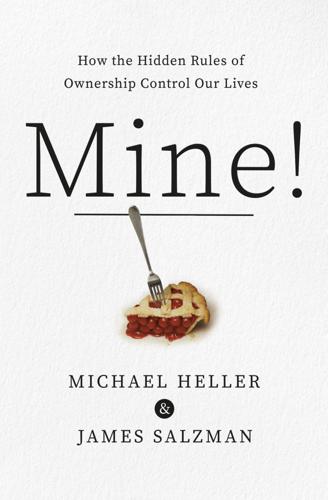
Mine!: How the Hidden Rules of Ownership Control Our Lives
by
Michael A. Heller
and
James Salzman
Published 2 Mar 2021
In 2018, insights: Steve Lohr, “Calls Mount to Ease Big Tech’s Grip on Your Data,” New York Times, July 25, 2019. If you want a sense of what companies know about you, see Thorin Klosowski, “Big Companies Harvest Our Data. This Is Who They Think I Am,” New York Times, May 28, 2020. “surveillance capitalism”: Shoshana Zuboff, The Age of Surveillance Capitalism: The Fight for a Human Future at the New Frontier of Power (New York: PublicAffairs, 2019). “Imagine if General Motors”: Lohr, “Calls Mount.” Chapter 4: My Home Is Not My Castle “Dad, there’s a drone”: “Hillview Man Arrested for Shooting Down Drone; Cites Right to Privacy,” WDRB, July 28, 2015.
…
Collecting, analyzing, and selling this data is truly what drives the Internet economy. In 2018, insights into American’s desires, attitudes, and activities online were worth an estimated $76 billion—if just half of that revenue were shared with individuals, each would receive a check for $122. Shoshana Zuboff has named this business model “surveillance capitalism.” As one economist puts it bluntly: “Imagine if General Motors did not pay for its steel, rubber or glass—its inputs. That’s what it’s like for the big internet companies. It’s a sweet deal.” This is why so many apps are free. But as tech articles repeat: when the app is free, you are the product.
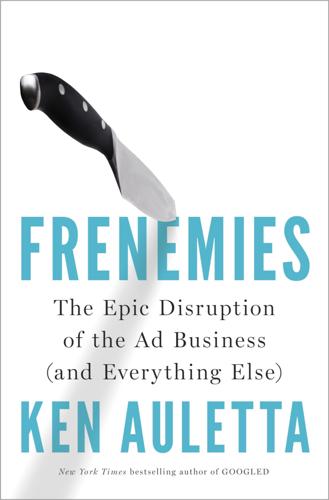
Frenemies: The Epic Disruption of the Ad Business
by
Ken Auletta
Published 4 Jun 2018
What if you have a knee replacement that failed and you sue the manufacturer and the manufacturer goes to Acxiom and subpoenas your behavioral history to show you viewed ads about canoeing? Does that mean you went canoeing? It means you’re interested in canoeing.” Advertisers would be keen on having access to medical records so they could market pharmaceutical products. The accumulation of data to predict future behavior has been labeled surveillance capitalism by Shoshana Zuboff, a professor of business administration at Harvard Business School. Its pioneers have been digital companies like Google and Facebook that derive their marketing power from shadowing citizens and using data to become fortune-tellers. “The game,” Zuboff wrote, “is no longer about sending you a mail-order catalogue or even about targeting online advertising.
…
See mobile phones/smartphones Smith, Adam, 10 Smith, Brett Kassan, 68 Smith, Shane, 125, 235 Snapchat, 137–38 advertising revenues of, 23 Snaptivity, 287 SocialCode, 161–63 socially conscious advertising, 220, 307–9 Unilever and, 217 Weed on, 254–56 Sorrell, Jack, 101–2, 107 Sorrell, Martin, 10, 13, 15, 23, 79, 101–17, 139, 273, 282, 297 on Amazon as threat to ad agencies, 262, 300 on ANA’s choice of Ebiquity to investigate kickback allegations, 18 on Cannes Lions Festival, 257, 336, 338 as CFO at Saatchi & Saatchi, 104, 105–7 childhood of, 101–2 compensation of, 112 on consulting companies as competitive threat, 208–9 disparagement of creatives by, 112–13 on disruption threat, 30–31, 82, 117 education of, 102–4 on Facebook and Google, 101, 117, 123–24, 127 as financial adviser at James Gulliver Associates, 104 at IMG, 103–4 intensity and persistence of, 114–15 Levy and, 113–14, 233, 234 on list of best performing CEOs, 117 management style of, 111–12 on mobile, 178 on new competition agencies face, 101 on public relations firms, 216 reverse takeover of Garland Communications and, 105–6 second marriage of, 114–16 view of Kassan and MediaLink, 31, 101 See also WPP Sorrell, Sally, 101 Sorrell, Sandra Finestone, 104 Spangenberg, Karl, 63 Spiegel, Evan, 137 Spiegel, Matt, 64 Spotify, 313 Starbucks, 304 Starr, Paul, 23–24 State Street Global Advisors’ Fearless Girl statue, 309–10 Steinberg, Jeremy, 212 Stengel, Jim, 250, 256, 290–91 Stevenson, Adlai, 41 Stevenson, Robert Louis, 47 Steyer, James, 183 StrawberryFrog, 308 Streets Were Paved with Gold, The (Auletta), 2 subscription model, 311–15 subtle ad pitches, 96–97 Sullivan, Margaret, 177 Sun Also Rises, The (Hemingway), 37 Super Bowl 2016 advertising, 184, 185, 187 surveillance capitalism, 164 Taco Bell, 80 targeted advertising, 131–33, 160–61, 197–98 T Brand Studios, 206–8 tech companies, as competitive threat to ad agencies, 213–16 television/television networks CBS (See CBS) Gotlieb on fundamentals impacting, 321 as inflection point for advertising, 28 number of viewers, 2015–2017, 193–196, 200, 320 programmatic advertising and, 198 streaming services offered by, 321–22 targeted ads, inability to offer, 197–98 Upfronts, 198, 199, 200–203 Tencent, 32, 146, 161 Tesla, 305 Tesler, Lenard B., 61 The Betches, 221–22 Thinking, Fast and Slow (Kahneman), 184 Thomas, Philip, 250, 252–53, 337 Thompson, Ben, 331 Thompson, Mark, 206–7, 235, 307 Thomson, Robert, 273 3% Conference, 232 Three Blind Mice (Auletta), 3 Time Inc., 208 Time Warner acquisition of AT&T, 297, 299 tobacco, 42–43 Tobaccowala, Rishad, 10, 31–32, 36–37, 46, 146, 147, 236–37 on agency resilience, 282 on AI, 302 on Amazon as threat to ad agencies, 263 on ANA report, 244–45 on delivering utilities and services, 270–71 empathy in marketing of Bank of America, 95–96 on in-house content creation, 220 on Kassan and MediaLink, 70–71, 318 Toffler, Alvin, 14 “Tradeoff Fallacy, The” (Turow), 168 Transformation 2016, 229–37 transparency guidelines, 229–30 Trump, Donald, 186, 312 Trump administration, 297–99 Trump campaign, 294–97 amount spent on advertising, 295 celebrity endorsements, value of, 296 media coverage and, 295–96 targeting data, use of, 296–97 trust issues, between clients and advertising agencies, 35–36, 48–49, 76, 144, 244, 245 Turow, Joseph, 160, 168 21st Century Fox, 76, 335 24/7 Media, 110, 111, 150 Uber, 47 Underclass, The (Auletta), 2 Unilever, 64, 76, 212 agency fees and ad cutbacks of, 319 Dollar Shave Club and, 285, 297 forms Unilever Studio for creative work, 80 Vaseline ad, 185–86, 217 Vaseline Healing Project, 217 unique selling proposition, 41, 308 unverified ads, 136 Upfronts, 198, 199, 200–203 Uva, JC, 48, 66 VandeHei, Jim, 312 Van Veen, Ricky, 166–67 Vaseline ads, 185–86, 217 Vaynerchuk, Gary, 87–91, 306 VaynerMedia, 88–91 Chase Bank account and, 87, 89–91 revenue of, 87 social media marketing and, 88 Vaynerchuk founds, 88 work with GE, 86, 87 Verizon, 137, 160, 263 Vice, 81, 207, 208 Viv, 262, 268–69 Volvo, 307 von Borries, Philippe, 66, 207–8 Wacksman, Barry, 284, 286 Walgreens, 271 Wall Street Journal, 176–77, 207, 313 Walmart, 272 Washington Post, 314 Watson, 211–12 WCRS Group, 143 Weapons of Math Destruction: How Bid Data Increases Inequality and Threatens Democracy (O’Neil), 274–75 Weather Company (weather.com), 210, 211–12 WeChat, 32, 146 Weed, Keith, 46, 47–48, 64, 78, 135, 146, 148, 160–61, 325 on Cannes Lions Festival, 258 at CES, 225 on online advertising directed to bots, 323–24 on socially conscious advertising, 254–56 See also Unilever Weisman, Tony, 249–50 Weitzman, Howard, 61, 73 Western International Media, 143 Wheeler, Tom, 169, 298 Where the Suckers Moon: An Advertising Story (Rothenberg), 40 Whittaker, James, 267, 303 Wieser, Brian, 10, 216, 265, 330 Wildness, 180 Williams, Evan, 311–12 Wind, Jerry, 174 Wire and Plastic Products.
…
* Julia Angwin, Terry Parris, Jr., and Surya Mattu, “What Facebook Knows About You,” ProPublica, September 28, 2016. * Sarah Perez, “Google’s New ‘About Me’ Page Lets You Control What Personal Info Others Can See,” TechCrunch.com, November 11, 2015. * Shoshana Zuboff, “The Secrets of Surveillance Capitalism,” Frankfurter Allgemeine, March 5, 2016. * Sandy Parakilas, “Facebook Won’t Protect Your Privacy,” New York Times op-ed page, November 20, 2017. * As we see, data on the size of the ad-blocking community vary wildly. * The disparity between Mary Meeker’s figure of 5.2 billion mobile phones and Carolyn Everson’s figure of 7.2 billion is a reminder that gathering global data involves some guesswork
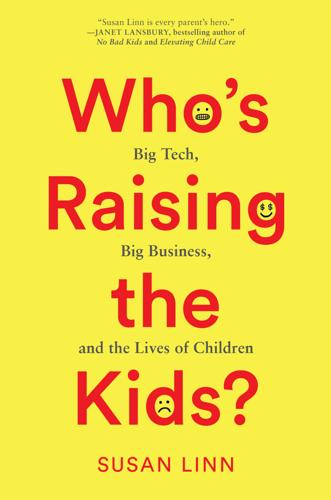
Who’s Raising the Kids?: Big Tech, Big Business, and the Lives of Children
by
Susan Linn
Published 12 Sep 2022
Today, when parents describe their quandaries about children and commercialism, I find myself thinking about that television executive’s tossed-off comment about capitalism. Children in the United States today are growing up in a culture profoundly shaped by a troubling combination of what psychologist and philosopher Shoshana Zuboff and others have called “surveillance capitalism,” which is fueled by the tech industry’s mining of personal information for profit, and “corporate capitalism,” which is dominated by huge privately owned businesses whose primary obligation is to make money for their shareholders. Today, these forces combine to create what’s best described as “consumer capitalism,” a sociopolitical economic system driven by, and in thrall to, consumption.
…
New York: Penguin, 2015. Wu, Tim. The Attention Merchants: The Epic Scramble to Get Inside Our Heads. New York: Knopf, 2016. Zomorodi, Manoush, Bored and Brilliant: How Spacing Out Can Unlock Your Most Productive and Creative Self. New York: St. Martin’s Press, 2017. Zuboff, Shoshana. The Age of Surveillance Capitalism. London: Profile, 2019. Viewing Kantayya, Shalini, dir. Coded Bias. 2020, Brooklyn, NY: 7th Empire Media. Orlowski, Jeff, dir. The Social Dilemma. 2020, Exposure Labs Productions. Rossini, Elena, dir. The Illusionists. 2016, Media Education Foundation (Distributor). Westbrook, Adam, Lucy King, and Jonah M.
…
Jude Children’s Research Hospital, 106 Stanford University, 44 Star Trek: The Motion Picture, 84 Star Wars, 141 STEM (Science, Technology, Engineering, and Mathematics) education, 170–71 Stonewall Uprising (1969), 230 Story of Stuff Project, 38 Strickland, Rachael, 233–34 Student Data Privacy Project, 181, 258 surveillance and online behavior tracking, 47–49, 137, 177–78, 183 surveillance capitalism, 80–81 Target, 19, 59 “target marketing,” 51 tech jargon in lay language, 45–46 “teen tribes,” 62 Television ban on children’s advertising, 113, 140 Channel One News, 182–83 children’s TV watching, 40, 42, 100 deregulation of children’s, 3, 29 host-selling and children’s programming, 140 public (commercial-free), 52–53, 216 racist images and stereotypes, 153, 159–60 story-based programs and films, 216 There Is a River: The Black Struggle for Freedom (Harding), 230 Tijuana, Mexico, 153–54, 156–57 TikTok, 72–73, 152, 202, 219, 238 Today show, 145–46 toilet training, 107 Tony the Tiger (Kellogg’s mascot), 57 tooth-brushing (gamification and rewards), 105–7 touch screens, 40, 215 toy companies, 29–30, 57–60 Hasbro, 4, 57–58, 86, 199 and influencers, 5–6 Lego, 58 Mattel, 36–38, 57–58, 139, 142 and plastic “collectibles,” 83–88 PlayCon 2018 (industry conference), 57–58, 61–62 and Toys “R” Us bankruptcy, 57–61 “unboxing videos,” 5–6, 85, 177, 204, 227 toys brand-licensed, 13–14, 29–30 and children’s creative play, 25–29, 59, 87 electronic, 14, 19, 24 “interactive,” 17, 19 media linked characters and, 27–28, 29–30, 212–13 plastic collectibles, 83–88 racialized and racist, 153–62 recommendations for healthy development of babies and toddlers, 213–14 Toys “R” Us marketing and, 57–61 violent or sexualized, 4, 26, 59, 85, 156 Toys “R” Us, 57–61 Trend Hunter, 61 tribes, 61–65 brand tribes and social media, 63–65 “e-people,” 62–63 Gen Z and, 61–62, 64–65 “teen tribes,” 62 Trolls Hair Huggers, 86–87 Truce, 259 Trump, Donald, xiv, xv, 67, 70–71 Tulsa Race Massacre (1921), 158 Turkle, Sherry, 54–55, 133, 141 Turning Life On, 235, 259 Twenge, Jean M., 43, 235 Twisty Petz, 86–87 Twitchell, James, 60–61 Twitter, 145, 153 Ty Corporation, 84 “unboxing videos,” 5–6, 85, 86–87, 177, 204, 227 UNICEF, 91 Unilever, 64 United Nations Convention on the Rights of the Child, 112, 199 United Nations Education, Science and Culture Organization (UNESCO), 38–39 University of Michigan, 119, 125, 154 University of Michigan–Dearborn, 186 University of Missouri, 182–83 The Unlucky Adventures of Classroom Thirteen (book series), 139 USA Today, 150 user experience (UX design), 45.

Dangerous Ideas: A Brief History of Censorship in the West, From the Ancients to Fake News
by
Eric Berkowitz
Published 3 May 2021
During a 2019 US measles outbreak, Facebook distributed anti-vaccination ads to pregnant women. “Platforms are . . . incentivized to permit and even to encourage the spread of extreme or controversial harmful speech, as it is likely to directly benefit them financially,” write Jeff Gary and Ashkan Soltani.59 This has been called, among other things, the attention economy and surveillance capitalism, but the effect is the same: user engagement is snared with material that is “likely to be false, demagogic, conspiratorial, and incendiary,” says law professor Jack Balkin, which appeals to the users’ “fear, envy, anger, hatred, and distrust,” and which is then turned to profit through the sale of the data such attention generates.
…
See also censorship Curtis, Michael Kent, 155 Cyprian of Antioch, 42–43 Czechoslovakia, 188 Daily Express (publication), 196 Daily Telegraph (publication), 122 damnatio memoriae, 39–40, 41, 44, 77 Dante Alighieri, 61–62, 63 Darnton, Robert, 102, 104, 255 D’Ascoli, Cecco, 62 Das Kapital (Marx), 136 data harvesting, 230, 250. See also surveillance capitalism Daumier, Honoré, 139 David, Jacques-Louis, 107 Davis, Elmer, 195 Death in the Nude (film), 164 Debs, Eugene, 180–81 Declaration of Independence (US), 232 Declaration of the Rights of Man and of the Citizen (France), 89, 106 decorative images. See imagery; paintings, censorship of “Decree on the Press” (Lenin), 206 Defence of the Realm Act (England), 171 Defoe, Daniel, 92 De Morny, Marquise, 161–62 Demosthenes, 21 Denmark, 133, 243–44, 247 Dennis v.
…
See also Russia Spain, 121, 133 Spanish conquistadors, 3, 9 Spanish Earth (film), 191 Spinoza, Baruch, 70, 86, 212 The Spirit of ’76 (film), 177 Spock, Benjamin, 210–11 Stabili, Francesco degli (Cecco d’Ascoli), 62 Stalin, Joseph, 41–42, 206 Stamp Acts (England), 92, 112 Stark, Gary, 163 Stationers’ Company, 80–81, 84, 85 statues: in Ancient China, 1; in Afghanistan, 77; in Ancient Greece, 25; in Ancient Rome, 34, 39–41, 50–51; in England, 76–77; in France, 106; in Ukraine, 41–42 Statute of Treasons (1351, England), 67, 97 Steakley, James, 184 Steinbeck, John, 160, 194 Stephen, James, 67 Stephen, Leslie, 132–33 Stephen the Younger (saint), 57 Stokes, Rose, 177 Stone, Geoffrey, 115, 157 Stories of the Intifada (Green), 204–5 Storm of Steel (Jünger), 167 Strachey, Lytton, 192 Stratton Oakmont, 226 Stravinsky, Igor, 186 Stubbs, John, 81 Suetonius, 32, 33, 41 Sunday Express (publication), 193 The Suppression of Poisonous Opinions (Stephen), 132–33 surveillance capitalism, 222–25. See also data harvesting; online speech Sweden, 244 Swift, Jonathan, 92 Symposium (Plato), 27 Syria, 19, 20, 232 Tacitus, 30, 37, 40 Taiwan, 234 Taliban, 77 Talmud, 15–16, 17–20, 58–59, 73 Tarquinius Superbus, Lucius (king), 34 Tatian, 52 Taylor v. Mississippi, 209 Team of Vipers (Sims), 213 Technologies of Freedom (Pool), 220–21 Terence, 58 terrorism, 227, 241.

Arriving Today: From Factory to Front Door -- Why Everything Has Changed About How and What We Buy
by
Christopher Mims
Published 13 Sep 2021
Bringing in the Kiva robots meant Amazon could “replace all that walking, and instead it’s the shelf that comes to the worker,” says Marc. “You could not have done robotization if you had not first standardized the stowing process.” “Surveillance capitalism” is a term used by social scientist Shoshana Zuboff to describe the business models of companies like Facebook and Google that make money by harvesting our data. But it’s hard not to look at the state of the modern workplace as exemplified by Amazon, where surveillance is far more intrusive, and not see Bezosism as the real surveillance capitalism. Perhaps it’s because surveillance at work has such a long history, and is part of the explicit compact so many of us make with our employers, that it hasn’t earned quite the same level of agita as issues of privacy and personal data have among the chattering classes.
…
See also delivery of goods to consumers; management systems; ships and shipping; trucks and truck drivers; warehouses and warehousing surveillance: combined with work intensification, and automation, 113, 157, 174–75, 203, 211–14, 231–32, 234–35; of delivery drivers, 26; of workers for behavior leading to injury, 238, 286 surveillance capitalism, 231 survivalists, 7 swarm robotics, 78 Swift (trucking company), 107, 112 Target, 109 tarmac, invention of, 129 Taylor, Frederick Winslow, 87–90, 93–98, 103, 104, 105, 113, 213; The Principles of Scientific Management (1911), 95, 97, 98; Shop Management (1903), 95 Taylor, Robert, 216 Taylorism.
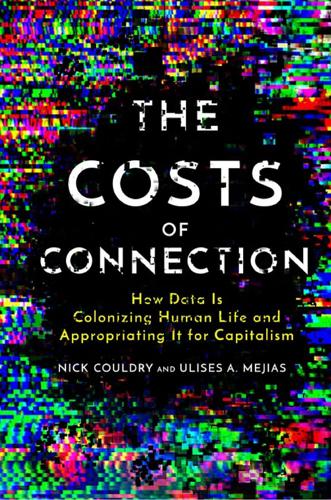
The Costs of Connection: How Data Is Colonizing Human Life and Appropriating It for Capitalism
by
Nick Couldry
and
Ulises A. Mejias
Published 19 Aug 2019
Data colonialism interposes infrastructures of data extraction directly into the texture of human life and so risks deforming human experience in a fundamental way, invading the space of the self on which the values of autonomy and freedom in all their forms depend.130 Our Argument within the Wider Debate about Data and Capitalism Why is it that so far we have talked simply of capitalism and not digital capitalism, informational capitalism, communicative capitalism, platform capitalism, or surveillance capitalism, to name some rival terms?131 The reason is straightforward. No convincing argument has yet been made that capitalism today is anything other than what it has always been: the systematic organization of life so as to maximize value, resulting in the concentration of power and wealth in very few hands.
…
Therefore, when we use the term capitalism with a contemporary reference, we mean capitalism as it is now developing in societies in which “the production, accumulation and processing of information” is growing.132 Surveillance is certainly part of this, again as we have emphasized, but not sufficiently to brand today’s capitalism as surveillance capitalism. For, within the longer history of colonialism and capitalism, surveillance has often been the accompaniment to the direct appropriation of laboring bodies for value (think of the slave plantation).133 What is new today is not so much surveillance but rather the networks of social relations in which vastly extended modes of appropriating human life through data work to order economic and social life as a whole.
…
Zelizer, Viviana. Economic Lives. Princeton, NJ: Princeton University Press, 2010. Zittrain, Jonathan. The Future of the Internet—And How to Stop It. New Haven, CT: Yale University Press, 2008. Žižek, Slavoj. Living in the End Times. 2nd ed. London: Verso, 2011. Zuboff, Shoshana. “Big Other: Surveillance Capitalism and the Prospects of an Information Civilization.” Journal of Information Technology 30, no. 1 (2015): 75–89. Zuboff, Shoshana. In the Age of the Smart Machine. New York: Basic Books, 1988. Zuckerberg, Ethan. “The Internet’s Original Sin.” The Atlantic, August 14, 2014. Zuckerberg, Mark.
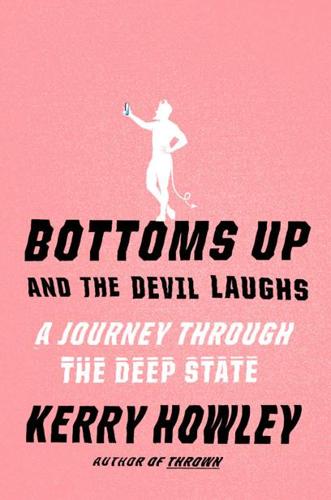
Bottoms Up and the Devil Laughs
by
Kerry Howley
Published 21 Mar 2023
In our time many people are vaguely unsettled by these asymmetries, these incursions into intimate conversations and private space, but very few people resist. It is not the incursions that interest me so much as the speed with which we have accepted them, though I don’t know how bad this deal is—convenience for data. Surveillance capitalism doesn’t manage a system of jails. It will not kidnap you from your country of origin, strap you down, and pour water down your throat until you break your ribs trying to free yourself. It will not collect the story of your life as an idiosyncratic veteran and frame you, in court, as a Taliban sympathizer.
…
The End of Intelligence: Espionage and State Power in the Information Age. Redwood City: Stanford University Press, 2014. United States & Feinstein, D. (2014). Report of the Senate Select Committee on Intelligence: Committee Study of the Central Intelligence Agency’s Detention and Interrogation Program. Zuboff, Shoshana. The Age of Surveillance Capitalism: The Fight for a Human Future at the New Frontier of Power. New York: Public Affairs, 2019. A NOTE ABOUT THE AUTHOR Kerry Howley is a feature writer at New York magazine and the author of Thrown, a New York Times Editors’ Choice and pick for best-of-the-year lists in Time, Salon, Slate, and many other venues.

Democracy's Data: The Hidden Stories in the U.S. Census and How to Read Them
by
Dan Bouk
Published 22 Aug 2022
Some early and influential enthusiasts for Big Data were Viktor Mayer-Schönberger and Kenneth Cukier in Big Data: A Revolution That Will Transform How We Live, Work, and Think (New York: Houghton Mifflin Harcourt, 2013); and Christian Rudder, Dataclysm: Who We Are (When We Think No One’s Looking) (New York: Crown, 2014). One of its most influential critics is Shoshana Zuboff in The Age of Surveillance Capitalism: The Fight for a Human Future at the New Frontier of Power (New York: Public Affairs, 2019). See also Cathy O’Neil, Weapons of Math Destruction: How Big Data Increases Inequality and Threatens Democracy (New York: Crown, 2016). 14. Lindsay Poirier, “Reading Datasets: Strategies for Interpreting the Politics of Data Signification,” Big Data and Society (2021): 1–19; Caitlin Rosenthal’s approach to reading the “frame” of the data informs the analysis of chapter 1 and is discussed further there.
…
The video is available here: Census Bureau, “2020 Census Apportionment Counts Press Kit,” Census Bureau Website, https://www.census.gov/newsroom/press-kits/2021/2020-census-apportionment-counts.html. 52. See Ackermann and Savell, “Count and Increase.” 53. Mayer-Schönberger and Cukier, Big Data; Rudder, Dataclysm. 54. Zuboff, The Age of Surveillance Capitalism. Bibliography Ackermann, Kevin, and Taylor Savell. “Count and Increase.” USApportionment.org. https://usapportionment.org/countandincrease.html. Agar, Jon. The Government Machine: A Revolutionary History of the Computer. Cambridge, MA: MIT Press, 2003. Aldrich, Mark. “Progressive Economists and Scientific Racism: Walter Willcox and Black Americans, 1895–1910.”
…
.: Government Printing Office, 1900. Zotigh, Dennis. “The Treaty That Forced the Cherokee People from Their Homelands Goes on View.” Smithsonian Magazine, April 24, 2019. https://www.smithsonianmag.com/blogs/national-museum-american-indian/2019/04/24/treaty-new-echota/. Zuboff, Shoshana. The Age of Surveillance Capitalism: The Fight for a Human Future at the New Frontier of Power. New York: Public Affairs, 2019. Acknowledgments This book began in 2017 in the reading room of the U.S. National Archives in Washington, D.C. I went there looking for records pertaining to Elbertie Foudray, hoping to explain the significant role this seldom-discussed woman scientist had played in the development of population research.

12 Bytes: How We Got Here. Where We Might Go Next
by
Jeanette Winterson
Published 15 Mar 2021
That a person might not be a place at all, but a carrier of history, a second chance at the future, a being capable of love, a moment that is not capturable, an interior force, a private act with public consequences, but not ultimately public – in the way a park or a shopping mall is public – is what? Romantic? Foolish? Wrong? Or a view of the self that is worth sustaining? * * * In her excellent book The Age of Surveillance Capitalism (2019), Shoshana Zuboff, professor emerita at Harvard Business School, makes the case for a different kind of future human – one that is participatory, not behaviourally modified. A future where technology is a tool for the greater good of all, not only for the money-makers and decision-takers.
…
Thompson, 1963 Industry and Empire: From 1750 to the Present Day, Eric Hobsbawm, 1968 Why the West Rules – For Now, Ian Morris, 2010 Debt: The First 5000 Years, David Graeber, 2011 ‘The Masque of Anarchy’ (poem), Percy Bysshe Shelley, 1832: ‘Ye are many—they are few’ ‘A Short History of Enclosure in Britain’ (essay), Simon Fairlie, 2009 PostCapitalism: A Guide to Our Future, Paul Mason, 2015 Capital in the Twenty-First Century, Thomas Piketty, 2013 Move Fast and Break Things: How Facebook, Google, and Amazon have cornered culture and undermined democracy, Jonathan Taplin, 2017 The Mill on the Floss, George Eliot, 1860 From Sci-fi to Wi-fi to My-Wi Rocannon’s World, Ursula K. Le Guin, 1966 The Midwich Cuckoos, John Wyndham, 1957 Brave New World, Aldous Huxley, 1932 Weaving the Web: The Original Design and Ultimate Destiny of the World Wide Web, Tim Berners-Lee, 1999 ‘We Can Remember It for You Wholesale’ (short story), Philip K. Dick, 1966 The Age of Surveillance Capitalism: The Fight for a Human Future at the New Frontier of Power, Shoshana Zuboff, 2018. The Four: The Hidden DNA of Amazon, Apple, Facebook, and Google, Scott Galloway, 2017 Becoming Steve Jobs: The Evolution of a Reckless Upstart, Brent Schlender and Rick Tetzeli, 2015 How Google Works, Eric Schmidt and Jonathan Rosenberg, 2014 The Art of Electronics, Paul Horowitz and Winfield Hill, 1980 (NOTE: I only bought this because I thought it said Winifred Hill – and girls don’t do circuits, do they?
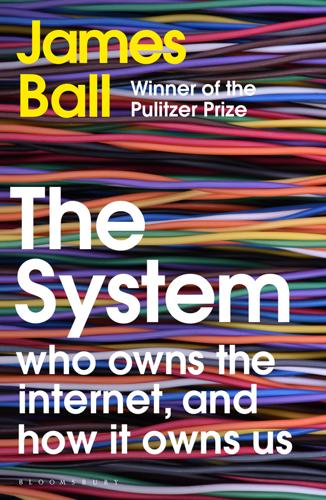
The System: Who Owns the Internet, and How It Owns Us
by
James Ball
Published 19 Aug 2020
Susskind, J., Future Politics: Living Together in a World Transformed by Tech, Oxford University Press, 2018. Wu, T., The Curse of Bigness: Antitrust in the New Gilded Age, Columbia Global Reports, 2018. Zittrain, J., The Future of the Internet – And How to Stop It (s.n.), Yale University Press, 2009. Zuboff, S., The Age of Surveillance Capitalism: The Fight for the Future at the New Frontier of Power, Profile Books Ltd, 2019. NOTES INTRODUCTION 1This analysis takes some inspiration and reasoning from Tim Wu’s The Curse of Bigness, cited at greater length in the conclusion. 2https://www.washingtonpost.com/news/wonk/wp/2017/12/06/the-richest-1-percent-now-owns-more-of-the-countrys-wealth-than-at-any-time-in-the-past-50-years/?
…
aat=1&t=111&dnt=111 15https://www.eff.org/privacybadger 16https://www.eff.org/https-everywhere 17https://certbot.eff.org/ 18This is a pseudonym, but one Kidane uses in real life with his diaspora community too. 19https://uk.kantar.com/tech/social/2018/gen-z-is-the-generation-taking-a-stand-for-privacy-on-social-media/ 20Cohn notes this line of reasoning is central to Cory Doctorow’s online privacy themes in his young adult book, Little Brother. 21https://www.alexa.com/siteinfo/wikipedia.org 22https://stats.wikimedia.org/v2/#/en.wikipedia.org 23https://en.wikipedia.org/wiki/Wikipedia:Statistics 24https://foundation.wikimedia.org/wiki/2016-2017_Fundraising_Report 25https://www.vogue.co.uk/article/how-the-conduit-plans-to-change-the-world 26https://en.wikipedia.org/wiki/Bomis 27https://en.wikipedia.org/wiki/Block_of_Wikipedia_in_Turkey 28https://en.wikipedia.org/wiki/File:LE15_Gender_overall_in_2018.png 29https://www.theatlantic.com/technology/archive/2015/10/how-wikipedia-is-hostile-to-women/411619/ 30https://www.nature.com/articles/d41586-018-05947-8 31As highlighted in a Twitter thread from Demos’s Carl Miller here: https://twitter.com/carljackmiller/status/1022055586471534592 32Zittrain is the author of The Future of the Internet – And How To Stop It, which is well worth a read. CONCLUSION 1https://www.populationpyramid.net/world/2018/ 2I was at first relatively sure I had coined this term myself, but a Google search throws up a few results, including this from Shoshana Zuboff (author of The Age of Surveillance Capitalism) article from 2014: https://www.shoshanazuboff.com/new/my-new-article-on-the-weapons-of-mass-detection/ 3http://www.cityam.com/273662/sainsburys-shares-crash-asda-merger-torpedoed 4https://www.bbc.co.uk/news/business-26266689 5https://www.theguardian.com/business/2012/jan/31/fred-goodwin-stripped-of-knighthood 6The idea that the internet is an essential service may still be contentious to some, but consider this: the idea would have been laughable a decade ago, but now in a country like the UK it is immensely difficult to access information on utility bills and payments, taxation, social housing lists, benefit information and applications, and more, without it.
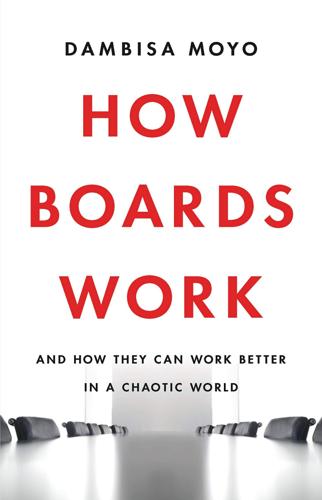
How Boards Work: And How They Can Work Better in a Chaotic World
by
Dambisa Moyo
Published 3 May 2021
Similarly, the success of the leading technology companies today—primarily social media platforms and search engines—has brought into question whether it is legitimate for businesses to collate, use, and manipulate individual users’ data to the extent that they do. Outrage on this issue has been vocalized in books like The Age of Surveillance Capitalism, which went as far as to call for breaking up large tech companies and instituting much tighter regulation. From a board perspective, I believe that the question of data privacy is much more complex than these discussions make it out to be. In fact, I see two specific issues that complicate the immediate instinct to pass judgment on matters of data privacy.
…
Fortune, May 29, 2019. https://fortune.com/2019/05/29/netflix-abortion-georgia-angela-merkel-2019-ipos-broadsheet-may-29/. . “A VC Community Introduces a Gender Quota: The Broadsheet.” Fortune, July 12, 2019. https://fortune.com/2019/07/12/a-vc-community-introduces-a-gender-quota-the-broadsheet/. Zuboff, Shoshana. The Age of Surveillance Capitalism: The Fight for a Human Future at the New Frontier of Power. London: Profile Books, 2019. ALSO BY DAMBISA MOYO Edge of Chaos: Why Democracy Is Failing to Deliver Economic Growth—and How to Fix It Winner Take All: China’s Race for Resources and What It Means for the World How the West Was Lost: Fifty Years of Economic Folly—and the Stark Choices Ahead Dead Aid: Why Aid Is Not Working and How There Is a Better Way for Africa Praise for How Boards Work “How Boards Work is exactly what any prospective—or sitting—board member needs to understand the true rigors and realities of board life.

Four Battlegrounds
by
Paul Scharre
Published 18 Jan 2023
Advantage,” Slate, June 13, 2019, https://slate.com/technology/2019/06/data-not-new-oil-kai-fu-lee-china-artificial-intelligence.html. 20China is “the Saudi Arabia of data”: “China May Match or Beat America in AI,” The Economist, July 15, 2017, https://www.economist.com/business/2017/07/15/china-may-match-or-beat-america-in-ai; Kai-Fu Lee, AI Superpowers: China, Silicon Valley, and the New World Order (Boston: Mariner Books, September 1, 2018), 55, https://www.amazon.com/AI-Superpowers-China-Silicon-Valley/dp/132854639X. 20data is not a fungible resource: Husanjot Chahal, Ryan Fedasiuk, and Carrick Flynn, Messier Than Oil: Assessing Data Advantage in Military AI (Center for Security and Emerging Technology, July 2020), https://cset.georgetown.edu/publication/messier-than-oil-assessing-data-advantage-in-military-ai/. 21surveillance capitalism: Shoshana Zuboff, The Age of Surveillance Capitalism: The Fight for a Human Future at the New Frontier of Power (New York: PublicAffairs, January 15, 2019), https://www.amazon.com/Age-Surveillance-Capitalism-Future-Frontier/dp/1610395697. 22900 million internet users as of 2020: “Number of Internet Users in China from 2008 to 2020,” Statista, 2021, https://www.statista.com/statistics/265140/number-of-internet-users-in-china/. 22750 million internet users in 2020: The Indian Telecom Services Performance Indicators: April–June, 2020 (Telecom Regulatory Authority of India, November 9, 2020), https://trai.gov.in/sites/default/files/Report_09112020_0.pdf. 22400 million users: “Internet access,” in “Digital economy and society statistics—households and individuals,” Eurostat, September 2020, https://ec.europa.eu/eurostat/statistics-explained/index.php/Digital_economy_and_society_statistics_-_households_and_individuals#Internet_usage. 22290 million internet users: “Digital Population in the United States as of January 2021,” Statista, February 2021, https://www.statista.com/statistics/1044012/usa-digital-platform-audience/. 22Facebook has 2.7 billion users: Facebook, “Facebook Reports Third Quarter 2020 Results,” news release, October 29, 2020, https://investor.fb.com/investor-news/press-release-details/2020/Facebook-Reports-Third-Quarter-2020-Results/default.aspx. 22YouTube over 2 billion: “YouTube for Press,” YouTube Official Blog, n.d., https://blog.youtube/press/. 22WeChat’s 1.2 billion: Monthly active users as of 30 September 2020.
…
The United States, China, and Europe operate under vastly different regulatory regimes when it comes to personal data. Europe has leaned the most into regulating data collection, with its General Data Protection Regulation (GDPR). The U.S. government, by contrast, has taken a more laissez-faire approach to regulating technology, allowing the growth of “surveillance capitalism” in which big tech companies collect and store massive amounts of personal data. (Although political winds in Washington are starting to shift with a growing “techlash” against big tech firms.) China represents the starkest difference, with the Chinese Communist Party building an intrusive and expansive techno-authoritarian surveillance apparatus, which is imperfect and fragmented for now but will become increasingly capable over time.
…
When I asked Maya Wang of Human Rights Watch what the United States could do to combat the spread of China’s digital repression, she pointed to the lack of national data privacy regulation in the United States. “The world is essentially being put forward two fairly bad proposals” for tech governance, she said. “One is the U.S. surveillance capitalism model, driven by big companies and essentially is about us all being herded into particular directions to spend money. Then the other is the Chinese government model of mass surveillance. Neither of those are preferable.” The consequences, of course, of what U.S. tech companies and the Chinese government are doing with their mass data collection are very different.
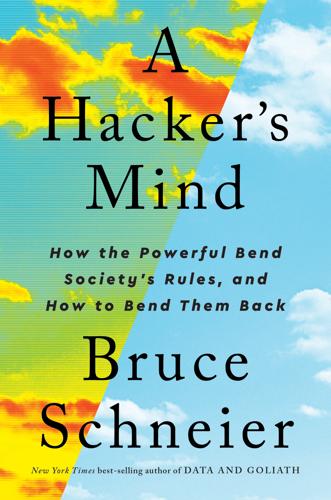
A Hacker's Mind: How the Powerful Bend Society's Rules, and How to Bend Them Back
by
Bruce Schneier
Published 7 Feb 2023
COGNITIVE HACKS 181Goebbels, Hitler’s propaganda minister: Jason Stanley (2016), How Propaganda Works, Princeton University Press, https://press.princeton.edu/books/paperback/9780691173429/how-propaganda-works. 181Cory Doctorow cautions us: Cory Doctorow (26 Aug 2020), “How to destroy surveillance capitalism,” OneZero, https://onezero.medium.com/how-to-destroy-surveillance-capitalism-8135e6744d59. 44. ATTENTION AND ADDICTION 183Everyone hates pop-up ads: Ethan Zuckerman (14 Aug 2014), “The internet’s original sin,” Atlantic, https://www.theatlantic.com/technology/archive/2014/08/advertising-is-the-internets-original-sin/376041. 184Jules Chéret invented a new form: Richard H.
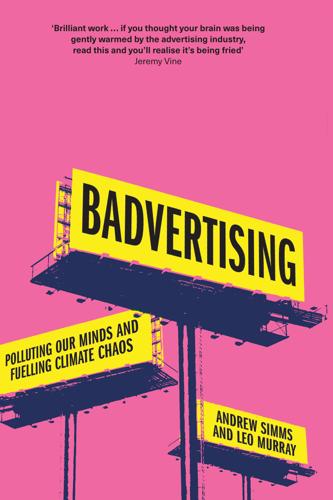
Badvertising
by
Andrew Simms
They can have a behavioural influence that consumers don’t expect.44 * * * So what is coming next? The combination of priming techniques and the ongoing migration of human experience to the online world ought to make us nervous, partly because those who dominate the online sphere now know a very great deal about us. In 2019, Shoshona Zuboff published a massive tome called The Age of Surveillance Capitalism, where she revealed that – for Google at least – they did not at first realise the sheer power this gave them. She dated the phenomenon back to April 2002 when, after a series of unexpected spikes across the USA in the googling of the same question about an obscure TV character from the 1970s (‘what was Carol Brady’s maiden name?’)
…
(tv programme) 26 Wilde, Oscar 91−2 Willys-Overland Company 110 Wilson, Harold 60−1 Wilson, Melissa 101 Wilson, Woodrow 30 winter sports: impact of climate change on 101 women and smoking 31 marketing to 127 Women’s National Basketball Association 95 work and spend cycle 43−5 World Cup 95 (2018 Russia) 98, 99 World Health Organisation 91, 176 Framework Convention on Tobacco Control 49, 79 MPOWER (WHO) 49 World War I: 30 Worldwatch Institute 7 Wright, Orville and Wilbur 144 Wynder, Ernst 58 Yankelovich Corporation 5 Yarnold, Lizzy 105 Young, Sir George 68 young people 9, 38−9 and cigarette smoking 48 ZAP Games 194 Zenit FC 99 Zuboff, Shoshana The Age of Surveillance Capitalism 26 The Pluto Press Newsletter Hello friend of Pluto! Want to stay on top of the best radical books we publish? Then sign up to be the first to hear about our new books, as well as special events, podcasts and videos. You’ll also get 50% off your first order with us when you sign up.

Animal Spirits: The American Pursuit of Vitality From Camp Meeting to Wall Street
by
Jackson Lears
I am indebted to Joe Davis of the Institute for Advanced Studies in Culture for this reference. “To understand God’s thoughts”: Eileen Magnello, “Florence Nightingale: The Compassionate Statistician,” Plus, plus.maths.org/content/florence-nightingale-compassionate-statistician. “surveillance capitalism”: Shoshana Zuboff, The Age of Surveillance Capitalism: The Fight for a Human Future at the New Frontier of Power (2019). 9. RACE, SEX, AND POWER “a wild ‘goat dance’”: “Pavlowa in ‘Goat Dance,’” Washington Post, Nov. 2, 1921, 26. “a smooth son of a bitch”: Sherwood Anderson to Floyd Dell, cited in Malcolm Cowley, introduction to Sherwood Anderson, Winesburg, Ohio [1919] (Viking Press ed., 1964), 3.
…
Nightingale wrote at a time when Providence and Progress moved forward hand in glove; some people think they still do. But if we were to replace Nightingale’s God with the money god of capital, we would have a better sense of where we are today. It is, among other things, a world where quantified information serves the system Shoshana Zuboff has called “surveillance capitalism,” and where human beings have been transformed into human capital—persons without qualities indeed. Irving Fisher is mostly remembered today as the man who, six days before the Great Crash of 1929, announced that the stock market had reached a permanently high plateau. But from our longer-range perspective, surrounded by signs and portents of monetized data, we can draw a different conclusion: Despite his defects as a short-term prognosticator, Irving Fisher had seen the future. 9 Race, Sex, and Power DURING THE DECADE or so following the Armistice, animal spirits virtually disappeared from public discourse, even as vitalist currents coursed through popular culture.
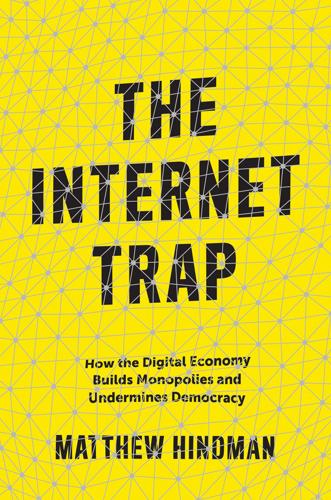
The Internet Trap: How the Digital Economy Builds Monopolies and Undermines Democracy
by
Matthew Hindman
Published 24 Sep 2018
And, of course, the biggest digital firms increasingly serve as a one-stop-shop for all kinds of personal data: email, browsing history, location data, and increasingly even credit-card purchase data. The temptation for governments to use this data through legal or covert means is strong. Any effective response to “surveillance capitalism”38 must begin with the evolutionary audience dynamics that led us here. User surveillance at firms like Google came first and foremost out of the imperative to grow faster than others. A/B testing and audience data collection were used to improve and personalize recommendations even before they were applied to targeted advertising—indeed, before Google had a clear business model at all.
…
Retrieved from http://www.ibtimes.com/bing-vs -google-microsoft%C5%9B-pepsi-challenge-backfires-780715. Zelizer, B. (2009). Journalism and the academy. In K. Wahl-Jorgensen and T. Hanitzsch (eds.), The handbook of journalism studies (pp. 29–41). New York: Routledge. Zuboff, S. (2015). Big other: surveillance capitalism and the prospects of an information civilization. Journal of Information Technology, 30(1), 75–89. INDEX Italic pages refer to figures and tables ABC News, 75 A/B testing: attention economy and, 13; personalization and, 43, 53, 57; nature of the internet and, 170, 174–76; news and, 150–54, 158; recommendation systems and, 43; tilted playing field and, 27–28, 31 Accelerated Mobile Platform (AMP), 80, 144, 179 activism, 48, 103, 169 Adams, William, 65 Adaptive Semantics, 19 advertising: attention economy and, 3–4, 7, 11, 13; branding and, 28–32, 36, 86, 166; click-through rates and, 56–57; cost per thousand impressions (CPM) and, 69; economic geography and, 3–4, 63, 67–69, 80; Google and, 68–69; inversion of, 135, 178; local vs. national per-person rates and, 68; models and, 181–84; nature of internet and, 163–64, 168, 176, 178; new economics of, 67–69; news and, 102, 109, 129, 134–35, 138, 140–46, 163–64, 168, 176, 178; newspapers and, 11, 28, 57, 68–69, 102, 129, 135, 138, 140, 142–44, 164, 178–79; political economy and, 38, 40–41, 48, 56–58, 60; property targeting and, 56–57; remnant, 69; Super Bowl and, 68; television and, 68; tilted playing field and, 15, 17, 25, 28–36, 30 African Americans, 123–25, 126, 191 agglomeration, 9, 63, 82–83 aggregation, 65–67, 76–77 AIG, 86 Ajax, 34 algorithms: black box problem and, 52; deep learning and, 21; filters and, 39, 43, 48, 54, 60; K-nearest neighbor, 44–45, 54; lessons from, 48–53, 59–61; nature of internet and, 178; need for more data and, 50–51, 61; news and, 147, 151–52; personalization and, 39–44, 48–54, 60–61; principle component analysis (PCA) and, 46; Restricted Boltzmann Machine, 46; ridge regression, 46; root mean-squared error (RMSE) and, 43–44, 47–48, 50; Russian hackers and, 178; search costs and, 41–43; singular value decomposition (SVD), 45, 58–59.

Code Dependent: Living in the Shadow of AI
by
Madhumita Murgia
Published 20 Mar 2024
The technology’s dramatic progress over the last few years has been contingent on three things: the explosion of available data on human behaviour and creativity, the increasingly powerful chips needed to crunch this data, and the consolidated power of a few large technology companies that could dedicate the considerable resources required to supercharge its development. Tech giants like Google and Meta have applied machine learning to target advertising as narrowly as possible and grow their worth up to $1tn. This lucrative business model that monetizes personal data is what American social psychologist and philosopher Shoshana Zuboff has called ‘surveillance capitalism’. As the artist James Bridle wrote in an essay last year, ‘These companies made their money by inserting themselves into every aspect of everyday life, including the most personal and creative areas of our lives: our secret passions, our private conversations, our likenesses and our dreams.’2 * Nowadays, we live daily alongside automated systems built on data, their inner workings dictating our personal bonds, power dynamics at work, and our relationship with the state.
…
Q. ref1 Massachusetts Institute of Technology ref1 Material Bank ref1 Mbembe, Achille ref1, ref2 Meareg, Abraham ref1 Megvii ref1 Meituan ref1, ref2 Mejias, Ulises: The Costs of Connection ref1, ref2 Mercado Libre ref1 Merck ref1 Meredith, Sarah ref1 Meta ref1 advertising and ref1 communal violence and ref1 content moderators ref1, ref2 databases of faces and ref1 ethics policy ref1 metaverse and ref1 Sama and ref1, ref2, ref3, ref4, ref5 violence-inciting content ref1 see also Facebook Metiabruz ref1 Metropolitan Police ref1, ref2, ref3, ref4 Mexico ref1, ref2, ref3, ref4, ref5 Miceli, Milagros ref1, ref2, ref3, ref4 Microsoft Azure software ref1, ref2 Bing ref1 Bletchley Park summit (2023) and ref1 ethical AI charter ref1 face recognition systems and ref1, ref2 gig workers and ref1 Microsoft-Salta predictive system/public policy design and ref1, ref2 OpenAI and ref1 Rome Call and ref1, ref2, ref3 Midjourney ref1, ref2 Mighty AI ref1 migration ref1, ref2, ref3, ref4, ref5, ref6, ref7, ref8, ref9, ref10, ref11, ref12, ref13, ref14 Ministry of Early Childhood, Argentina ref1 Mort, Helen ref1, ref2, ref3, ref4, ref5, ref6, ref7, ref8, ref9 A Line Above the Sky ref1 ‘Deepfake: A Pornographic Ekphrastic’ ref1 ‘This Is Wild’ ref1, ref2 Mosul, Iraq ref1 Motaung, Daniel ref1, ref2, ref3, ref4, ref5 Mothers (short film) ref1 ‘move fast and break things’ ref1 Movement, The ref1 Mozur, Paul ref1 M-PESA ref1, ref2 MRIs ref1 Mukasa, Dorothy ref1 multi-problem families ref1 Mumbai, India ref1, ref2, ref3, ref4 Murati, Mira ref1 Museveni, Yoweri ref1 Musk, Elon ref1, ref2 Muslims ref1, ref2, ref3, ref4, ref5, ref6, ref7, ref8, ref9, ref10, ref11, ref12, ref13 Mutsaers, Paul ref1 Mutemi, Mercy ref1, ref2 My Image My Choice ref1 Nairobi, Kenya ref1, ref2 facial recognition in ref1 gig workers in ref1, ref2, ref3, ref4 Sama in ref1, ref2, ref3, ref4, ref5 Nandurbar, Western India ref1, ref2, ref3 National Health Service ref1, ref2 National Union of Professional App-Based Transport Workers ref1 National University of Defense Technology, China ref1 Navajo Nation ref1, ref2 NEC ref1 necropolitics ref1 Neruda, Pablo ref1 Netflix ref1 New Delhi, India ref1, ref2, ref3 New York Fashion Week ref1 New York Times ref1, ref2, ref3 Neymar ref1 Ngito, Benjamin ref1 Ni un Repartidor Menos (Not one Delivery Worker Killed) ref1 9/11 ref1, ref2 ‘no-fly’ zones ref1 Noble, Safiya Umoja ref1 non-disclosure agreements (NDAs) ref1, ref2, ref3, ref4 Northpointe ref1 Not Your Porn ref1 Notting Hill carnival ref1 NTech Labs ref1 Obama, Barack ref1 Obermeyer, Ziad ref1 Oculus Quest 2 virtual reality headset ref1 Ofqual ref1 Ola Cabs ref1, ref2 Olympics (2012) ref1, ref2 One Card System ref1 Online Safety Bill, UK ref1 OpenAI AI alignment and ref1 Bletchley Park summit and ref1 ChatGPT and ref1, ref2, ref3, ref4, ref5 creativity and ref1, ref2 Rome Call and ref1 Sama and ref1, ref2 Operation Condor ref1 Optum ref1 organ-allocation algorithm ref1 Orwell, George ref1, ref2 osteoarthritis ref1 outsourcing ref1, ref2, ref3, ref4, ref5, ref6, ref7, ref8, ref9, ref10, ref11 Ovcha Kupel refugee camp ref1 Oxford Internet Institute ref1 pain, African Americans and ref1 Palestine ref1 Parkinson’s disease ref1 Parks, Nijer ref1, ref2 Parvati (tuberculosis patient) ref1, ref2, ref3, ref4 Peled, Nirit ref1 Pena, Paz ref1, ref2 Perth, Western Australia ref1, ref2, ref3, ref4, ref5, ref6, ref7 Photoshop ref1, ref2, ref3 physiognomy ref1 Pi ref1 pilot programmes abandonment of ref1, ref2 ‘graveyard of pilots’ ref1 public disclosure of ref1 replacement of with human solution ref1 PimEyes ref1 policing CCTV cameras and see CCTV Crime Anticipation System ref1 De Moeder Is de Sleutel (The Mother Is the Key) ref1 diffuse policing ref1 facial recognition and see facial recognition forgiveness and ref1 predictive policing algorithms ref1 ProKid ref1, ref2, ref3 Right To Be Forgotten and ref1 Polosukhin, Illia ref1, ref2 Pontifical Academy of Sciences ref1 Pontifical Gregorian University ref1 pornography deepfake see deepfakes revenge porn ref1, ref2, ref3, ref4, ref5 Portal De La Memoria ref1 Posada, Julian ref1 pregnancy, teenage ref1 abandonment of AI pilot in Argentina ref1 abortion and ref1, ref2, ref3, ref4, ref5, ref6, ref7 digital welfare state and ref1 Microsoft Azure software and ref1 public disclosure of AI pilot in Argentina ref1 replacement of AI pilot with human solution in Argentina ref1 Princeton ref1 ProKid ref1, ref2, ref3 ProPublica ref1, ref2 proxy agents ref1, ref2 PTSD (post-traumatic stress disorder) ref1, ref2 public disclosure ref1, ref2 public-private surveillance state ref1 pulse oximeter ref1 Puma ref1 Puna Salteña, Andes ref1 qTrack ref1, ref2, ref3 Qure.ai ref1, ref2, ref3, ref4 qXR ref1 race facial recognition and ref1, ref2, ref3, ref4, ref5 medical treatment and ref1, ref2, ref3 predictive policing and ref1, ref2, ref3, ref4, ref5 radiologists ref1, ref2, ref3, ref4, ref5, ref6 Raji, Deborah ref1, ref2 Rappi ref1 recruitment systems ref1 Red Caps ref1 red-teamers ref1 Reddit ref1, ref2, ref3 regulation ref1 benefits fraud ref1 content moderators ref1 deepfakes ref1, ref2, ref3, ref4, ref5, ref6, ref7, ref8, ref9, ref10 exam grades ref1 facial recognition ref1, ref2, ref3, ref4 Foxglove and see Foxglove hateful content ref1 military weapons ref1, ref2, ref3, ref4 non-disclosure agreements (NDAs) ref1, ref2, ref3, ref4 organ-allocation algorithm ref1 political prisoners in Guantanamo Bay ref1 Right To Be Forgotten ref1 visa-awarding algorithms ref1 Reprieve ref1, ref2 responsible innovation ref1 Rest of the World ref1 retinopathy ref1 revenge porn ref1, ref2, ref3, ref4, ref5 Ricanek, Karl ref1, ref2 Ricaurte, Paola ref1, ref2 Right To Be Forgotten ref1 Roblox ref1 Roderick, Emily ref1 Rome Call ref1 Roose, Kevin ref1 Rosen, Rabbi David ref1, ref2 Russell, Stuart ref1 Salta, Argentina ref1, ref2 Sama ref1, ref2, ref3, ref4, ref5, ref6, ref7 Samii, Armin ref1, ref2, ref3, ref4, ref5 Sana’a, Yemen ref1 SAP ref1, ref2, ref3 Sardjoe, Damien ref1, ref2 Sardjoe, Diana ref1, ref2, ref3, ref4, ref5, ref6, ref7, ref8, ref9 Sardjoe, Nafayo ref1, ref2, ref3 Scale AI ref1 Scarlett, Cher ref1 Scarlet Letter, The ref1 Schwartz, Steven ref1 Scsky ref1 Secretariat for Early Childhood and Families ref1 self-attention ref1 SenseTime ref1 Sensity AI ref1, ref2, ref3 Sequoia Capital ref1 sexual assault ref1, ref2, ref3 Shelley, Mary: Frankenstein ref1 Silver Lake ref1 Singh, Dr Ashita ref1, ref2, ref3, ref4 Singh, Dr Deepak ref1 ‘slaveroo’ ref1 Slyck, Milo Van ref1 Smith, Brad ref1, ref2, ref3, ref4, ref5 Snow, Olivia ref1 social media ref1, ref2, ref3, ref4 content moderators ref1, ref2, ref3, ref4, ref5, ref6 deepfakes and ref1, ref2, ref3, ref4, ref5, ref6 electoral manipulation and ref1, ref2 SoftBank ref1 South Wales Police ref1 Sri Lanka: Easter Day bombings (2019) ref1 Stability AI ref1 Stable Diffusion ref1 Stratford, London ref1, ref2, ref3 Suleyman, Mustafa ref1 super-recognizers, Metropolitan Police ref1 Supreme Court, UK ref1 surveillance capitalism ref1, ref2 Syria ref1, ref2, ref3, ref4 targeting algorithms ref1, ref2, ref3, ref4 Taylor, Breonna ref1 Tekle, Fisseha ref1 Telegram ref1, ref2 Tesla ref1, ref2, ref3, ref4 Tezpur ref1 Thiel, Peter ref1 Thuo, David Mwangi ref1 Tiananmen Square massacre (1989) ref1, ref2, ref3, ref4 Tibet ref1, ref2 Tiger Global ref1 TikTok ref1, ref2, ref3, ref4, ref5 Top400 ref1, ref2, ref3, ref4, ref5, ref6, ref7 Top600 ref1, ref2, ref3, ref4, ref5, ref6, ref7, ref8, ref9, ref10 transformer ref1, ref2, ref3, ref4 translation ref1, ref2, ref3, ref4, ref5, ref6, ref7 TS-Cop ref1 Tséhootsooí Medical Center, Fort Defiance, Arizona ref1, ref2 tuberculosis ref1, ref2, ref3 Tuohy, Seamus ref1 Uber ref1, ref2, ref3, ref4, ref5, ref6, ref7, ref8 UberEats ref1, ref2 UberCheats ref1, ref2, ref3 Uganda ref1, ref2, ref3, ref4, ref5 Ukraine, war in ref1, ref2, ref3, ref4 UN (United Nations) Declaration of Human Rights ref1 Food and Agriculture Organization ref1 Special Rapporteur on extreme poverty and human rights report on emergence of a digital welfare state (2019) ref1 University of Buenos Aires ref1 University of California Berkeley ref1 Los Angeles ref1 University of Michigan ref1 University of Western Australia ref1, ref2 Urtubey, Juan Manuel ref1, ref2, ref3, ref4 US Department of Defense ref1, ref2 US National Institutes of Health ref1 US Navy ref1 Uszkoreit, Jakob ref1 Valbuena, Tess ref1 Vara, Vauhini ref1 Vaswani, Ashish ref1 Vatican, Rome ref1, ref2, ref3 Vazquez Llorente, Raquel ref1 Venezuela ref1, ref2, ref3 Vice News ref1 virtual private network (VPN) ref1 visa awards ref1 vocabulary, AI-driven work-related ref1 voice-over artists ref1 Wadhwani AI ref1 wages app workers ref1, ref2, ref3, ref4, ref5, ref6, ref7, ref8, ref9, ref10, ref11 data annotation/data-labelling and ref1, ref2, ref3, ref4, ref5, ref6 global wage for AI data workers ref1, ref2 Walmart ref1, ref2 Wang, Maya ref1 Washington Post ref1 Waymo ref1 webcams ref1 WeChat ref1, ref2, ref3 ‘weights’ (strength of connections) ref1 welfare systems ref1, ref2, ref3, ref4 digital welfare state ref1, ref2 White, Andrew ref1 Whittaker, Meredith ref1 Wichi ref1 Wientjes, Jacqueline ref1 Wine, Bobi (Robert Kyagulanyi Ssentamu) ref1, ref2 Wipro ref1 Wired ref1, ref2, ref3, ref4, ref5 WITNESS ref1 Witt, Hays ref1 Woodbridge, New Jersey ref1 Woods, Kat ref1 worker collectives ref1 Worker Info Exchange ref1 World Health Organization ref1 Wright, Robin ref1 Writers Guild of America ref1 Xi Jinping ref1 Xinjiang, China ref1, ref2 X-rays ref1, ref2, ref3, ref4, ref5, ref6, ref7, ref8, ref9, ref10 YouTube ref1, ref2, ref3, ref4 Yu, Amber ref1 Yuan Yang ref1 Zuboff, Shoshana ref1 Zuckerberg, Mark ref1 About the Author MADHUMITA MURGIA is the first Artificial Intelligence Editor of the Financial Times and has been writing about AI, for Wired and the FT, for over a decade.

The Big Nine: How the Tech Titans and Their Thinking Machines Could Warp Humanity
by
Amy Webb
Published 5 Mar 2019
We agree to constant surveillance in exchange for services. This allows the G-MAFIA to generate revenue so that it can improve and expand its offerings to us, whether we are individual consumers or enterprise customers like companies, universities, nonprofits, or government agencies. It’s a business model predicated on surveillance capitalism. Which, if we’re being completely honest, is a system we’re OK with here in the US—otherwise we’d have long stopped using services like Gmail, Microsoft Outlook, and Facebook. In order to work properly, they must gain access to our data trails, which are mined, refined, and packaged. I’m assuming that you use at least one of the products and services offered by the G-MAFIA.
…
See also Dartmouth Workshop Siri, 13, 43, 119 Skype, 215 Smart city pilot programs: in optimistic scenario of future, 168, 176 Smart glasses: Apple, 161; Applezon, 191; in catastrophic scenario of future, 221; Google, 191; in pragmatic scenario of future, 191, 192 Smartphones: Apple, 94; in pragmatic scenario of future, 191 Social Credit Score system, 6, 80, 82, 152, 154, 209; in Rongcheng, 81; tradeoffs for desirable, 211 Socrates, 17 Sorenson, Arne, 75 South China Morning Post, 69–70 Southern, Taryn, 15 SpaceX, 87 Splinternets, 83; pragmatic scenario of future and, 198 Spy birds, 77–78 Stanford, 60, 63; Artificial Intelligence Lab, 65 Stasis: among U.S. policymakers and think tanks, 213; cigarette smoking danger and, 213; climate change and, 213 Step reckoner, 21, 24 Subscription model, smart wearables and tools: in pragmatic scenario of future, 192–193 Suleyman, Mustafa, 43, 117 Summit supercomputer, 146 Sunstein, Cass, 142 Supercomputers, 146 Surveillance capitalism, 95 Sweeney, Latanya, 113–114, 122 Syllogistic logic, Aristotle and, 18 Synthetic data, 182 Tanzania, 83, 200, 210 Taobao, 68–69 Technology, deployment of: need for technical simulations and risk mapping before, 241–242 Tencent, 3, 5, 9, 49, 65, 67, 70–71, 96, 158; cloud service, 71; conversational interfaces, 76; corporate slogan, 70; digital assistant, 71; facial and object recognition lab, 71; healthcare partnerships, 71, 76; management philosophy, 100; market value, 71; mobile payment system, 71, 186; movie studio, 71; original product, 70; pharmaceutical company investments, 71 Tencent Pictures, 71 Tenpay, 71, 186 Tensor Processing Units (TPUs), 91 TensorFlow, 91, 92, 139 TensorFlow Object Detection API, 91 TensorFlow-GAN, 91 Terminator, The: Skynet, 2 Tesla, BAT investment in, 72 Thinking machines, 23, 24, 25, 35, 36, 50–51, 60, 98, 106, 127, 135, 138, 149, 150, 154; ceding control to, 131; computers as, 22; first, 145; generally intelligent, 159, 189 Thousand Talents Plan, 84–85 Tiān Māo, 13 Tianhe-1 supercomputer, 146 Tinsley, Marlon, 39; versus CHINOOK, 39 Transparency: among G-MAFIA in catastrophic scenario of future, 208; G-MAFIA Coalition adoption of as core value in optimistic scenario of future, 157; in pragmatic scenario of future, 188.

Mindf*ck: Cambridge Analytica and the Plot to Break America
by
Christopher Wylie
Published 8 Oct 2019
In the last economic revolution, industrial capitalism sought to exploit the natural world around us. It is only with the advent of climate change that we are now coming to terms with its ecological externalities. But in this next iteration of capitalism, the raw materials are no longer oil or minerals but rather commodified attention and behavior. In this new economy of surveillance capitalism, we are the raw materials. What this means is that there is a new economic incentive to create substantial informational asymmetries between platforms and users. In order to be able to convert user behavior into profit, platforms need to know everything about their users’ behavior, while their users know nothing of the platform’s behavior.
…
Emma Briant (for uncovering critical evidence); Harry Davies, Ann Marlowe, and Wendy Siegelman (for your early investigative work); my former academic supervisor Dr. Carolyn Mair (for reviewing this book and teaching me so much about psychology, data, and culture); and Professor Shoshana Zuboff (whose work on surveillance capitalism helped me refine so many ideas). Perhaps most important, I want to recognize the hundreds of thousands of people who shared this story, called their representatives, marched in protests, held up placards, and sent me encouraging messages—there are so many people I have never even met who have passionately had my back throughout this journey.
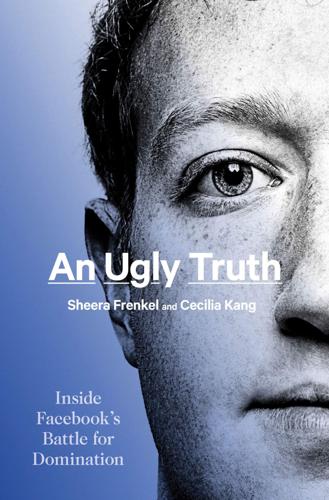
An Ugly Truth: Inside Facebook's Battle for Domination
by
Sheera Frenkel
and
Cecilia Kang
Published 12 Jul 2021
Sandberg’s behavioral advertising prototype treated human data as financial instruments bartered in markets like corn or pork belly futures. Her handiwork was “a contagion,” the official added, echoing the words of academic and activist Shoshana Zuboff, who a year earlier had described Sandberg as playing “the role of Typhoid Mary, bringing surveillance capitalism from Google to Facebook, when she signed on as Mark Zuckerberg’s number two.”3 With scant competition to force the leaders to consider the wellbeing of their customers, there was “a proliferation of misinformation and violent or otherwise objectionable content on Facebook’s properties,” the attorneys general alleged in their complaint.
…
Facebook, Inc., antitrust case filed in the United States District Court for the District of Columbia, Case 1:20-cv-03589-JEB, Document 4, filed December 9, 2020. https://ag.ny.gov/sites/default/files/state_of_new_york_et_al._v._facebook_inc._-_filed_public_complaint_12.11.2020.pdf. 3. the words of academic and activist Shoshana Zuboff: John Naughton, “‘The Goal is to Automate Us’: Welcome to the Age of Surveillance Capitalism,” Observer, January 20, 2019. 4. Zuckerberg and Sandberg met at a Christmas party: Elise Ackerman, “Facebook Fills No. 2 Post with Former Google Exec,” Mercury News, March 5, 2008. 5. $85.9 billion in revenue in 2020: Facebook, “Facebook Reports Fourth Quarter and Full Year 2020 Results,” press release, January 27, 2021.

Border and Rule: Global Migration, Capitalism, and the Rise of Racist Nationalism
by
Harsha Walia
Published 9 Feb 2021
Since the fall of the Berlin Wall, seventy walls now exist in our barbwired and walled world.17 Securitization has also turned the border into a dystopic testing ground, constituting a five-hundred-billion-dollar border security industry18 that flaunts virtual walling through intrusive electronic surveillance technologies, automated decision-making, predictive data analytics, facial recognition software, and biometric systems tested on migrants and refugees by blood-sucking leeches like Amazon, Palantir, Elbit Systems, and European Dynamics. Migrants and refugees are at the forefront of becoming, as Shoshana Zuboff calls it, “the sources of surveillance capitalism’s crucial surplus: the objects of a technologically advanced and increasingly inescapable raw-material-extraction operation.”19 These physical, digital, and symbolic changes to border security are “the most durable and profound consequence of the global war on terror” and are some of the most expensive projects undertaken by states.20 Cutting through and hurting fragile habitats and armed with surveillance drones hunting humans, border walls are key technologies of state governance.
…
Shear and Julie Hirschfeld Davis, “Shoot Migrants’ Legs, Build Alligator Moat: Behind Trump’s Ideas for Border,” New York Times, October 1, 2019, www.nytimes.com/2019/10/01/us/politics/trump-border-wars.html. 13.Ryan Devereaux, “Mining the Future,” The Intercept, October 3, 2019, https://theintercept.com/2019/10/03/climate-change-migration-militarization-arizona/. 14.Associated Press, “Trump Administration to Expand DNA Collection at Border and Give Data to FBI,” Guardian, October 3, 2019, www.theguardian.com/us-news/2019/oct/02/us-immigration-border-dna-trump-administration. 15.Wendy Brown, Walled States, Waning Sovereignty (New York and Cambridge: Zone Books, 2017), 132. 16.Brown, Walled States, 105. 17.Reece Jones, “Introduction,” in Open Borders: In Defense of Free Movement, Reece Jones, ed. (Athens: University of Georgia Press, 2019), 3. 18.Todd Miller, Border Patrol Nation: Dispatches from the Front Lines of Homeland Security (San Francisco: City Lights Books, 2014), 42. 19.Shoshana Zuboff, The Age of Surveillance Capitalism: The Fight for a Human Future at the New Frontier of Power (New York: PublicAffairs, 2019), 10. 20.Reece Jones, Border Walls: Security and the War on Terror in the United States, India, and Israel (London: Zed Books, 2012), 2. 21.Kate Smith, “Immigrant Deportation Filings Hit Record High in 2018, New Report Shows,” CBS News, November 8, 2018, www.cbsnews.com/news/ice-deportations-in-2018-hit-record-high/. 22.Emily Kassie, “Detained: How the US Built the World’s Largest Immigrant Detention System,” Guardian, September 24, 2019, www.theguardian.com/us-news/2019/sep/24/detained-us-largest-immigrant-detention-trump. 23.National Catholic Reporter Editorial Staff, “Editorial: Don’t Look Away from Concentration Camps at the Border,” National Catholic Reporter, June 19, 2019, www.ncronline.org/news/opinion/editorial-dont-look-away-concentration-camps-border. 24.César Cuauhtémoc Garcia Hernández, “Abolishing Immigration Prisons,” Boston University Law Review 97, no. 1 (2017): 245–300. 25.UN High Commissioner for Refugees, Women on the Run: First-Hand Accounts of Refugees Fleeing El Salvador, Guatemala, Honduras, and Mexico, October 26, 2015, www.unhcr.org/5630f24c6.html. 26.Alice Speri, “Detained, Then Violated,” The Intercept, April 11, 2018, https://theintercept.com/2018/04/11/immigration-detention-sexual-abuse-ice-dhs/. 27.Nicoll Hernández-Polanco quoted in Adam Frankel, “Do You See How Much I’m Suffering Here?
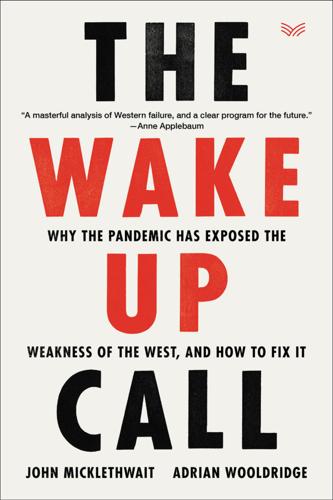
The Wake-Up Call: Why the Pandemic Has Exposed the Weakness of the West, and How to Fix It
by
John Micklethwait
and
Adrian Wooldridge
Published 1 Sep 2020
China’s use of facial recognition technology is designed to make a Panopticon out of the entire country. Is the West slipping into the same trap? Google and Facebook make their money by monitoring their customers, providing them with free and useful services but also raising the specter of what Shoshana Zuboff has called the “Age of Surveillance Capitalism.” The Western state is collecting ever more data on us, somewhat chaotically. Covid has given the state an excuse to create a surveillance society. Israel has even authorized Shin Bet, its domestic security force, to break into people’s mobile phones without their permission. The Panopticon may help keep us alive, but it is also bringing us closer to a future in which we are watched by our smartphones, filmed by cameras on every street corner, and obliged to scan bar codes when we get on the train.
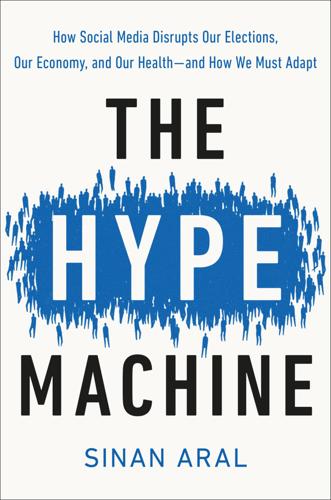
The Hype Machine: How Social Media Disrupts Our Elections, Our Economy, and Our Health--And How We Must Adapt
by
Sinan Aral
Published 14 Sep 2020
But it was also a cauldron of misinformation about impending national lockdowns and false cures, nationalistic finger-pointing between the United States and China, and foreign interference designed to fan the flames of our fears. Privacy debates took on new meaning during the COVID crisis as the threat of “surveillance capitalism” morphed into lifesaving “disease surveillance.” Facebook wasn’t surveilling for profit during COVID; it was filling gaps in inadequate national disease surveillance programs with scalable symptom surveys that identified the pandemic’s spread. At the same time, Google, Apple, and MIT developed Bluetooth-based contact tracing systems that would alert users who opted in if they had come in close physical proximity to the Bluetooth-enabled device of a COVID carrier.
…
In the end, we’ll get out of this wave of innovation what we put into it. If we use this technology in positive, egalitarian ways, we can promote positive social change and create substantial social and economic value. But if we are not careful, we can also inadvertently create an unequal, authoritarian world in which surveillance capitalism directs our behavior toward corporate and governmental ends, without regard for the social and economic implications. As we influence each other, through word and deed online, we continue to create the digital world we inhabit. And eventually, we’ll reap what we have sown. By studying the laws, we can understand how governments attempt to correct the market failures created by the Hype Machine and examine what effect regulations have on business, politics, and society.
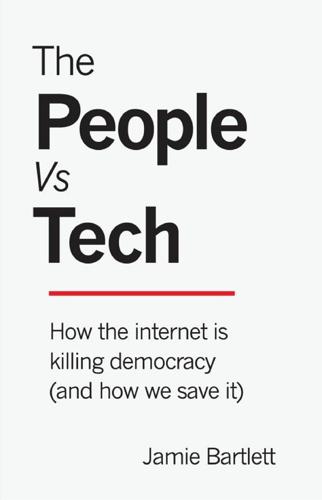
The People vs Tech: How the Internet Is Killing Democracy (And How We Save It)
by
Jamie Bartlett
Published 4 Apr 2018
Doing it through tech allows them to add a glossy veneer of progress on top of some very familiar behaviour. Over the years, the big tech firms have very carefully cultivated the Californian Ideology: even though they are massive multi-billion-dollar corporations with huge PR teams, they pitch themselves as anti-establishment; even though they are built on a model of data extraction and surveillance capitalism, they purport to be promoting exciting and liberating technology; even though they are dominated by rich white guys, they talk of social justice and equality. I sometimes think it must be very confusing to be Mark Zuckerberg. In 2014, only 2 per cent of Facebook staff were black and less than a third were women.
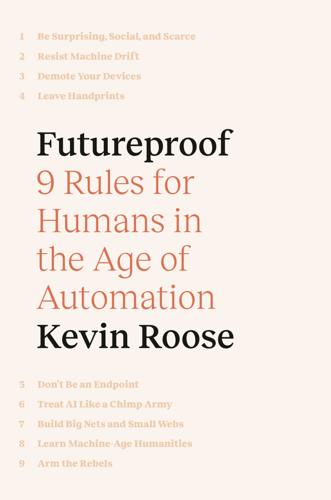
Futureproof: 9 Rules for Humans in the Age of Automation
by
Kevin Roose
Published 9 Mar 2021
The book that kicked off the futurist craze, and still one of the best examples of writing about the psychological effects of technological change. The Human Use of Human Beings by Norbert Wiener (1950). An examination of the morality of machines, written by one of my all-time favorite technological thinkers. In the Age of the Smart Machine by Shoshana Zuboff (1988). Zuboff is better known these days as the author of Surveillance Capitalism, but her earlier book was a prescient look at the future of work during the first IT boom of the 1980s. Notes Introduction I got my first glimpse Kevin Roose, “The Hidden Automation Agenda of the Davos Elite,” New York Times, January 25, 2019. Aristotle mused that automated weavers Sean Carroll, “Aristotle on Household Robots,” Discover, September 28, 2010.
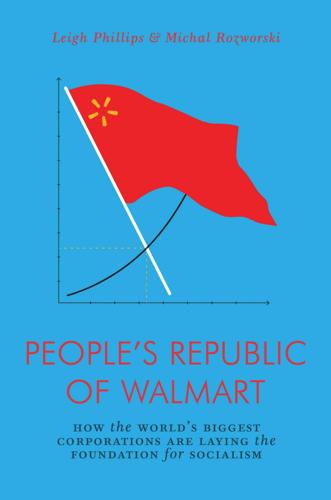
The People's Republic of Walmart: How the World's Biggest Corporations Are Laying the Foundation for Socialism
by
Leigh Phillips
and
Michal Rozworski
Published 5 Mar 2019
The locations of forward operating bases in Helmand Province, Afghanistan, were there for anyone to observe. Ruser even spotted GPS points in the Antarctic that appeared not to correlate to any known research installation. “Is there a hidden base?” he half-joked. Can we leap over the dichotomy of surveillance capitalism versus surveillance communism? Could a major goods distributor such as Amazon or a social network like Facebook be built as an international nonprofit cooperative, democratically controlled by a society independent of both the market and the state? We admit that these are difficult questions to which we don’t have answers.

Blockchain Chicken Farm: And Other Stories of Tech in China's Countryside
by
Xiaowei Wang
Published 12 Oct 2020
I think of him and his lifelong awareness of being watched. We have a sense of how entangled we are in a culture of surveillance and, especially these days, how that culture proliferates with smart devices like Alexa in our homes, or as we spew clever quips on social media. The awareness of surveillance capitalism grows. Yet as a tactic of policing, surveillance has always been crucial in making criminality throughout history, drawing a line between those on the so-called right and wrong sides of society. And this line drawing is enabled by distilling life into arbitrary parts: class, race, gender, with the line of criminality itself constantly shifting throughout time, serving political-economic crises.

Survival of the Richest: Escape Fantasies of the Tech Billionaires
by
Douglas Rushkoff
Published 7 Sep 2022
Although the company was wildly successful and profitable simply from putting a few “sponsored links” next to its search results, investors wanted more. Luckily for them, every web search conducted by Google’s billions of users also generates a surplus of “collateral data”—whole histories of searches and clicks and other information the company didn’t care much about. As Shoshana Zuboff chronicled in her book Surveillance Capitalism , instead of simply continuing to deliver search results to users, Google got into the even more profitable business of delivering user data to its real customers—the market researchers seeking to target users and manipulate their behavior. Likewise, Mark Zuckerberg left college to pursue his (probably borrowed ) dream of building an online social network for college students to make friends and get dates.

Equality
by
Darrin M. McMahon
Published 14 Nov 2023
On the latter point, and what she calls “cordoned lives,” see also the perceptive comments of Anne Phillips, Unconditional Equals (Princeton, NJ: Princeton University Press, 2021), 12–13. 25. Shoshanna Zuboff, “Caveat Usor: Surveillance Capitalism as Epistemic Inequality,” in After the Digital Tornado: Networks, Algorithms, Humanity, ed. Kevin Werbach (Cambridge: Cambridge University Press, 2020), 174–214 (esp. 180). And see, more broadly, Shoshanna Zuboff, The Age of Surveillance Capitalism: The Fight for a Human Future at the New Frontier of Power (New York: Public Affairs, 2020). 26. See, for example, “Rising Inequality Risks Regional Collapse and Climate Catastrophe,” Earth4All, www.earth4all.life/news/book-launch. 27.
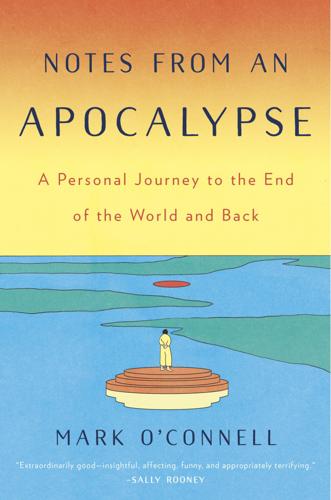
Notes From an Apocalypse: A Personal Journey to the End of the World and Back
by
Mark O'Connell
Published 13 Apr 2020
Like Vicino’s bunkers, this seemed to me to represent a radical acceleration of the mechanisms by which our civilization was already driven. Thiel, in this sense, loomed particularly large. Through his data analytics company Palantir, he was a presiding presence in the increasingly oppressive, though only fleetingly visible, environment of surveillance capitalism. He was known for his extreme libertarian views. “I no longer believe,” he had once written, “that freedom and democracy are compatible.” His conception of freedom had less to do with existential liberty, with meaningful human lives within flourishing communities, than it had to do with not having to share resources—the freedom of wealthy people from taxation, from any obligation to materially contribute to society.
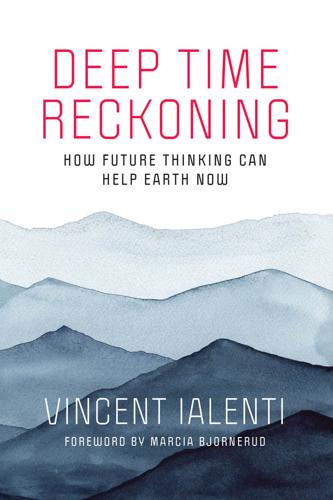
Deep Time Reckoning: How Future Thinking Can Help Earth Now
by
Vincent Ialenti
Published 22 Sep 2020
For others, faith in military experts had flagged since the United States invaded Iraq based on false pretenses about weapons of mass destruction. For some, faith in intelligence experts had been stunted since Edward Snowden publicly leaked the US National Security Agency’s massive global surveillance operations. For others, faith in big data science was losing its luster, now associated with digital privacy losses and surveillance capitalism. Skepticism was surely warranted in the wake of these grave failures of expertise and breaches of public trust. However, as the months and years went on, all sorts of claims to expert knowledge were increasingly written off as mere pompous elitism. Come the 2016 presidential election, nationalist-populist movements would clamor loudly against technocrats, bureaucrats, globalists, and the so-called deep state.
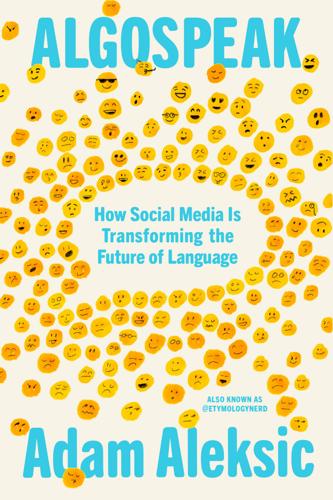
Algospeak: How Social Media Is Transforming the Future of Language
by
Adam Aleksic
Published 15 Jul 2025
As Glenn McDonald pointed out, algorithms don’t actually need labels like “goblincore” to know that you’re a goblincore person; they can tell that by turning your behavior into more convenient strings of numbers and then comparing that with other users’ behaviors. As a word, “goblincore” is simply a by-product of surveillance capitalism. Creators and companies desperately trying to reach their audience in a terminally enshittified environment are constantly striving for ever more metadata to get there, which inadvertently ends up giving the algorithm more numbers to work with. The fact that algorithms are pushing more addicting content means that more addicting language is also proliferating.
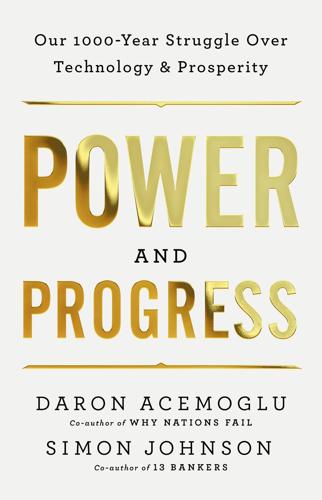
Power and Progress: Our Thousand-Year Struggle Over Technology and Prosperity
by
Daron Acemoglu
and
Simon Johnson
Published 15 May 2023
ProPublica, December 19. www.propublica.org/article/leaked-documents-show-how-chinas-army-of-paid-internet-trolls-helped-censor-the-coronavirus. Zuboff, Shoshana. 1988. In the Age of the Smart Machine: The Future of Work and Power. New York: Basic Books. Zuboff, Shoshana. 2019. The Age of Surveillance Capitalism: The Fight for a Human Future at the New Frontier of Power. London: Profile Books. Zweig, Stefan. 1943. The World of Yesterday. Translated by Benjamin W. Huebsch and Helmut Ripperger. New York: Viking. Acknowledgments This book builds on two decades of research that we have conducted on technology, inequality, and institutions.
…
Power and Progress is the blueprint we need for the challenges ahead: technology only contributes to shared prosperity when it is tamed by democratic rights, values, principles, and the laws that sustain them in our daily lives.” —Shoshana Zuboff, Charles Edward Wilson Professor Emerita, Harvard Business School, and author of The Age of Surveillance Capitalism
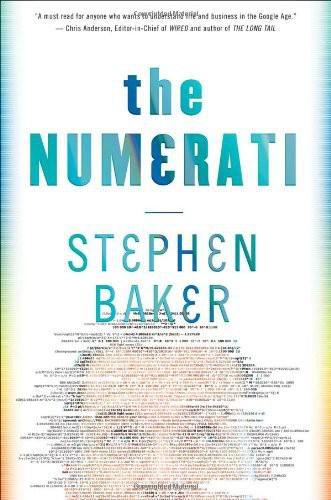
The Numerati
by
Stephen Baker
Published 11 Aug 2008
Barnes & Noble Books, 2005 (originally published in 1911) * * * Index Accenture (company), [>]–[>], [>]–[>], [>]–[>], [>] Acxiom (company), [>]–[>] AdSense (Google service), [>] Advertisers, [>] calculating rate of return for, [>], [>] changes in methods of, [>]—[>], [>], [>], [>]–[>] customer lists shared by, [>], [>], [>]–[>], [>] and the Internet, [>]–[>], [>]–[>], [>], [>]–[>], [>], [>] microtargeting by, [>], [>], [>] and retail stores, [>]–[>], [>], [>], [>], [>], [>] selling our own data to, [>] See also "Buckets"; Shoppers; "Tribes" African American voters, [>] Age (generations) distinguishing, through word analysis, [>]–[>], [>], [>] on online dating questionnaire, [>]–[>] Alamo Rent A Car, [>]–[>], [>]–[>], [>], [>] Algorithms for analyzing patients, [>], [>], [>] for analyzing shoppers, [>], [>]–[>] for analyzing terrorists, [>]–[>], [>], [>] for analyzing voters, [>], [>], [>] for biological analysis, [>], [>] dating services' use of, [>], [>], [>], [>]–[>], [>], [>] defined, [>]–[>], [>]–[>] as Numerati tool, [>], [>], [>]–[>], [>], [>]–[>], [>], [>]–[>] Alhazmi, Nawaf, [>]–[>] Allen, Paul, [>] AllianceTech (company), [>] Almihdhar, Khalid, [>]–[>] Al Qaeda, [>], [>], [>], [>] Alzheimer's disease, [>], [>], [>], [>], [>] Amazon.com, [>], [>], [>], [>], [>] Andresen, Dan, [>]–[>], [>] ANNA (privacy software), [>] Anthropologists, [>]–[>], [>]–[>], [>], [>], [>] AOL (company), [>]–[>] Applebee's America (Dowd), [>], [>], [>] Arnold, Douglas, [>] Artificial intelligence, [>]–[>] See also Computers; Machine learning ASWORG, [>]–[>] AttentionTrust (company), [>] Baker, Mary Jane and Walter (author's parents), [>]–[>], [>], [>], [>], [>]–[>] Baker, Stephen, [>]–[>], [>]–[>] "Barnacle" shoppers, [>]–[>], [>] "Barn Raisers" tribe, [>], [>], [>], [>], [>], [>], [>] Bartering, [>] Baseball Prospective (website), [>] Baseball statistics, [>]–[>] BBN (company), [>] Bed sensors, [>], [>], [>] Behavior altering, [>]–[>], [>]–[>] predicting, [>], [>]–[>], [>], [>]–[>], [>], [>], [>], [>], [>], [>], [>]–[>], [>]–[>], [>] proxies for, [>], [>]–[>], [>] tracking of cell phone users', [>]–[>] tracking of elderly people's, [>]–[>] tracking of Internet users', [>]–[>], [>]–[>], [>], [>] tracking of terrorists', [>]–[>] tracking shoppers' patterns of, [>]–[>], [>] See also Data; Mathematical models "Behavioral markers," [>] Beltran, Carlos, [>]–[>], [>] Bin Laden, Osama, [>], [>] Biology and biologists, [>], [>], [>], [>], [>], [>], [>]–[>], [>]–[>], [>], [>] See also DNA; Genetics Black, Fischer, [>] The Black Swan (Taleb), [>] Bloggers, [>]–[>] Bluetooth data connections, [>]–[>] "Bootstrapper" tribe, [>]–[>] "Bootstrapping," [>] Brands, [>], [>], [>] Brin, Sergey, [>] Britain, [>] "Buckets," [>]–[>], [>], [>], [>]–[>], [>], [>], [>], [>], [>], [>] See also "Tribes" "Builders" (personality type), [>]–[>] Bush, George W., [>], [>]–[>], [>], [>]–[>], [>], [>] BusinessWeek (magazine), [>], [>] "Butterfly" shoppers, [>], [>] BuzzMetrics (company), [>], [>] Cameras (surveillance) at Accenture, [>], [>]–[>] in casinos, [>]–[>] in homes of the elderly, [>]–[>], [>] in public places, [>], [>], [>]–[>], [>]–[>] See also Facial recognition; Photos; Surveillance Capital IQ, [>], [>] Capital One, [>] Carbonell, Jaime, [>] Carbon nanotube, [>] Carley, Kathleen, [>]–[>] Carnegie Mellon University (CMU), [>], [>]–[>], [>]–[>], [>]–[>], [>] Casablanca (movie), [>] Casinos, [>]–[>], [>] Cavaretta, Michael, [>] Cell phones Bluetooth technology for, [>]–[>] data produced by, [>], [>], [>], [>]–[>] technical issues associated with, [>] tracking use of, [>], [>], [>]–[>] Central Intelligence Agency.
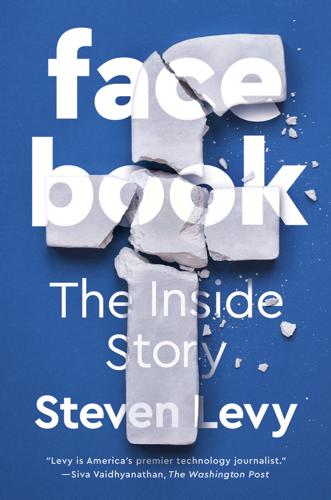
Facebook: The Inside Story
by
Steven Levy
Published 25 Feb 2020
Analog Research Lab: Background comes from personal interviews and David Cohen, “A Look at the Analog Research Lab, the Source of All of Those Posters in Facebook’s Offices,” Adweek, February 6, 2019; “Ben Barry Used to be Called Facebook’s Minister of Propaganda,” Typeroom, June 26, 2015; Steven Heller, “The Art of Facebook,” The Atlantic, May 16, 2013; and Fred Turner, “The Arts at Facebook: An Aesthetic Infrastructure for Surveillance Capitalism,” Poetics, March 16, 2018. in its original sense: I helped circulate this definition by my own book Hackers (Anchor Press/Doubleday, 1984). younger people were . . . smarter: Mark Coker, “Startup Advice for Young Entrepreneurs from Y Combinator,” VentureBeat, March 26, 2007. he gathered the company: Jessica E.
…
US 8,825,764 B2 with Michael Nowak, San Francisco, CA (US); Dean Eckles, Palo Alto, CA (US) as inventors. The date of patent is September 2, 2014. While it’s unclear how this specific technique was employed, a detailed discussion of Facebook’s data mining is found in Shoshana Zuboff, The Age of Surveillance Capitalism: The Fight for a Human Future at the New Frontier of Power (New York: Public Affairs, 2019). “Entity Graph”: This was described to me by Cameron Marlow, who was once head of Facebook’s Data Science team. the most controversial study: Adam D. I. Kramer, Jamie E. Guillory, and Jeff T.
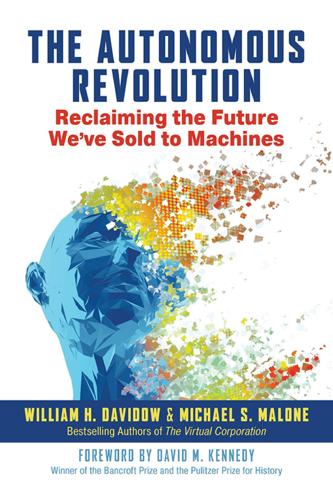
The Autonomous Revolution: Reclaiming the Future We’ve Sold to Machines
by
William Davidow
and
Michael Malone
Published 18 Feb 2020
,” The Economist, May 31, 2018, https://www.economist.com/leaders/2018/05/31/does-chinas-digital-police-state-have-echoes-in-the-west. 2. “More Data and Surveillance Are Transforming Justice Systems,” The Economist,, June 2, 2018, https://www.economist.com/technology-quarterly/2018-05-02/justice. 3. Shoshana Zuboff, The Age of Surveillance Capitalism (New York: Public Affairs, 2019), 282–290. 4. Surveillance-Video, product catalog, https://www.surveillance-video.com/license-plate-cameras/ (accessed June 27, 2019). 5. Will Oremus, “Forget Security Cameras. Stores Are Using Face Recognition to See If You’re a Shoplifter,” Slate, November 24, 2015, http://www.slate.com/blogs/moneybox/2015/11/24/stores_are_using_face_recognition_to_catch_shoplifters.html (accessed June 27, 2019). 6.

Infinite Detail
by
Tim Maughan
Published 1 Apr 2019
Connection error. A string of undecipherable numbers and letters. “You make me so fucking angry sometimes. I mean, I fucking get it, you hate Apple, you hate the Internet, you hate fucking everything. You don’t want to put photos on iCloud because it’s not safe, privacy blah fucking blah, surveillance capitalism blah blah, you’re so fucking self-righteous—” “Scott! Listen to me! I didn’t touch the fucking photos! There’s a problem with the server, that’s all. Didn’t you have them backed up locally anyway?” He knows, the second the last word leaves his mouth, that it’s the wrong thing to have said.
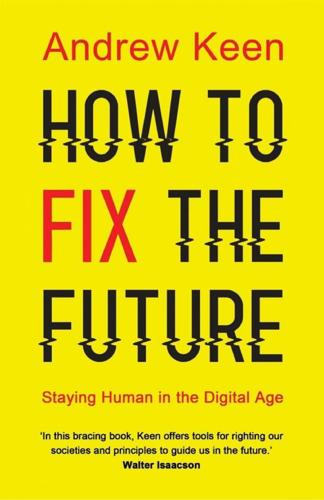
How to Fix the Future: Staying Human in the Digital Age
by
Andrew Keen
Published 1 Mar 2018
At first I was part of a small group of dissenting authors who challenged the conventional wisdom about the internet’s beneficial impact on society. But over the last few years, as the zeitgeist has zigged from optimism to pessimism about our technological future, more and more pundits have joined our ranks. Now everyone, it seems, is penning polemics against surveillance capitalism, big data monopolists, the ignorance of the online crowd, juvenile Silicon Valley billionaires, fake news, antisocial social networks, mass technological unemployment, digital addiction, and the existential risk of smart algorithms. The world has caught up with my arguments. Nobody calls me the Antichrist anymore.

Superbloom: How Technologies of Connection Tear Us Apart
by
Nicholas Carr
Published 28 Jan 2025
And, a further relief, you don’t have to worry that your body language is sending the wrong signal or otherwise betraying you. Socializing through apps reduces the sense of personal exposure while heightening the sense of personal control. On your phone, you feel like a little Oz behind a curtain. In her richly researched book The Age of Surveillance Capitalism, Shoshana Zuboff, a professor emerita at the Harvard Business School, argues that we didn’t enter the virtual world of our own volition. We were kidnapped. She documents the myriad ways internet companies purloin our personal data and then use it to manipulate us, hijacking our attention to keep us glued to the screen.
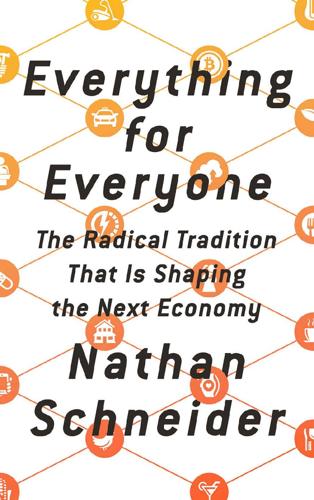
Everything for Everyone: The Radical Tradition That Is Shaping the Next Economy
by
Nathan Schneider
Published 10 Sep 2018
Julia Cartwright, Jean François Millet: His Life and Letters (Swan Sonnenschein, 1902), 177; for an exploration of the economic significance of gleaning in Jewish tradition, see Joseph William Singer, The Edges of the Field: Lessons on the Obligations of Ownership (Beacon Press, 2000). 13. See Anna Bernasek and D. T. Mongan, All You Can Pay: How Companies Use Our Data to Empty Our Wallets (Nation Books, 2015); Nick Couldry, “The Price of Connection: ‘Surveillance Capitalism,’” Conversation (September 22, 2016); Virginia Eubanks, Automating Inequality: How High-Tech Tools Profile, Police, and Punish the Poor (St. Martin’s Press, 2018); Frank Pasquale, The Black Box Society: The Secret Algorithms That Control Money and Information (Harvard University Press, 2015); Astra Taylor, The People’s Platform: Taking Back Power and Culture in the Digital Age (Metropolitan Books, 2014); Joseph Turow et al., The Tradeoff Fallacy: How Marketers Are Misrepresenting American Consumers and Opening Them Up to Exploitation, report from the Annenberg School for Communication at the University of Pennsylvania (June 2015); James Joyce quoted from Finnegans Wake in Marshall McLuhan, The Gutenberg Galaxy: The Making of Typographic Man (University of Toronto Press, 1962), 278. 14.

Forward: Notes on the Future of Our Democracy
by
Andrew Yang
Published 15 Nov 2021
Every once in a while you get a message from a company or site saying, “It would be a really good idea if you were to change your password,” and you feel concerned. Also sometimes you might see a news story about a company that you use, like Yahoo, getting hacked. But the repercussions and impact of our data being harvested to this extreme are significantly worse than most people realize. First, it has led to “surveillance capitalism”—a term coined by the Harvard professor Shoshana Zuboff—in which companies have an incentive to keep feeding us advertisements and keep track of us to the point where our attention is being bought and sold. Our email exchanges, direct messages, likes and clicks, and even phone conversations and voice commands are incorporated into building a profile that is used to target us no matter where we are.
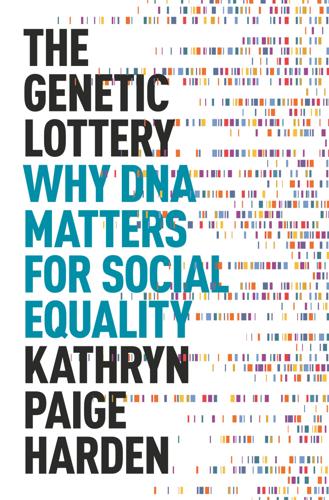
The Genetic Lottery: Why DNA Matters for Social Equality
by
Kathryn Paige Harden
Published 20 Sep 2021
Conley avows that he’s particularly excited about polygenic indices—because including them as control variables in statistical analyses allows one to “obtain better-specified, less-biased parameter estimates for [environmental] variables.”32 While the media discusses behavioral genetic research in terms of designer babies and surveillance capitalism, the researchers who are creating and working with polygenic indices for traits such as education are geeking out about control variables and less-biased parameter estimates. Discussions of control variables don’t have the same dark allure as discussions of designer babies. But much of the potential for genetic research to improve human lives resides here, in thinking about doing better social science research.

Ghost Road: Beyond the Driverless Car
by
Anthony M. Townsend
Published 15 Jun 2020
Goldwyn, “An Informal Transit System Hiding in Plain Sight: Brooklyn’s Dollar Vans and Transportation Planning and Policy in New York City” (PhD diss., Columbia University, 2017), 96. 100hauling upwards of 35,000 workers on 800 vehicles: Eillie Anzilotti, “The Reach of the Bay Area’s ‘Tech Buses,’” CityLab, September 16, 2016, https://www.citylab.com/transportation/2016/09/the-reach-of-the-bay-areas-tech-buses/500435/. 101“able to provide point-to-point service”: Christopher Alexander, A Pattern Language: Towns, Buildings, Construction (New York: Oxford University Press, 1977), 112. 101gone back to the public-transit lines: Laura Bliss, “Bridj Is Dead, but Microtransit Isn’t,” CityLab, May 3, 2017, https://www.citylab.com/tran sportation/2017/05/bridj-is-dead-but-microtransit-isnt/525156/. 102causing traffic and creating safety risks for pedestrians: Georgios Kalogerakos, “Driverless Mobilities: Understanding Mobilities of the Future” (master’s thesis, Aalborg University, 2017), 79. 102More than 12,000 people rode the six shuttles: “City Overview: Trikala,” CityMobil2, accessed June 13, 2018, http://www.citymobil2.eu/en/city-activities/large-scale-demonstration/trikala/(site discontinued). 102more accepting of the technology than were townspeople in France: City-Mobil2, Experience and Recommendations (CityMobil2, 2016), 32. 103a stylish name—the Navia: Melissa Riofrio, “The Little Shuttle That Can: Induct Navia Is First Self-Driving Vehicle,” PC World, January 8, 2014, https://www.pcworld.com/article/2085006/the-little-shuttle-that-can-induct-navia-is-first-self-driving-vehicle.html. 103the company filed for bankruptcy: Derek Christie et al., “Pioneering Driverless Electric Vehicles in Europe: The City Automated Transport Systems (CATS),” Transportation Research Procedia 13 (2016): 30–39, https://hal.inria.fr/hal-01357309/document. 103a completely redesigned vehicle: “Sion, CH Is Piloting AVs,” Initiative on Cities and Autonomous Vehicles, Bloomberg Philanthropies, accessed February 20, 2019, https://avsincities.bloomberg.org/global-atlas/europe/ch/sion-ch; “Project ‘SmartShuttle,’” PostBus, accessed February 2019, https://www.postauto.ch/en/project-smartshuttle. 103driverless shuttles crawled along: “These 61 Cities Are Piloting AVs for Transit,” Initiative on Cities and Autonomous Vehicles, Bloomberg Philanthropies, accessed February 2019, https://avsincities.bloomberg.org/global-atlas/tags/transit. 104ferried more than 1.5 million passengers: National League of Cities, “Sustainability: Weaving a Microtransit Mesh,” Autonomous Vehicles: Future Scenarios, accessed April 12, 2019, http://avfutures.nlc.org/sustainability. 104sold more than 100 Armas and went public: “Navya Updates Its 2018 Revenue Target,” Navya, December 7, 2018, https://navya.tech/en/press/navya-updates-its-2018-revenue-target/. 105cut operating costs by as much as 40 percent: National League of Cities, “Sustainability: Weaving a Microtransit Mesh.” 106a “curb kiss” fee: Michael Cabanatuan and Kurtis Alexander, “Google Bus Backlash: S.F. to Impose Fees on Tech Shuttles,” SFGate, January 21, 2014, https://www.sfgate.com/bayarea/article/Google-bus-backlash-S-F-to-impose-fees-on-tech-5163759.php. 107a planned driverless-shuttle network: City of Bellevue, Washington, and City of Kirkland, Washington, “A Flexible, Electric, Autonomous Commutepool System,” Bellevue-Kirkland USDOT (grant proposal, 2018). 108leftover data has value in predicting human behavior: Shoshana Zuboff, Surveillance Capitalism (New York: Public Affairs, 2019). 109launched its own MaaS effort in 2019: Adele Peters, “In Berlin, There’s Now One App to Access Every Mode of Transportation,” Fast Company, February 18, 2019, https://www.fastcompany.com/90308234/in-berlin-theres-now-one-app-to-access-every-mode-of-transportation. 109draws on a highly successful deployment in Vilnius: Douglas Busvine, “From U-Bahn to E-Scooters: Berlin Mobility App Has It All,” Reuters, September 24, 2019, https://www.reuters.com/article/us-tech-berlin/from-u-bahn-to-e-scooters-berlin-mobility-app-has-it-all-idUSKBN1W90MG. 110the role of mobility-service integrator: Peters, “In Berlin.” 110off to a slow start selling subscriptions: Julia Walmsley, “Watch Out, Uber.
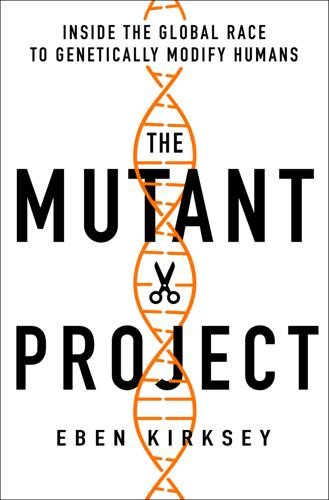
The Mutant Project: Inside the Global Race to Genetically Modify Humans
by
Eben Kirksey
Published 10 Nov 2020
On the other hand, venture capitalists have a bad history of producing social, economic, and political problems rather than solving them.2 Apple’s iPhone led to factories with appalling work conditions in Shenzhen. Google and Facebook brought us the benefits of social media along with fake news and surveillance capitalism. As Aaron told me more stories—shot through with boundless optimism and promise—I wondered how his venture would actually be different from more established enterprises. Aaron claimed that genetic technology would bring revolutionary changes to medicine, society, and life itself. “Mainstream medicine is nothing more than an enslavement to the chronic management of a disease,” Aaron told me.
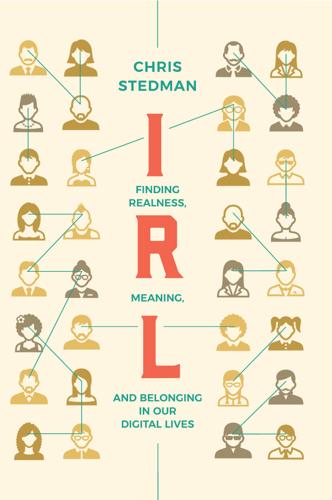
IRL: Finding Realness, Meaning, and Belonging in Our Digital Lives
by
Chris Stedman
Published 19 Oct 2020
They thus fused these pieces of our self-exploration and discovery with their efforts to sell us things. While the self under capitalism has always been influenced by its norms, the internet has taken it to new heights. Largely operating covertly already, the fingerprints of capitalism completely disappeared in the early digital years. However, even in all of this, it’s debatable how much surveillance capitalism actually understands us. The tools that track us base their understanding of us on what we share online, which we’ve been told time and time again is less real or not real. So without the full picture, they continue to nudge us in the direction of the simplified versions of ourselves we sometimes share online.
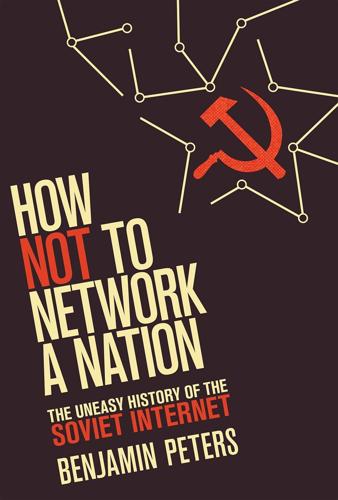
How Not to Network a Nation: The Uneasy History of the Soviet Internet (Information Policy)
by
Benjamin Peters
Published 2 Jun 2016
Both international and internal critics, including the British organizational cyberneticist Stafford Beer, were critical of Soviet management techniques.7 More than a network, the OGAS Project as formulated by Glushkov outlines a daring technocratic economic imagining that was meant to operate in a future Soviet information society by digitizing, supervising, and optimizing the coordination challenges besetting the national command economy. The associated costs and scale of such a supercharged system were accordingly colossal. Glushkov captured the sentiment of network effects, which is still alive in surveillance capitalism’s promotion of big data today, in this phrase: “world practice shows that the larger the object for which an information-management system is created, the greater its economic effect.”8 More than komchamstvo, or Lenin’s term for “Communist boasting,” the basic OGAS blueprint affirms its staggering magnitude.

The Nanny State Made Me: A Story of Britain and How to Save It
by
Stuart Maconie
Published 5 Mar 2020
By privatising not just industries but all the risks formerly dealt with by a benevolent state – vaccinations, ill health, unemployment or workplace injury – the new system forced everybody to start calculating risks at the front of their minds in a way my parents’ generation never had to. All this leads to a kind of evaporation of consent for democracy as surveillance capitalism and algorithmic control by big corporations grows. Loss of faith in human self. That’s what we’ve got to get back. You can fight it.’ In his book, Clear Bright Future, Mason outlines some of the small but crucial ways you can fight back against the rise of the machines and the tyranny of the algorithm: never use the automated checkouts, always wait for an assistant, look your barista in the eye and engage with them, not your phone.

Human Compatible: Artificial Intelligence and the Problem of Control
by
Stuart Russell
Published 7 Oct 2019
For details on Stasi files, see Cullen Murphy, God’s Jury: The Inquisition and the Making of the Modern World (Houghton Mifflin Harcourt, 2012). 3. For a thorough analysis of AI surveillance systems, see Jay Stanley, The Dawn of Robot Surveillance (American Civil Liberties Union, 2019). 4. Recent books on surveillance and control include Shoshana Zuboff, The Age of Surveillance Capitalism: The Fight for a Human Future at the New Frontier of Power (PublicAffairs, 2019) and Roger McNamee, Zucked: Waking Up to the Facebook Catastrophe (Penguin Press, 2019). 5. News article on a blackmail bot: Avivah Litan, “Meet Delilah—the first insider threat Trojan,” Gartner Blog Network, July 14, 2016. 6.

Permanent Record
by
Edward Snowden
Published 16 Sep 2019
If most of what people wanted to do online was to be able to tell their family, friends, and strangers what they were up to, and to be told what their family, friends, and strangers were up to in return, then all companies had to do was figure out how to put themselves in the middle of those social exchanges and turn them into profit. This was the beginning of surveillance capitalism, and the end of the Internet as I knew it. Now, it was the creative Web that collapsed, as countless beautiful, difficult, individualistic websites were shuttered. The promise of convenience led people to exchange their personal sites—which demanded constant and laborious upkeep—for a Facebook page and a Gmail account.

The Glass Half-Empty: Debunking the Myth of Progress in the Twenty-First Century
by
Rodrigo Aguilera
Published 10 Mar 2020
If you learn that rate-rigging and regulatory failures are systemic, but stay quiet, well, perhaps you have shown that you are genuinely reliable and deserve membership of the club.30 Yet it is telling that Google, once the brainchild of a pair of scruffy Stanford geeks whose motto was “Don’t be evil”, is now one of the most terrifying examples of so-called “surveillance capitalism”, seemingly hell-bent on accumulating (and profiting from) all the information it can get its hands on. In 2015 the company finally ditched the original motto since the hypocrisy was just too obvious, and at least, according to one account was actually being taken seriously by some of the company’s staff.31 That these excesses can be reined in by the power of free markets to discipline its worst offenders is undoubtedly one of the most damaging myths peddled by the advocates of laissez-faire.
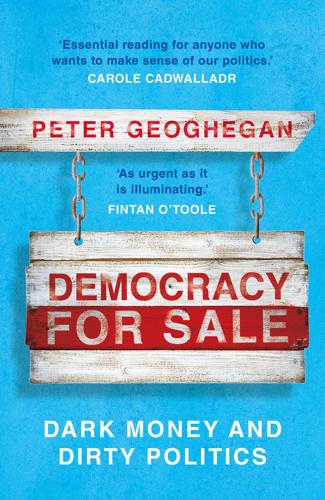
Democracy for Sale: Dark Money and Dirty Politics
by
Peter Geoghegan
Published 2 Jan 2020
The Chinese state has developed a social credit system that aims to monitor and evaluate citizens’ behaviour in real time. In America, most schoolchildren use Google’s education apps, which can track everything from how many times they go to the bathroom to how long they spend on specific exercises.1 (And, of course, Google collects all the data.) Moore told me that if democracy is to survive in an age of surveillance capitalism, two very different things need to change: the laws that govern politics, and how we conceive of democracy itself. “Our regulations need to be updated for the digital age,” he said. “But electoral laws are not the only thing. We need to rethink how we do liberal democracy. We need to ask what kind of democracy we want to live in.

Filterworld: How Algorithms Flattened Culture
by
Kyle Chayka
Published 15 Jan 2024
But it has only become more entrenched. As digital platforms have expanded, the homogeneity they cause has spread, too. Filterworld and its slick sameness can induce a breathtaking, near-debilitating sense of anxiety. The sameness feels inescapable, alienating even as it is marketed as desirable. “Surveillance capitalism,” as the scholar Shoshana Zuboff has labeled it, is how tech companies monetize the constant absorption of our personal data, an intensification of the attention economy. And yet for all that data, algorithmic feeds oftentimes misunderstand us, connecting us to the wrong people or recommending the wrong kinds of content, encouraging habits that we don’t want.
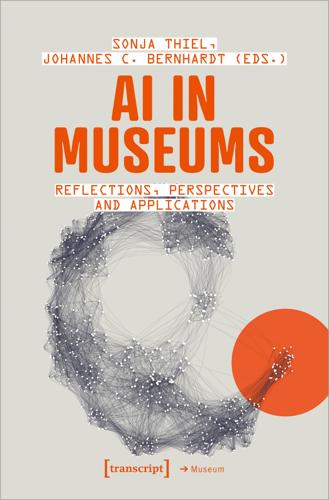
AI in Museums: Reflections, Perspectives and Applications
by
Sonja Thiel
and
Johannes C. Bernhardt
Published 31 Dec 2023
Available online at https://doi.org/10.1080/13500775 .2019.1638019. Wittkower, Dylan E. (2017). Technology and Discrimination. In: Joseph C. Pitt/ Ashley Shew (Eds). Spaces for the Future: A Companion to Philosophy and Technology. London, Routledge, 37–64. https://doi.org/10.4324/9780203735657. Zuboff, Shoshana (2019). The Age of Surveillance Capitalism: The Fight for a Human Future at the New Frontier of Power. London, Profile Books. Managing AI Developing Strategic and Ethical Guidelines for Museums Sonja Thiel How can a strategy and ethical guidelines be developed for the use of AI in museums? Based on the Creative User Empowerment1 project, in which many management and ethical issues have been discussed, this paper presents lessons learned and guiding principles and questions that can be used as a starting point for the ethics and management of AI solutions in museums.

Mood Machine: The Rise of Spotify and the Costs of the Perfect Playlist
by
Liz Pelly
Published 7 Jan 2025
It’s fair to assume that every click that you’ve made in the app has been logged somewhere, whether or not it’s actively being used to make the recommendations. You should be under the assumption that any interaction you have within the Spotify app is going to be recorded.” As a twenty-first-century social media user, familiar with the basic concepts of surveillance capitalism—what the author Shoshana Zuboff calls “a new economic order that claims human experience as free raw material for hidden commercial practices of extraction, prediction, and sales”—I conceptually know that this is true, that every click is a tracked transaction creating value for the platform.
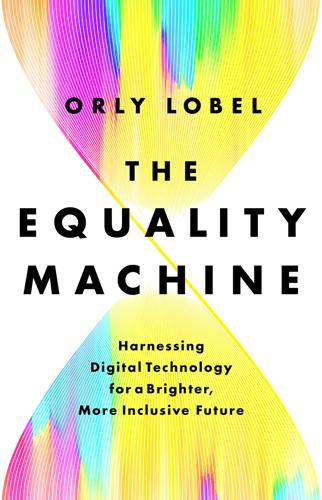
The Equality Machine: Harnessing Digital Technology for a Brighter, More Inclusive Future
by
Orly Lobel
Published 17 Oct 2022
But technological advances can be—and often are—in service of inclusion and empowerment; it’s all about making deliberate choices. We constantly hear horror stories about technology gone wrong, biased AI, and a looming dystopian human-machine future. Bestsellers with titles like Weapons of Math Destruction, Algorithms of Oppression, Automating Inequality, Technically Wrong, Surveillance Capitalism, and Invisible Women: Data Bias in a World Designed for Men all sound the alarm about how new technology can diminish, exclude, and perpetuate inequality. And they aren’t wrong. As we shall see, the reasons for technological inequities are varied, ranging from bad data fed into systems by engineers to autonomous learning and replication by machines of our existing societal disparities to unethical corporate decisions and biased design choices.

The Mysterious Mr. Nakamoto: A Fifteen-Year Quest to Unmask the Secret Genius Behind Crypto
by
Benjamin Wallace
Published 18 Mar 2025
A growing blockchain-forensics industry was eroding the persistent myth of Bitcoin’s privacy as a parade of hackers, embezzlers, and conmen were doxed and arrested. A new generation who’d never heard of the cypherpunks had grown up absorbing their values—witnessing Julian Assange’s and Edward Snowden’s revelations, becoming disillusioned about surveillance capitalism—but they tended to view Bitcoin mainly as a speculative investment instead of a useful technology. Even Bitcoin’s vaunted decentralization seemed dubious. It was virtually impossible to use without relying on third-party exchanges like Mt. Gox, which had repeatedly violated users’ trust. Mining was overwhelmingly concentrated in mining pools, and the biggest of these were located in China, the most autocratically centralized and privacy-invading country in the world.

Building and Dwelling: Ethics for the City
by
Richard Sennett
Published 9 Apr 2018
Saunders (1981) (London: Penguin Books, 1992). 11. William James, ‘Pragmatism, Action and Will’, in Pragmatism: The Classic Writings, ed. H. S. Thayer (Cambridge, Mass.: Hackett, 1982), p. 181. 12. Yochai Benkler, ‘Degrees of Freedom, Dimensions of Power’, Daedalus 145, no. 1 (2016): 20, 23. See also Shoshana Zuboff, ‘Big Other: Surveillance Capitalism and the Prospects of Information Civilization’, Journal of Information Technology 30, no. 1 (2015): 75–89, and Tim Wu, The Master Switch: The Rise and Fall of Information Empires (New York: Knopf, 2010). 13. The Burckhardt phrase appears in English in Ernst Cassirer, ‘Force and Freedom: Remarks on the English Edition of Jacob Burckhardt’s “Reflections on History”’, The American Scholar 13, no. 4 (1944): 409–10. 14.
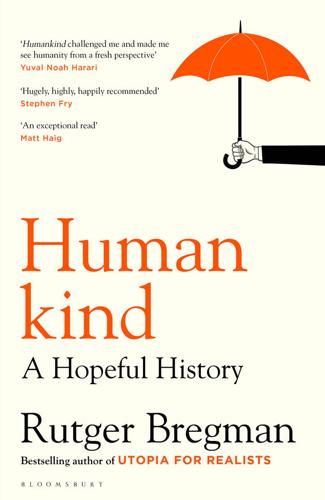
Humankind: A Hopeful History
by
Rutger Bregman
Published 1 Jun 2020
Originally published in 1944. 39Tine de Moor, ‘Homo Cooperans. Institutions for collective action and the compassionate society’, Utrecht University Inaugural Lecture (30 August 2013). 40See, for example, Paul Mason, Postcapitalism. A Guide to Our Future (London, 2015). 41See, for example, Shoshana Zuboff, The Age of Surveillance Capitalism. The Fight for a Human Future at the New Frontier of Power (London, 2019). 42Damon Jones and Ioana Elena Marinescu, ‘The Labor Market Impacts of Universal and Permanent Cash Transfers: Evidence from the Alaska Permanent Fund’, NBER Working Paper (February 2018). 43I’ve also written about this study in North Carolina and about universal basic income elsewhere.

Tools and Weapons: The Promise and the Peril of the Digital Age
by
Brad Smith
and
Carol Ann Browne
Published 9 Sep 2019
Julia Carrie Wong, “Mark Zuckerberg Apologises for Facebook’s ‘Mistakes’ over Cambridge Analytica,” Guardian, March 22, 2018, https://www.theguardian.com/technology/2018/mar/21/mark-zuckerberg-response-facebook-cambridge-analytica. Back to note reference 14. See Shoshana Zuboff, The Age of Surveillance Capitalism: The Fight for a Human Future at the New Frontier of Power (New York: PublicAffairs, 2019). Back to note reference 15. Julie Brill, “Millions Use Microsoft’s GDPR Privacy Tools to Control Their Data — Including 2 Million Americans,” Microsoft on the Issues (blog), Microsoft, September 17, 2018, https://blogs.microsoft.com/on-the-issues/2018/09/17/millions-use-microsofts-gdpr-privacy-tools-to-control-their-data-including-2-million-americans/.

Greater: Britain After the Storm
by
Penny Mordaunt
and
Chris Lewis
Published 19 May 2021
They see no reason to accept standards that previous generations endured; they see a world that has leapt into the future and a political system stuck in the past; they’re frustrated by the lack of listening and slow pace of change; unsurprisingly, they see the political system itself as the problem; they want a more modern approach. There’s a reason for repeating the phrase ‘they see’, because they really do see. It’s the first generation to be able to see really clearly the level of wrongdoing. Sure, surveillance capitalism allows those at the top to see into the lives of those below. But what’s not always understood by those at the top is that the process is reciprocal. Those at the bottom can see into the lives of those at the top. So, that’s where we start in this chapter – the problem as they see it. The need for modernisation in Britain is at its height in terms of understanding equality and the need for justice and balance.
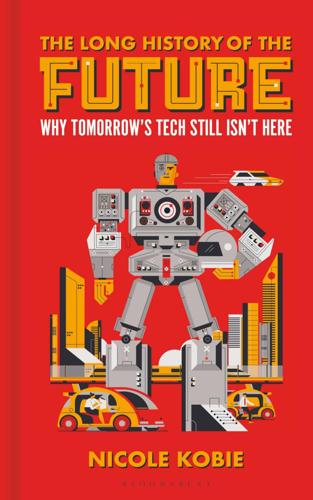
The Long History of the Future: Why Tomorrow's Technology Still Isn't Here
by
Nicole Kobie
Published 3 Jul 2024
One early critic was Jim Balsillie, best known as the one-time CEO of Research in Motion, aka RIM, the company that made BlackBerry a success and then an also-ran. Balsillie wasn’t a fan of Silicon Valley types waltzing into Canada and taking business (and the eventual profit) that he believed should be kept local, calling the project ‘a colonising experiment in surveillance capitalism attempting to bulldoze important urban, civic and political issues’. And then came the activists, led by local civics expert Bianca Wylie, who read an opinion piece by Doctoroff promoting the project and immediately took action, organising protests and making arguments to the government, media and even Sidewalk itself by attending their open-house events.
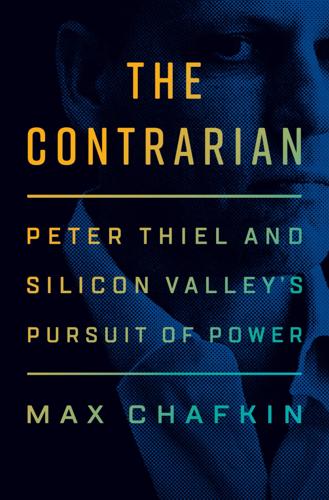
The Contrarian: Peter Thiel and Silicon Valley's Pursuit of Power
by
Max Chafkin
Published 14 Sep 2021
His first company, PayPal, pioneered ecommerce and—after being spun out of the company to which Thiel sold it, eBay—is worth nearly $300 billion, as of early 2021. Palantir, his second company, popularized the concept of data mining after 9/11 and paved the way for what critics of the technology industry call surveillance capitalism. More recently, it became a key player in the Trump administration’s immigration and defense projects. The company is worth around $50 billion; Thiel controls it and is its biggest shareholder. As impressive as this entrepreneurial resume might be, Thiel has been even more influential as an investor and backroom deal maker.

The Controlled Demolition of the American Empire
by
Jeff Berwick
and
Charlie Robinson
Published 14 Apr 2020
FACT: In the Book of Revelation [13:16-17], written about 2000 years ago, the Bible warned about being branded with an ID code: “And he causeth all, both small and great, rich and poor, free and bond, to receive a mark in their right hand, or in their foreheads: And that no man might buy or sell, save he that had the mark”. FACT: Microsoft owns International patent #060606 (#666) which is a cryptocurrency system using humans who have been chipped as the “Miners”. Surveillance capitalism is of course in line with 1984 – a George Orwell hit written 71 years ago which should have prepared the public for the reality of a Big Brother dystopia, but clearly did not. Especially if one looks at the ease with which the Coronavirus has, seemingly overnight, enabled governments all over the world to implement mass totalitarian surveillance under the auspice of creating weapons against disease.

Ways of Being: Beyond Human Intelligence
by
James Bridle
Published 6 Apr 2022
The internet is a clear example of this: it emerged from the twin poles of Cold War paranoia – distributed networks designed to withstand atomic attack and the Californian Ideology, which in the 1990s traded the hippy ideals of liberation and togetherness for technological determinism and neoliberal capitalism.21 It’s this combination of military power and corporate profit-seeking which has shaped the modern internet, writing structural violence and surveillance capitalism into its source code. Radar image showing ring angels at sunrise on 1 September 1959. But even military technologies can reveal surprising things. In the 1940s, at the height of the Second World War, British army technicians working on the very first radar systems noticed the presence of mystery echoes on their screens and readouts.

Nothing Personal: My Secret Life in the Dating App Inferno
by
Nancy Jo Sales
Published 17 May 2021
I just sat very quiet and watched, wondering how to broach the subject of this incendiary new information I’d discovered—that he loved a woman named Rowena—without letting him know that I’d found it out by committing what, once upon a time, would have been considered a serious relationship crime: going through someone’s stuff. Now, in the age of surveillance capitalism, it seemed almost taken for granted that we were all watching each other, all the time. And yet, I knew he still wouldn’t like it. Although I was keeping myself calm, I was actually mad and upset and hurt enough that I wanted to make him admit to his double life. I wanted to expose him, to punish him for lying to me.

Like, Comment, Subscribe: Inside YouTube's Chaotic Rise to World Domination
by
Mark Bergen
Published 5 Sep 2022
GO TO NOTE REFERENCE IN TEXT Muhammad as a pedophile and a brute: Later, an actress in the movie would sue, claiming she was tricked into appearing in the movie and her lines were dubbed over. The full movie never came out. GO TO NOTE REFERENCE IN TEXT circulating it more widely: Jillian C. York, Silicon Values: The Future of Free Speech Under Surveillance Capitalism (New York: Verso, 2022), 35. GO TO NOTE REFERENCE IN TEXT take the video trailer down: The Department of State, under Hillary Clinton, was certainly not anti-Google. Jared Cohen, a staffer for Clinton, had called the Neda video “the most significant viral video of our lifetimes” and told YouTube’s senior management that the site was “better than any intelligence we could get.”
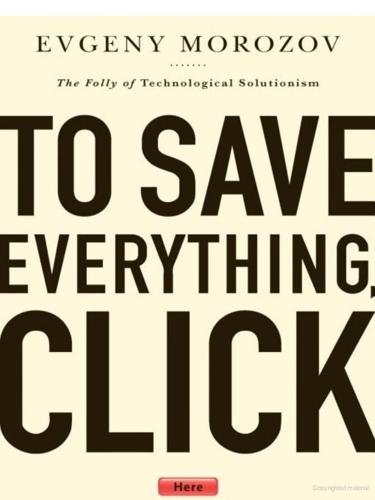
To Save Everything, Click Here: The Folly of Technological Solutionism
by
Evgeny Morozov
Published 15 Nov 2013
The infrastructure and design of this network of networks do play a certain role in sanctioning many of these myths—for example, the idea that “the Internet” is resistant to censorship comes from the unique qualities of its packet-switching communication mechanism—but “the Internet” that is the bane of public debates also contains many other stories and narratives—about innovation, surveillance, capitalism—that have little to do with the infrastructure per se. French philosopher Bruno Latour, writing of Louis Pasteur’s famed scientific accomplishments, distinguished between Pasteur, the actual historical figure, and “Pasteur,” the mythical almighty character who has come to represent the work of other scientists and entire social movements, like the hygienists, who, for their own pragmatic reasons, embraced Pasteur with open arms.

The Aristocracy of Talent: How Meritocracy Made the Modern World
by
Adrian Wooldridge
Published 2 Jun 2021
Oliver Goldsmith’s most famous lines, in The Deserted Village (1770), seem to hang over today’s meritocratic-plutocratic mix: ‘Ill fares the land, to hastening ills a prey/Where wealth accumulates, and men decay.’ Too many people see the cognitive elite as exemplars of incompetence and self-dealing rather than expertise and problem-solving. Financiers rig the financial system for their own benefit. Technologists are building ‘surveillance capitalism’. Politicians earn millions cashing in on their public service. Many members of the elite themselves suffer from the demoralized view of success. Towards the end of his career, Clayton Christensen, a leading professor at Harvard Business School became so worried about the number of his pupils who had ended up divorced, miserable or in prison that he co-authored (with James Allworth and Karen Dillon) a book on How Will You Measure Your Life?

Rentier Capitalism: Who Owns the Economy, and Who Pays for It?
by
Brett Christophers
Published 17 Nov 2020
One zettabyte = 1 trillion gigabytes, or 1021 bytes. IDC, ‘The Digital Universe of Opportunities: Rich Data and the Increasing Value of the Internet of Things’, April 2014, at emc.com. 17. Lanchester, ‘You Are the Product’. On the surveillance business of contemporary digital capitalism more broadly, see S. Zuboff, The Age of Surveillance Capitalism (London: Profile, 2019). 18. ‘Datafication’ is the term used by Jathan Sadowski in his ‘When Data Is Capital: Datafication, Accumulation, and Extraction’, Big Data & Society, doi: 10.1177/2053951718820549. 19. Economist, ‘Data Is Giving Rise to a New Economy’, 6 May 2017. 20. K. Granville, ‘Facebook and Cambridge Analytica: What You Need to Know as Fallout Widens’, New York Times, 19 March 2018. 21.

Slouching Towards Utopia: An Economic History of the Twentieth Century
by
J. Bradford Delong
Published 6 Apr 2020
The only place where confidence in the future was strong was among the cadres of the Chinese Communist Party, who saw themselves leading humanity forward holding high the banner of Socialism with Chinese Characteristics and guided by Mao Zedong–Deng Xiaoping–Xi Jinping Thought. But to all outside, that seemed more like corrupt authoritarian state surveillance capitalism with Chinese characteristics (although paying lip service, and perhaps someday more, to egalitarian-utopian “common prosperity” aspirations). So China’s ascendance seemed to outsiders unlikely to promise forward steps on the path to utopia. Instead, it seemed to signal a return—albeit at a much higher level of general prosperity—to history’s Wheel of Fortune, to a cycle of rulers and ruled, the strong grabbing what they wished and the weak suffering what they must.

The Anarchy: The Relentless Rise of the East India Company
by
William Dalrymple
Published 9 Sep 2019
For as recent American adventures in Iraq have shown, our world is far from post-imperial, and quite probably never will be. Instead Empire is transforming itself into forms of global power that use campaign contributions and commercial lobbying, multinational finance systems and global markets, corporate influence and the predictive data harvesting of the new surveillance-capitalism rather than – or sometimes alongside – overt military conquest, occupation or direct economic domination to effect its ends. Four hundred and twenty years after its founding, the story of the East India Company has never been more current. Glossary Aftab the Sun Akhbars Indian court newsletters Alam the world.

Designing Data-Intensive Applications: The Big Ideas Behind Reliable, Scalable, and Maintainable Systems
by
Martin Kleppmann
Published 17 Apr 2017
ISBN: 978-0-393-35217-7 [97] The Grugq: “Nothing to Hide,” grugq.tumblr.com, April 15, 2016. [98] Tony Beltramelli: “Deep-Spying: Spying Using Smartwatch and Deep Learning,” Masters Thesis, IT University of Copenhagen, December 2015. Available at arxiv.org/abs/1512.05616 [99] Shoshana Zuboff: “Big Other: Surveillance Capitalism and the Prospects of an Information Civilization,” Journal of Information Technology, volume 30, number 1, pages 75–89, April 2015. doi:10.1057/jit.2015.5 [100] Carina C. Zona: “Consequences of an Insightful Algorithm,” at GOTO Berlin, November 2016. [101] Bruce Schneier: “Data Is a Toxic Asset, So Why Not Throw It Out?
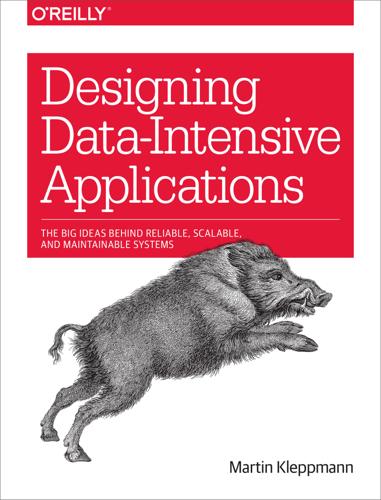
Designing Data-Intensive Applications: The Big Ideas Behind Reliable, Scalable, and Maintainable Systems
by
Martin Kleppmann
Published 16 Mar 2017
ISBN: 978-0-393-35217-7 [97] The Grugq: “Nothing to Hide,” grugq.tumblr.com, April 15, 2016. [98] Tony Beltramelli: “Deep-Spying: Spying Using Smartwatch and Deep Learning,” Masters Thesis, IT University of Copenhagen, December 2015. Available at arxiv.org/abs/1512.05616 [99] Shoshana Zuboff: “Big Other: Surveillance Capitalism and the Prospects of an Information Civilization,” Journal of Information Technology, volume 30, number 1, pages 75–89, April 2015. doi:10.1057/jit.2015.5 [100] Carina C. Zona: “Consequences of an Insightful Algorithm,” at GOTO Berlin, November 2016. [101] Bruce Schneier: “Data Is a Toxic Asset, So Why Not Throw It Out?